Hosting Quota Notifications 1.X For WHMCS
Contents
|
About CRM For WHMCS
| CRM For WHMCS is a module created to expedite the management process of potential clients. You will be able to add new contacts, define their type as a lead or a potential and create accounts directly in the addon. |
- Addon Module Features:
| ✔ Create Leads |
| ✔ Convert Contact Type |
| ✔ Send Mass Email & SMS To: |
| ✔ All Clients |
| ✔ Chosen Client Groups |
| ✔ Contacts From Chosen Campaigns |
| ✔ Assign Client Account To Contact |
| ✔ Assign Administrator To Contact |
| ✔ Assign Ticket To Contact |
| ✔ Quickly Edit Contact Details |
| ✔ Add And Manage Contact's Follow-ups |
| ✔ Add And Manage Contact's Notes |
| ✔ View, Create And Synchronize Quotes For Contact |
| ✔ View Contact Orders |
| ✔ Send Email From Template Or Custom Message - Include Files And Quote |
| ✔ Send Ticket Response |
| ✔ Upload And Manage Files From Contact Profile |
| ✔ View Announcements For Administrators |
| ✔ View Logs Concerning Contact |
| ✔ View Dashboard Containing Incoming Follow-ups |
| ✔ View Calendar With All Reminders Sorted By Type |
| ✔ View CRM Statistics And Graphs Concerning Contacts |
| ✔ Import Contacts In Chosen File Formats: CSV, XSL, XSLX and ODS |
| ✔ Export Contacts In Chosen File Formats: CSV, XSL, XSLX, ODS and PDF |
| ✔ Upon Removing, Contact Is Moved To Archive Where They Can Be Restored From If Needed |
- Follow-up Features:
| ✔ 3 Types Of Notifications: Now, On Follow-up Date, Before Follow-up Date - Both For Administrators And Clients |
| ✔ Follow-up Type - Easier Determination Of Follow-up Purpose |
| ✔ Administrator To Notify - Defines Included Administrators Per Notification Type |
| ✔ Notify Administrator via Email And SMS |
| ✔ Use Email Template Or Place Custom Message |
- Campaign Features:
| ✔ Create Campaign |
| ✔ Define Campaign Duration Time |
| ✔ Assign Leads To Campaign Using Filters |
| ✔ Manually Assign Campaign To Lead |
| ✔ Display Dashboard Per Campaign |
| ✔ Display Campaign Description Inside Of Assigned Lead Profile |
- Web Form Features:
| ✔ Allow Your Site Guests To Create New Contacts Via Web Form |
| ✔ Create Web Form |
| ✔ Define Details Of Web Form Created Contact: |
| ✔ Assign Fields To Web Form |
| ✔ Contact Type |
| ✔ Contact Status |
| ✔ Assigned Admin |
| ✔ Get Generated Web Form To Be Placed On Your Site |
| ✔ View Number Of Contacts Created From Each Web Form |
- Addon Settings Features:
| ✔ View Module Status - Contains Status Of CRM Key Elements |
| ✔ Define Whether To Use Quotes And Administrator Assignment |
| ✔ Define Follow-up Types And Default Notifications On Follow-up Reschedule |
| ✔ Define Temporary And Permanent Notifications For Administrators |
| ✔ Define If Notification Needs To Be Acknowledged By Administrators |
| ✔ Manage Custom Fields: |
| ✔ Create Fields Groups |
| ✔ Create Custom Fields - Text, Textarea, Checkbox, Radio And Select |
| ✔ Add Description To Custom Field |
| ✔ Add Validators To Custom Fields |
| ✔ Define WHMCS - CRM Fields Mapping - Automatically Fill Out Form With Appropriate Values |
| ✔ Define Custom Contact Types: |
| ✔ Define Contact Type Color And Icon |
| ✔ Define Contact Type Visibility On Navigation |
| ✔ Configure Default View Of Leads And Potentials Lists - Visibility And Order In Columns |
| ✔ Define Permissions Per Administrator Role Group |
| ✔ Define Personal Settings: |
| ✔ Define Avatar |
| ✔ Define Visible Fields And Their Order For Leads, Potentials And Dashboard |
| ✔ Configure Default View Of Leads And Potentials Lists - Visibility And Order In Columns |
| ✔ Create CRM Email Templates |
| ✔ View Information About CRM Cron |
- Admin Area Features:
| ✔ WHMCS Support Tickets System - Create Lead, Quickly View Its Details And Move To CRM Contact Profile |
| ✔ WHMCS Quotes - Quotes Created From CRM Profile Are Assigned To Contact Automatically |
- General Info:
| ✔ Integrated With Asterisk VoIP Center For WHMCS - Call Your Clients At Any Time (read more) |
| ✔ Integrated With Quotes Automation For WHMCS - Extend Your Quotes Possibilities (read more) |
| ✔ Integrated With SMS Center For WHMCS - Send Reminders & Mass Messages via SMS (read more) |
| ✔ Connect With CRM Using Its API |
| ✔ Migration Tool - Migrate Leads/Potentials And Settings From CRM For WHMCS 1.2.4 |
| ✔ Toggle Standalone Mode - Display CRM Outside Of WHMCS |
| ✔ Display Any Page Or Panel In Full Screen Mode |
| ✔ Multi-Language Support |
| ✔ Supports PHP 5.5.9 Up To PHP 7 |
| ✔ Supports WHMCS V6 and V7 |
Installation
| This tutorial will show you how to successfully install and configure CRM For WHMCS. We will guide you step by step through the whole installation and configuration process. |
Installation
| 1. Log in to your client area and download the module. |
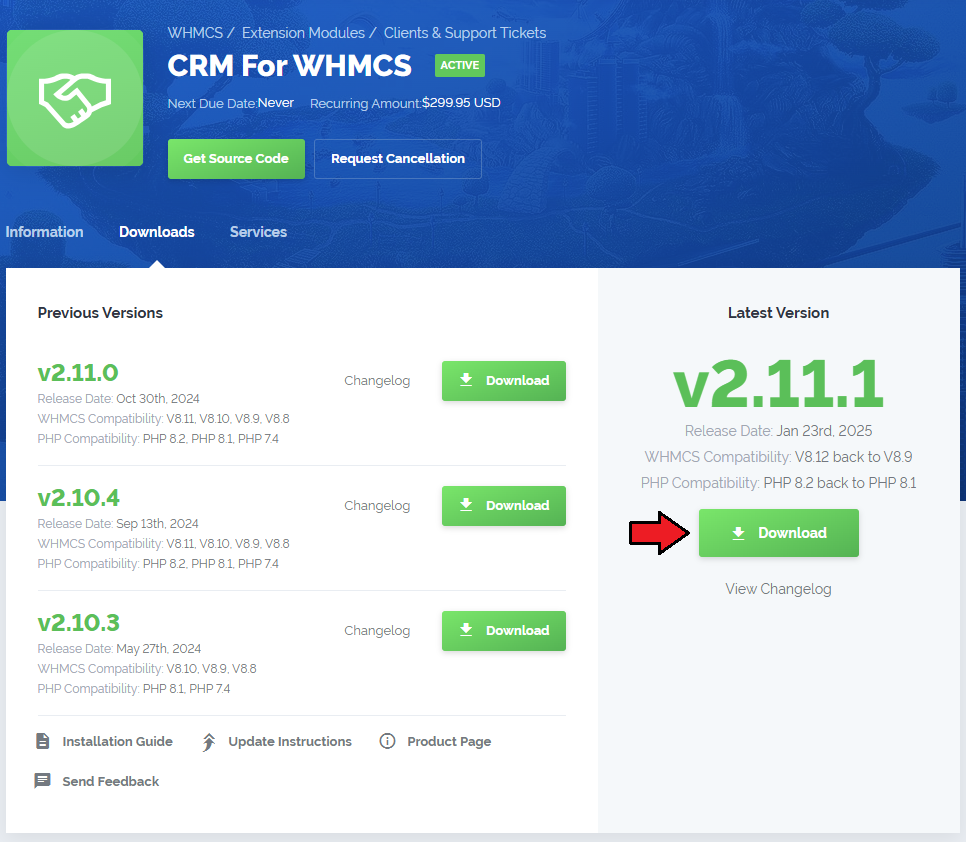
|
| 2. In the downloaded file you will find two packages that support different PHP versions. As presented on the screen below, the first one is dedicated to PHP 5.5.9, while the second one is aimed at PHP 7. It does not apply to open source versions. Note: You can check current PHP version in your WHMCS. To do so proceed to 'Utilities' → 'System' → 'PHP Info'. |

|
| 3. Extract the downloaded file and choose the one with the right PHP version. Upload and extract the PHP file into the main WHMCS directory. The content of PHP version files should look like this. |

|
| 4. When you install CRM For WHMCS for the first time you have to rename 'license_RENAME.php' file. File is located in 'modules/addons/mgCRM/license_RENAME.php'. Rename it from 'license_RENAME.php' to 'license.php'. |
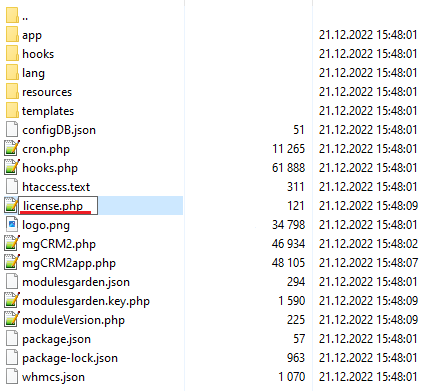
|
| 5. In order to configure your license key, you have to edit the previously renamed 'license.php' file. Enter your license key between quotation marks as presented on the following screen. You can find your license key in your client area → 'My Products'. |

|
| 6. The next step is setting up 'Storage' folder as writable. It is located in 'your_whmcs/modules/addons/mgCRM2/app/'. |
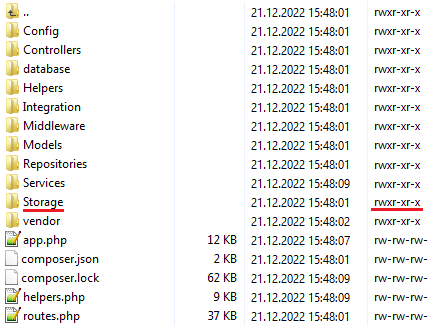
|
Activate The Addon
| 7. Now you have to activate the module in your WHMCS system. Log in to your WHMCS admin area. Go to 'Setup' → 'Addon Modules'. Afterwards, find 'CRM' and press 'Activate' button. |
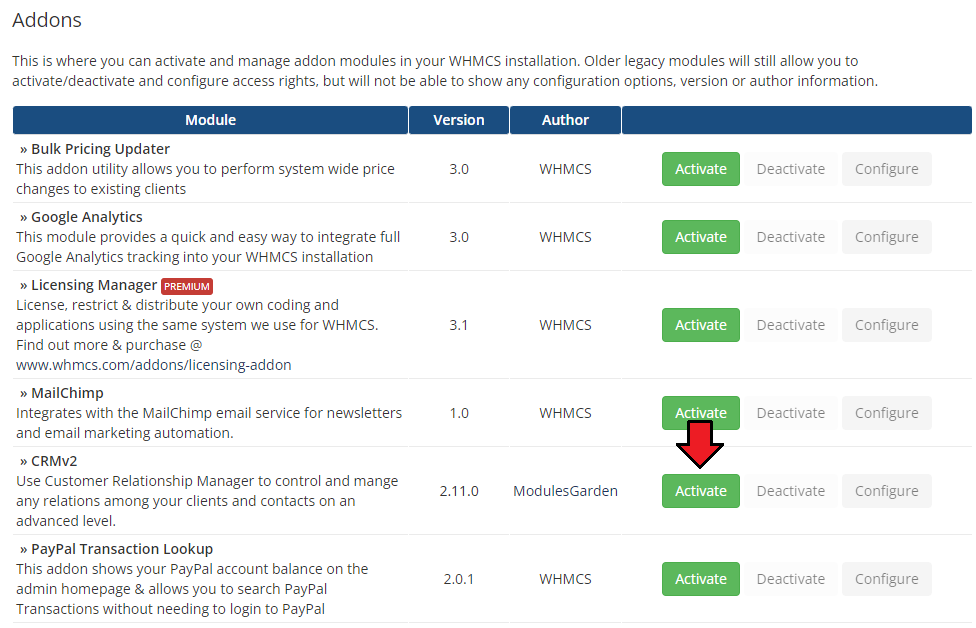
|
| 8. In the next step you need to permit access to this module. To do so, click on 'Configure' button, tick checkboxes to assign desired admin roles. |
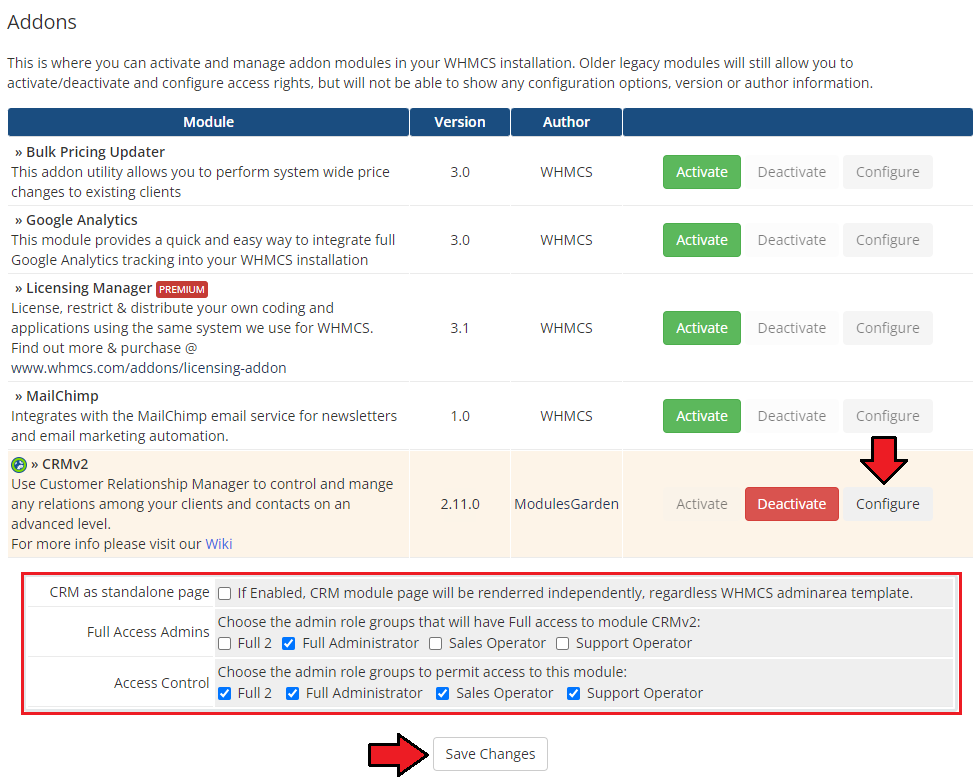
|
| 9. Now, you have to set up a cron job, which can be found in CRM Addon → 'Settings' → 'General' → 'System Overview'. We advise to set up the cron as frequently as possible to send email notifications, 5 minutes interval is recommended. |
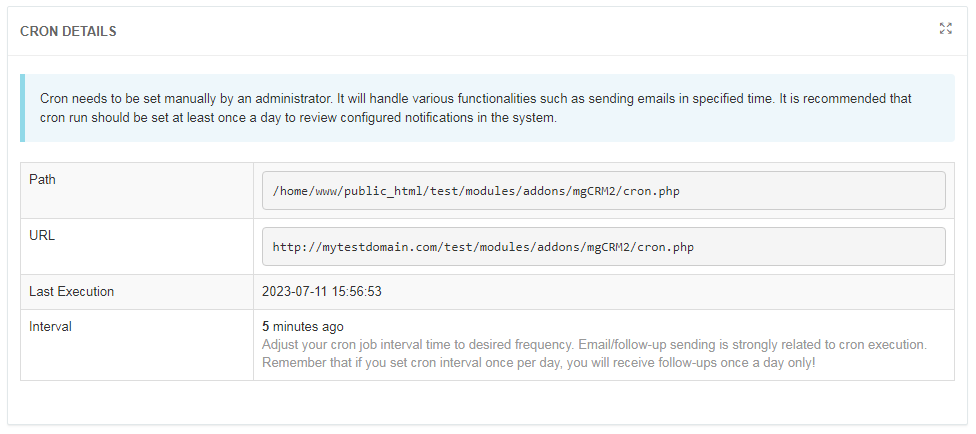
|
| 10. You have just successfully installed CRM For WHMCS! You can access your module in 'Addons' → 'CRM'. |
Configuration and Management
| CRM For WHMCS is a module which allows you and your staff to manage relations with your current as well as possible clients in one place. |
Dashboard
| When you proceed to 'Addons' → 'CRMv2', you are automatically moved to the application dashboard.
From there you have a quick preview of the most important information in your CRM. |
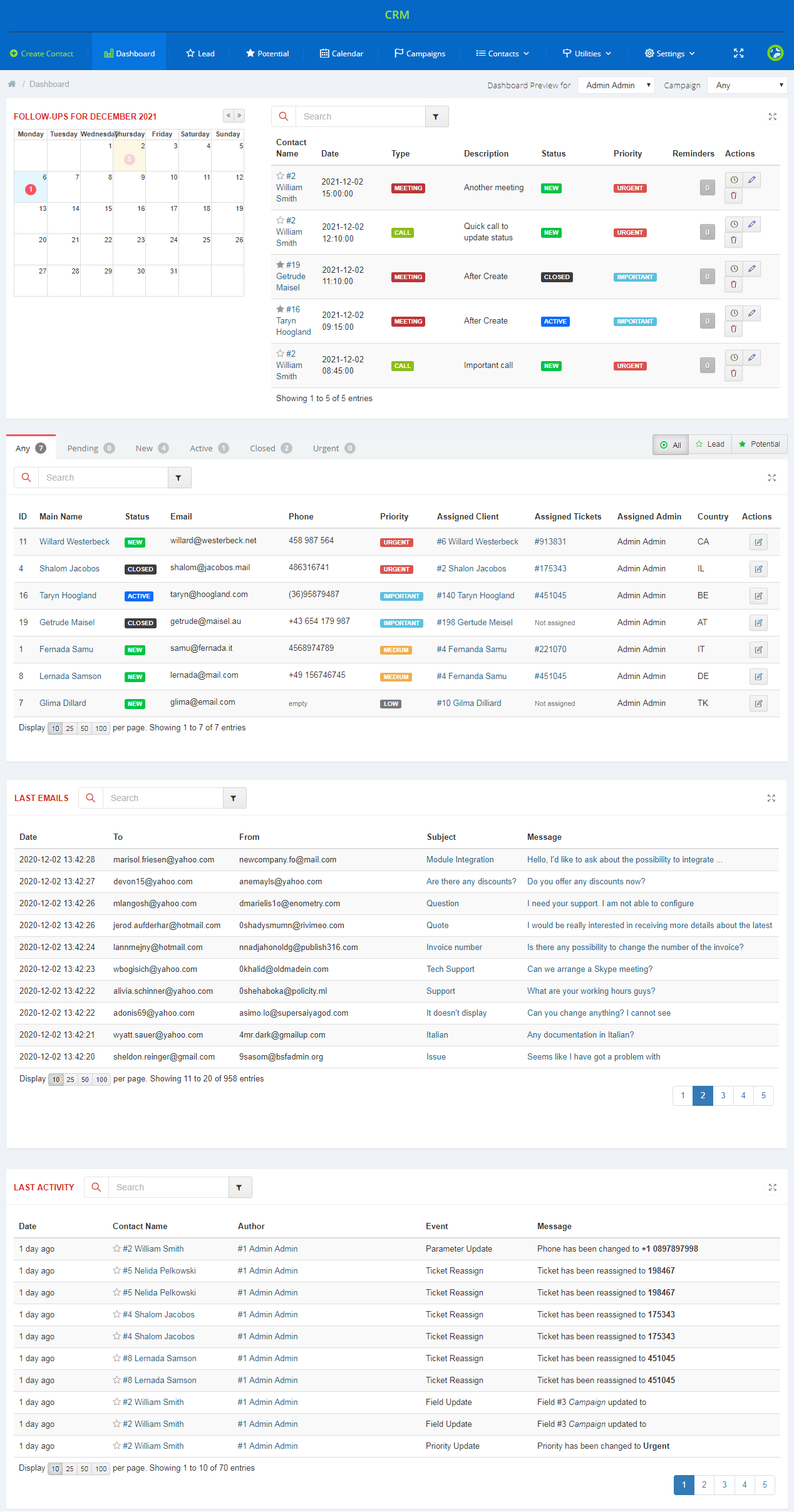
|
| It is possible to adjust the dashboard view according to applied filters. Choose dashboard view of CRM for a selected administrator. Select '--Any' if you want to show all content. Additionally, you may impose campaign filters. Choose which campaign records shall be viewed. Select '--Not Applied' to disable this filter. |
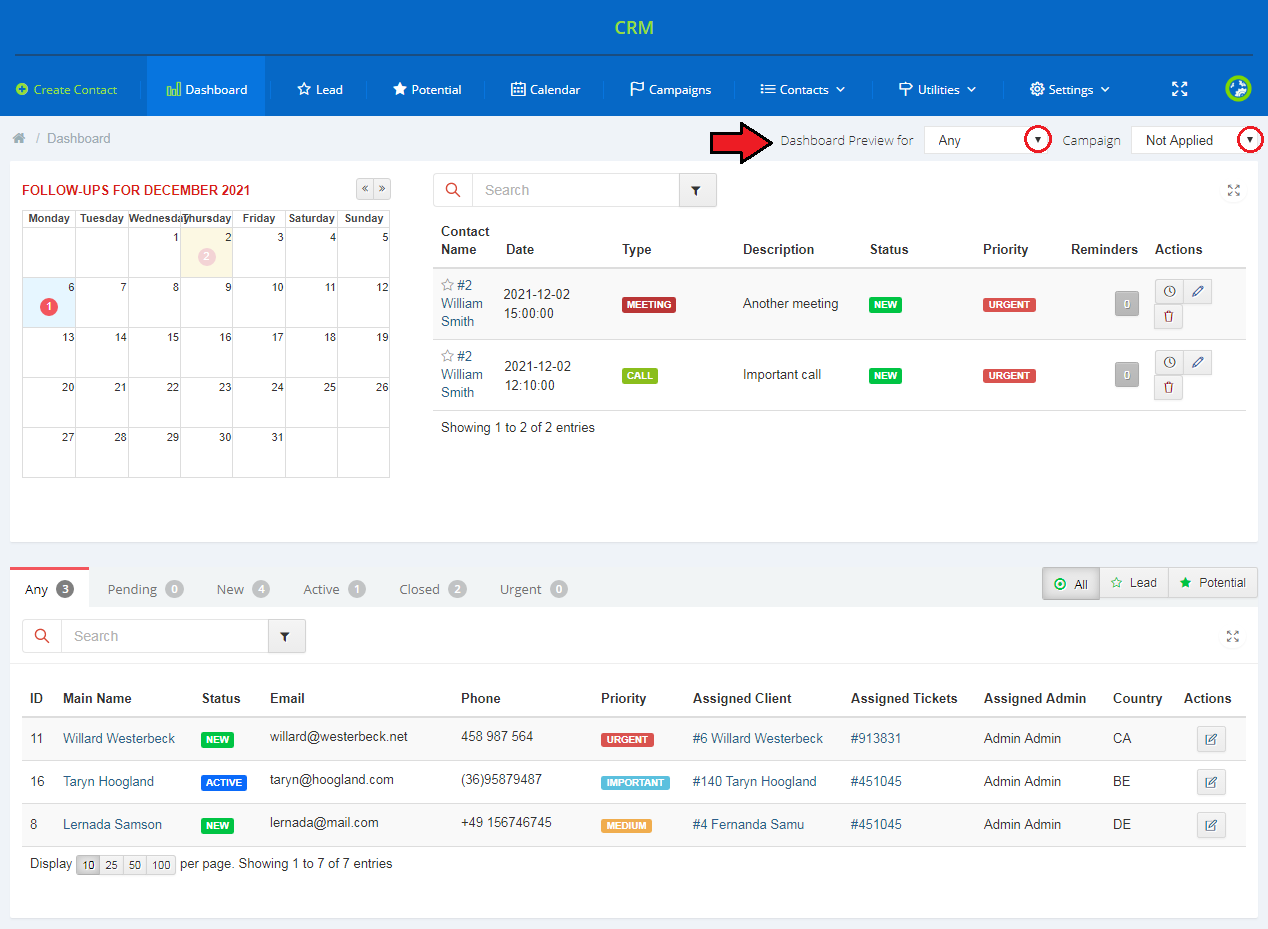
|
Standalone Mode
| Use cross arrows icon to switch into standalone mode, your CRM module pages will be then accessed outside of WHMCS. Press it again to come back to WHMCS view. |
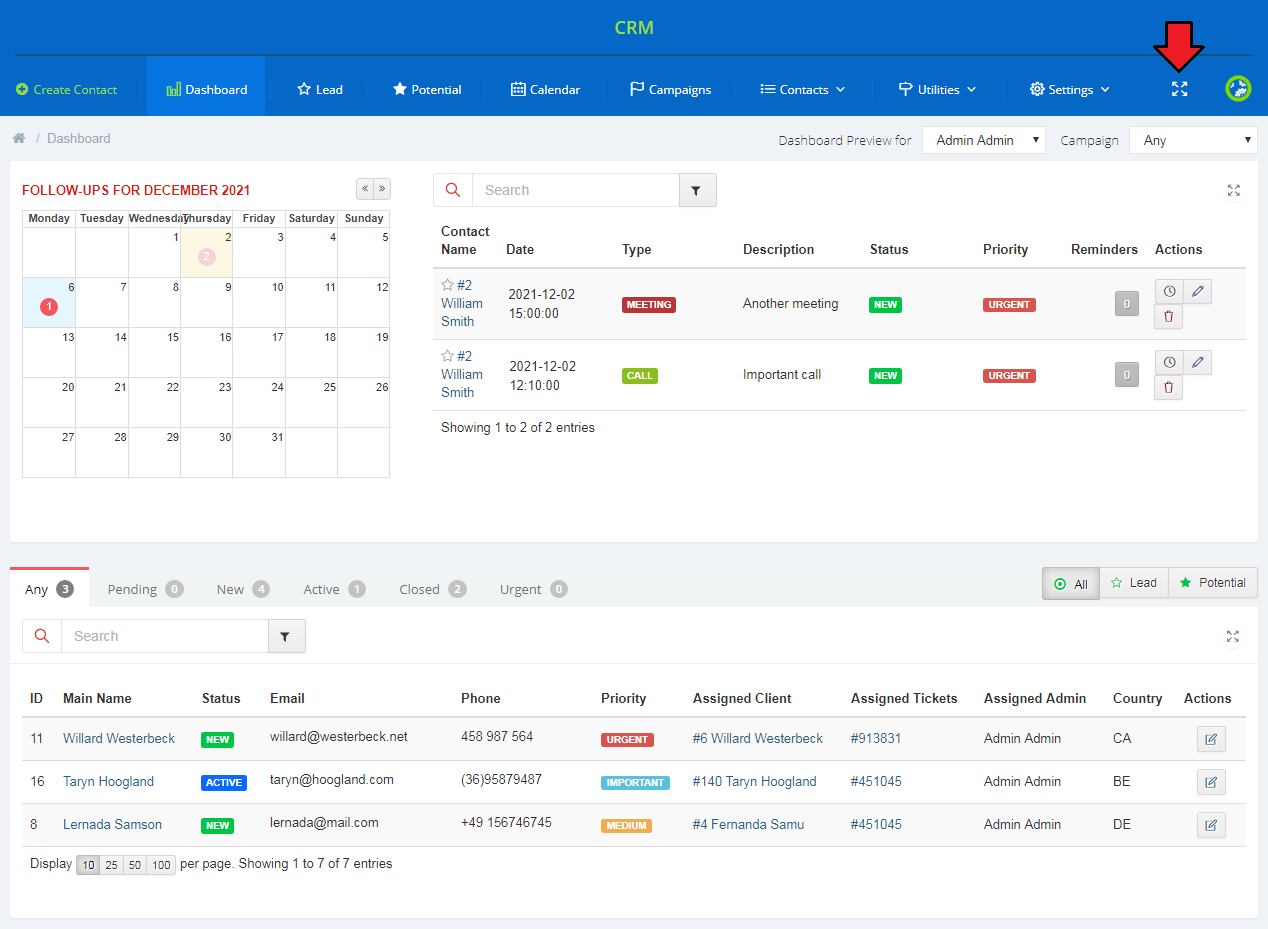
|
Contacts
Create Contact
| To create a new contact press button marked on the screen below. |
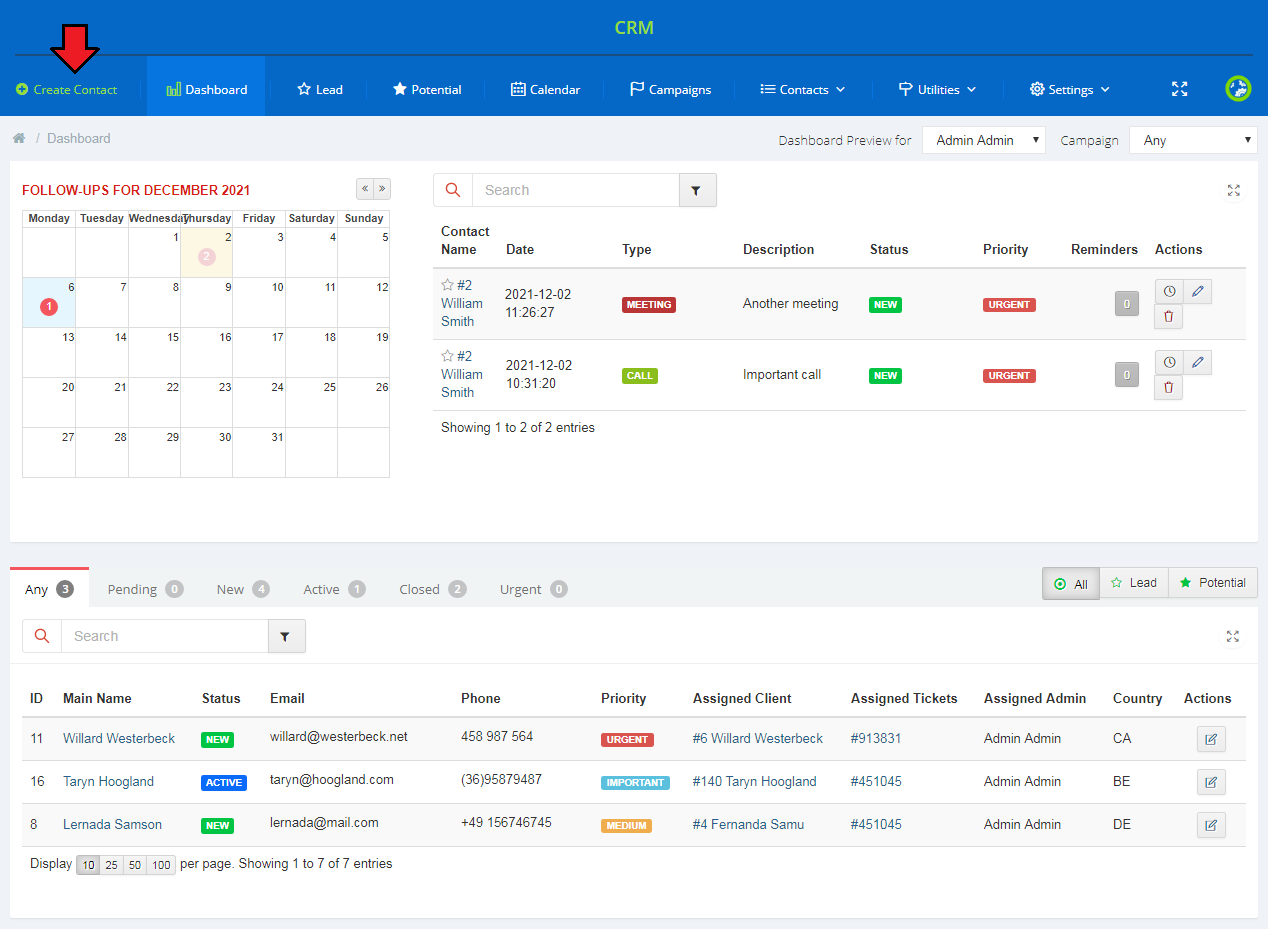
|
| You are moved to a contact creation form. As you can see below, fields are divided into two sections: Options and Information. Fill out the form and press 'Add' to add the contact to the list. There may be visible some custom fields if they have been added and enabled. Note: Only staff members with full privileges can assign admins to the contacts. |
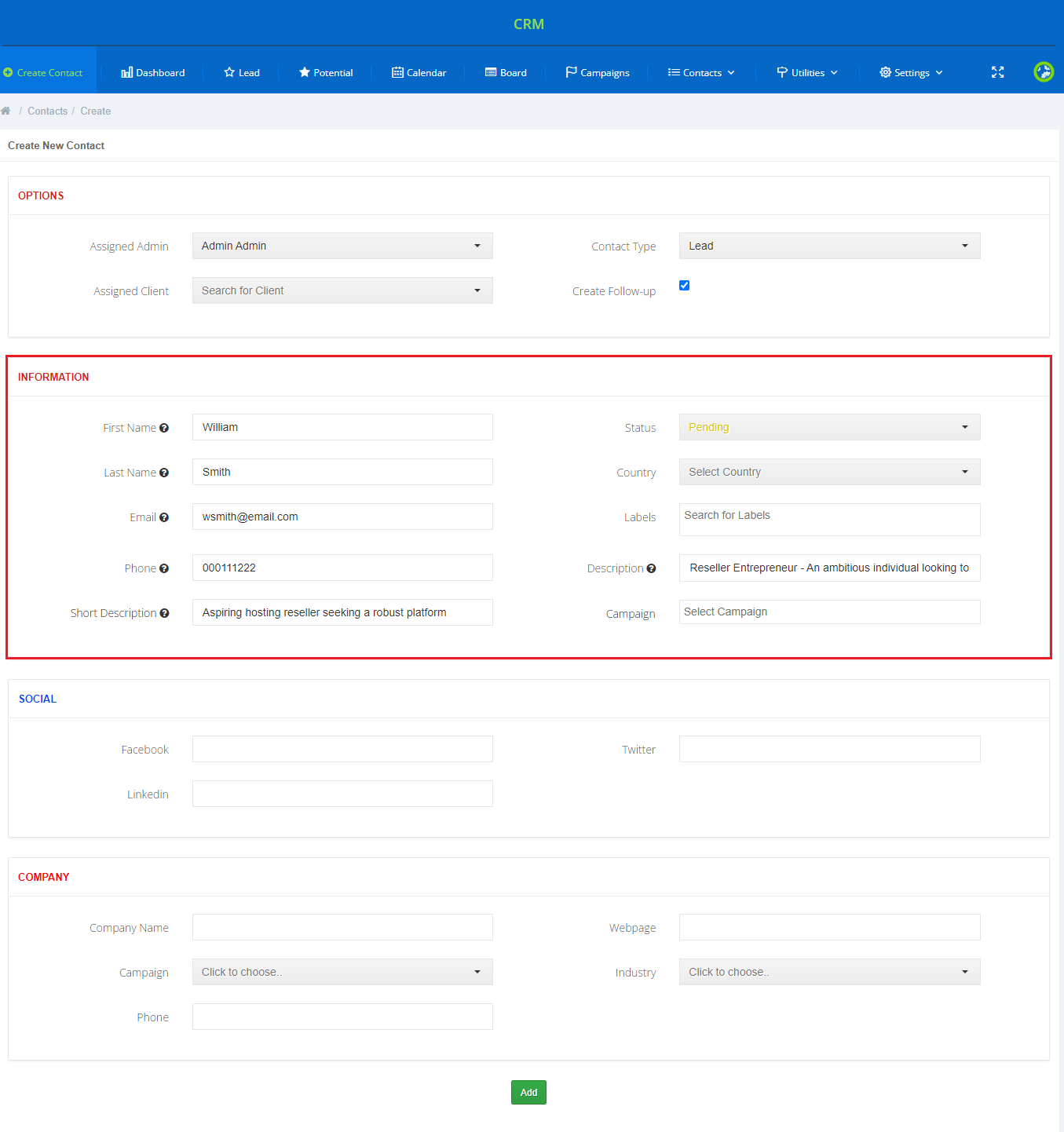
|
| Immediately, after a new contact is added you are moved to its summary, where you can find/edit some additional data. Read more about them in the following section. |
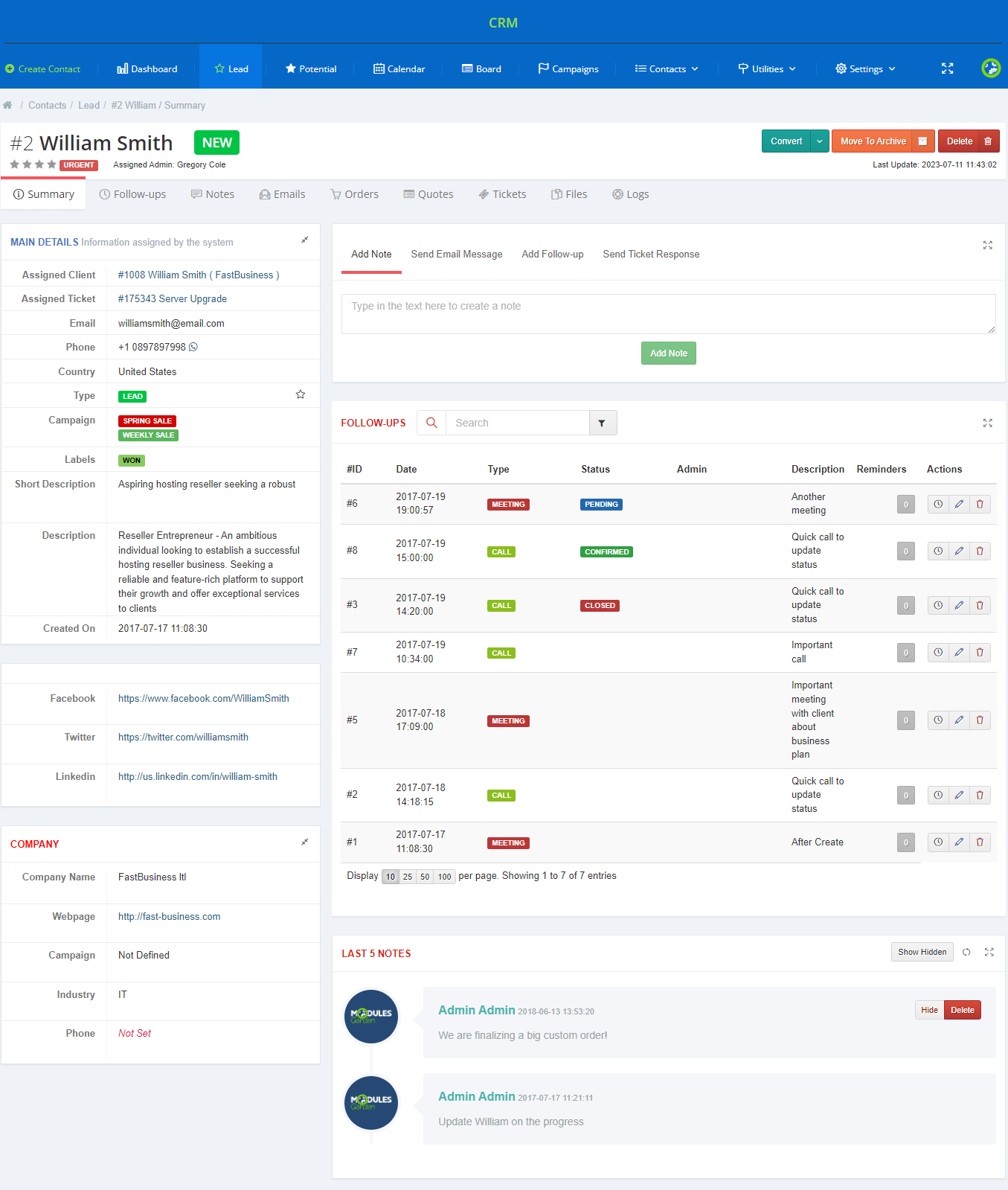
|
Manage Contacts
| In 'Actions' column you can find various useful operations which can be performed on a contact. As you can see, in dropdown menu, actions such as 'Convert To Potential' and 'Move To Archive' can be found. |
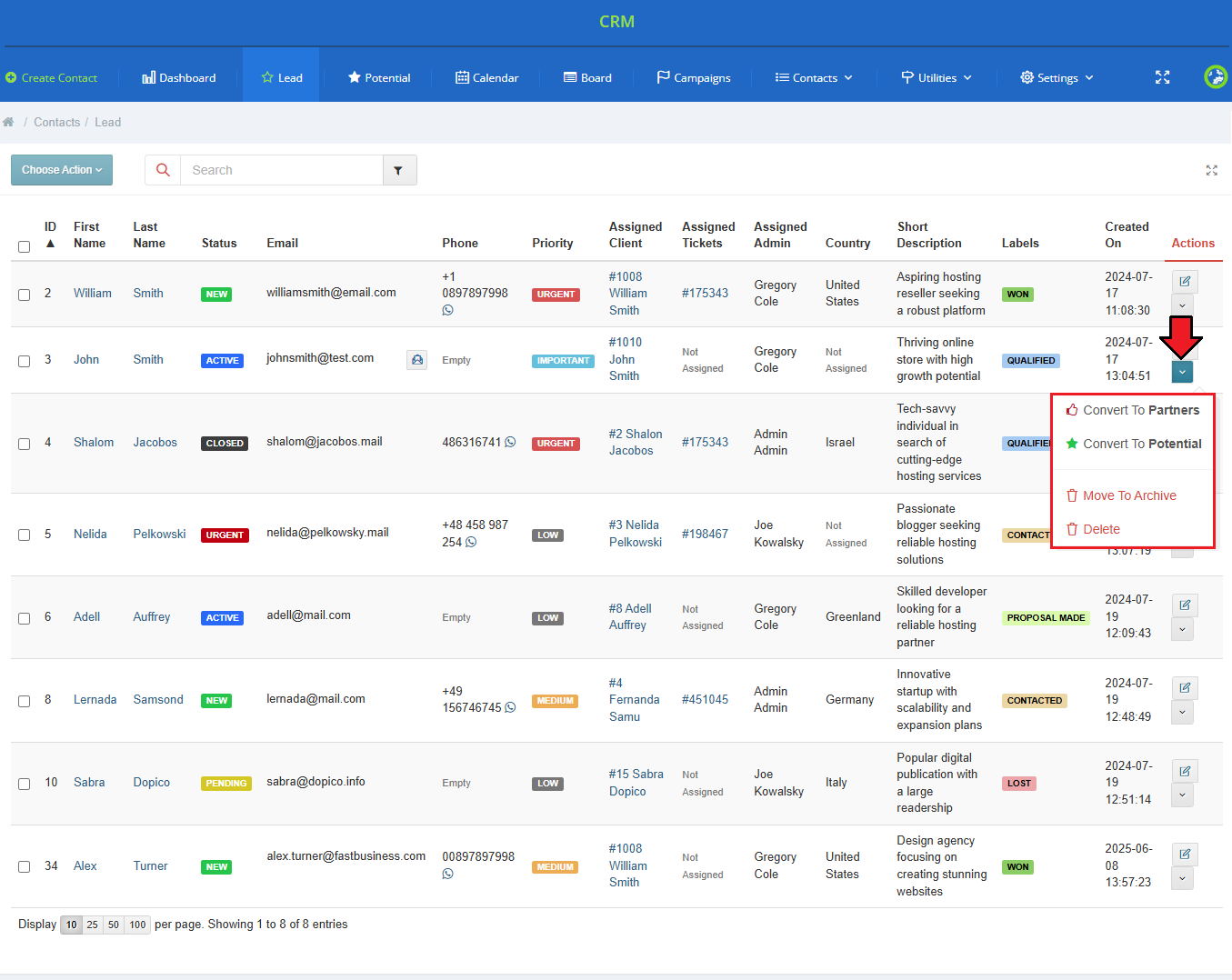
|
| Now, let's proceed to the contact itself. Press pencil icon to move to the contact's summary page. |
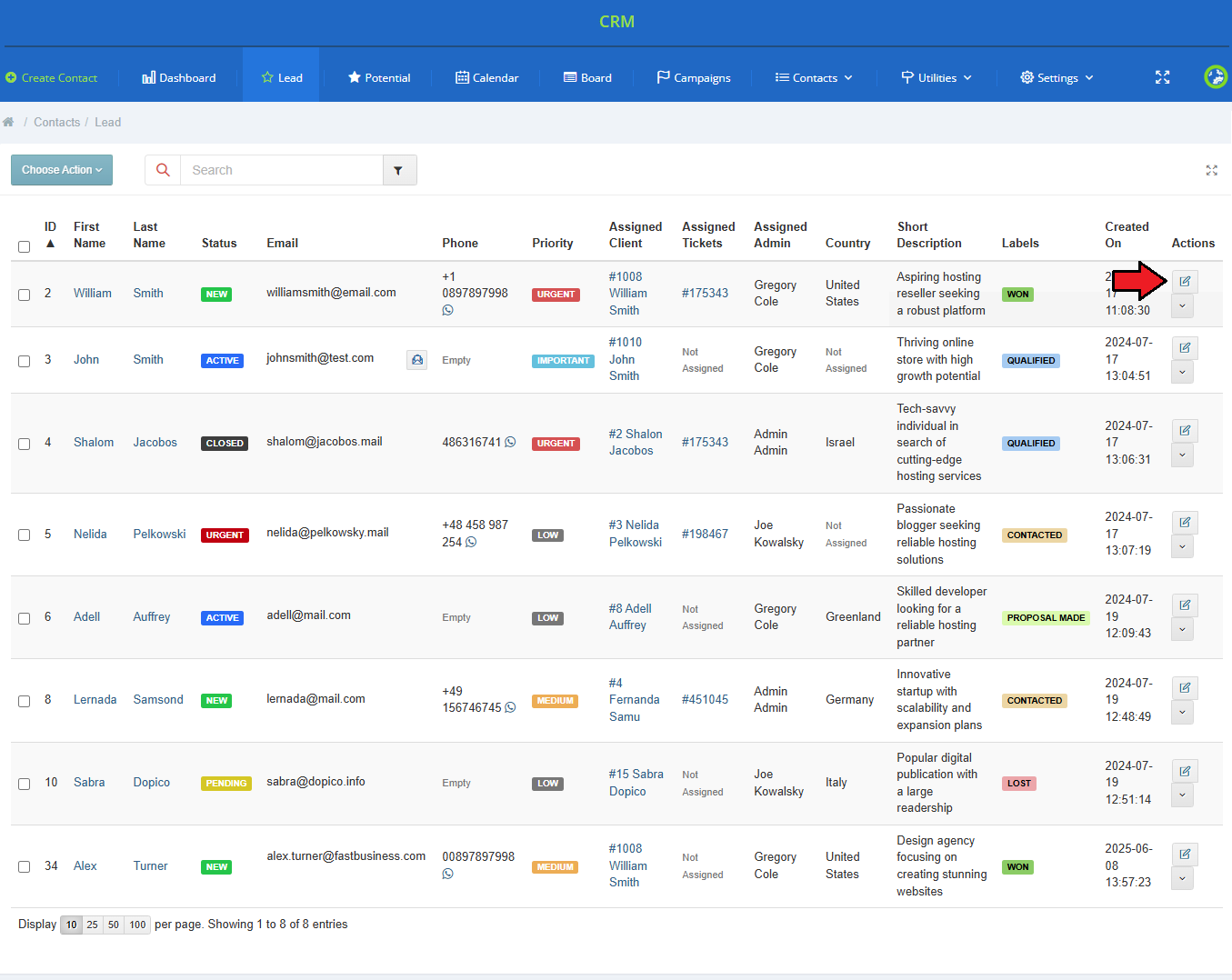
|
Summary
| To edit any of the options in the contact summary page, simply press a pencil icon that appears when you hover you mouse cursor on the option. In this way you may reassign the administrator, alter the name and change the current status. Mark appropriate number of stars to change the contacts priority:
|

|
Aa mentioned above, when you press the pencil icon, you may select current status, choose from:
Every time you are editing any information please press the green confirmation button to save the changes. |

|
| In the area marked on the following screen, you can find fields where an existing client can be assigned, ticket from which the contact was created, its basic details and campaigns if this contact belongs to any. |
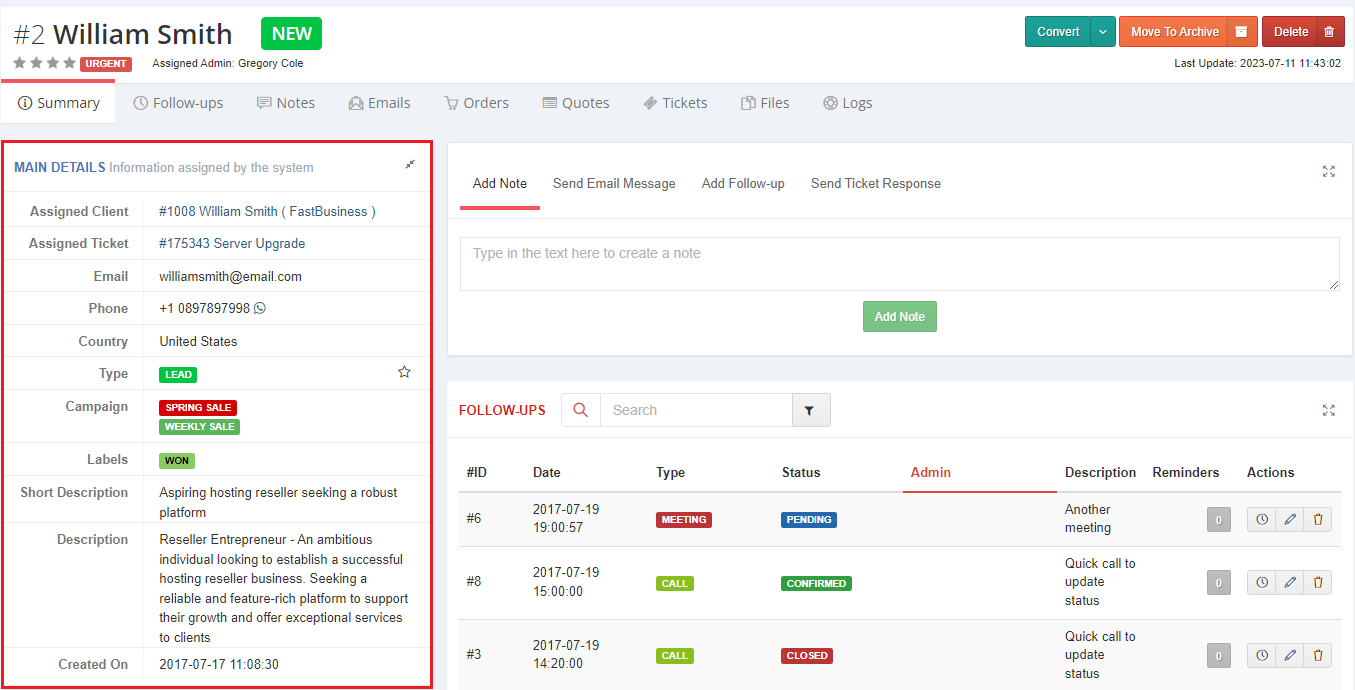
|
| Module allows assignment of a client account to the contact. This can be done in two ways, by creating a new client from a contact or by selecting an existing client to a contact. |
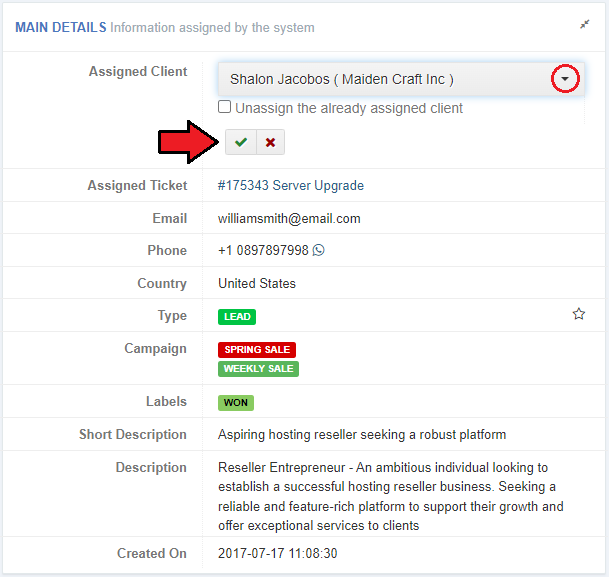
|
| In the same way you may assign a support ticket to a contact. Then, you can easily and quickly find details of the contact background. |
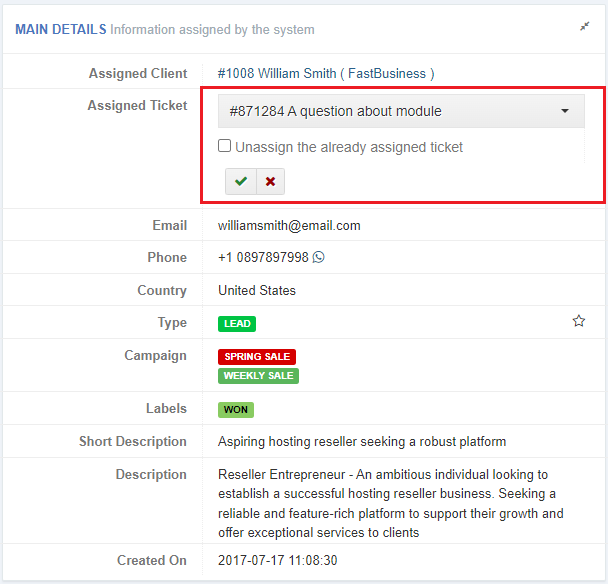
|
| When you hover over email address, two icons appear. Press the first one and you will be redirected to a section where you can send email messages from. When you decide to edit (2.), simply type in the new address. |
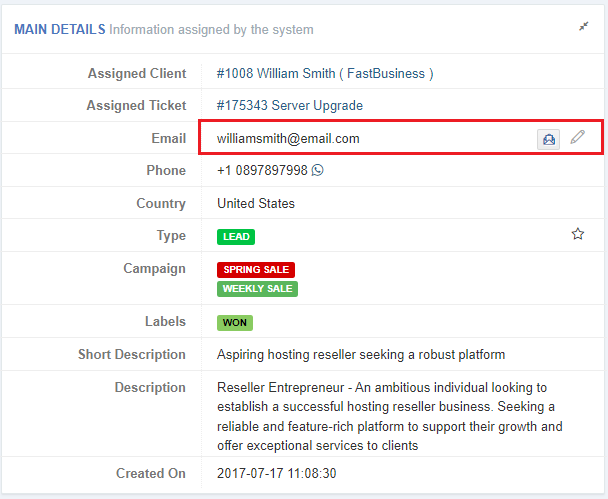
|
| Just like in case of any other option in this section, you may assign your contact to any campaign if such exists. When assigned, campaign details appear in a separate widget. |
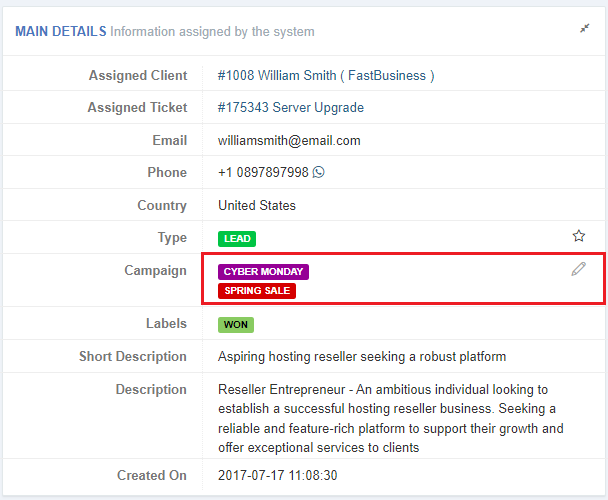
|
In 'Summary' page you may also find a brief conclusion on cerated notes, list of flow-ups and quickly do actions like:
|
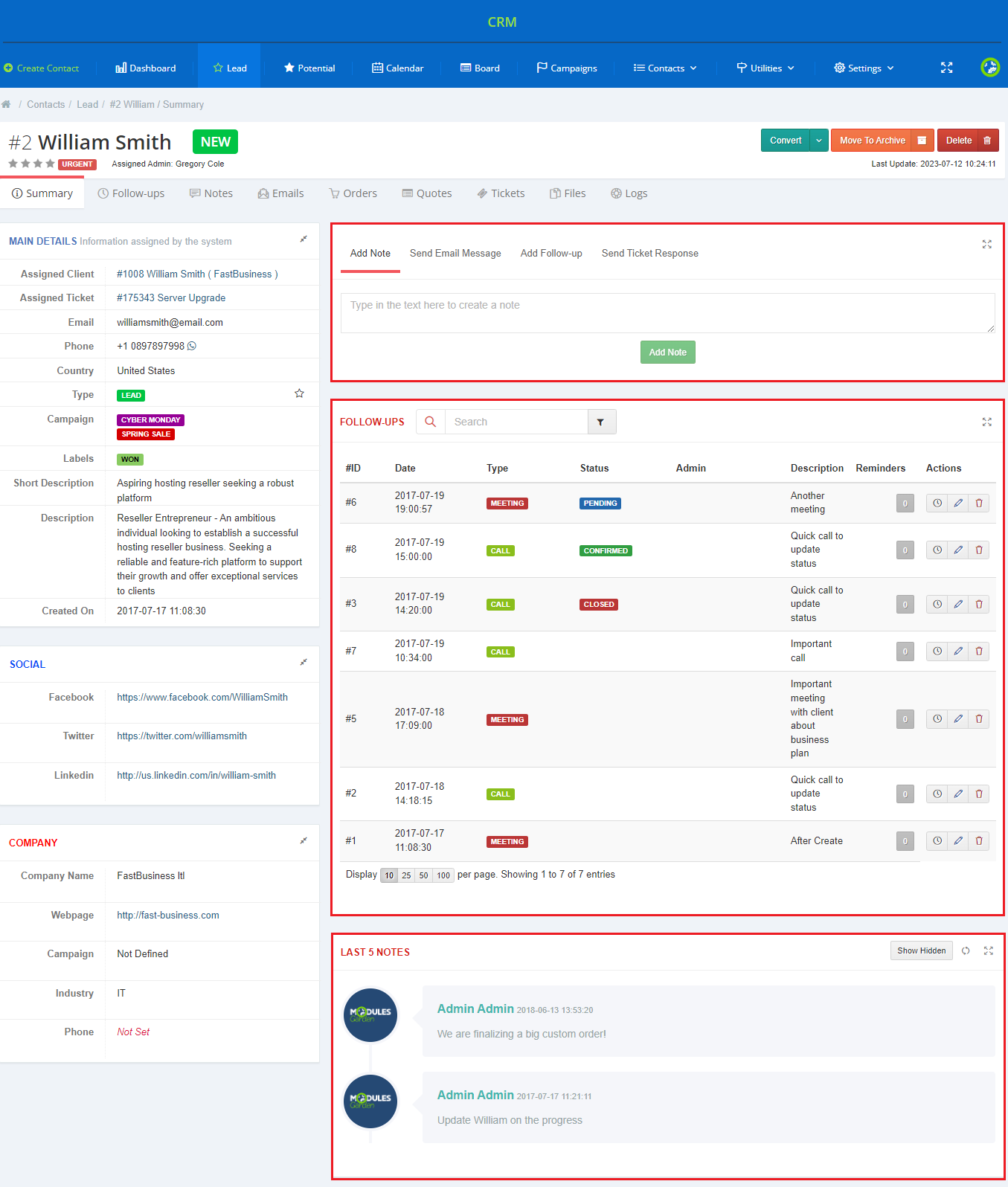
|
Follow-ups
| Follow-ups allow you to send email templates or text messages to contacts and staff members, and create ToDo entries. Any follow-up can be rescheduled (1.) or removed (2.) using buttons in the 'Actions' column. |

|
| To add a new follow-up, fill out the 'New Follow-up' form. Here you can define:
|

|
| The last step is defining reminders, we will discuss each of them below.
Reminders for Administrators
Reminders for Clients
Choose whether you wish to send reminders via email or SMS (if SMS Center for WHMCS is activated) or perhaps both. |
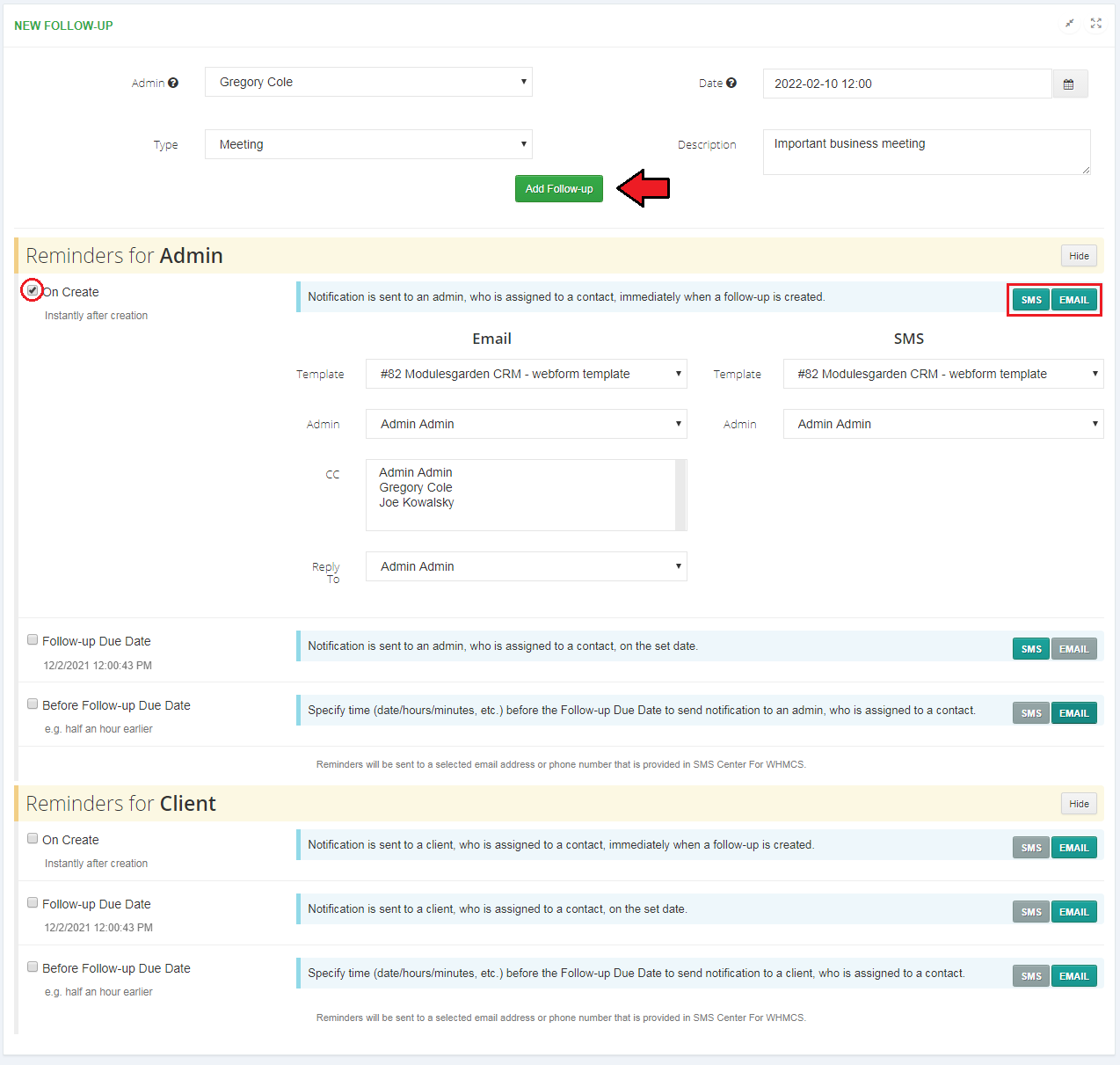
|
| Added follow-up will turn up on the list of all follow-ups of the lead. Use action buttons to delete the follow up, reschedule and edit. |
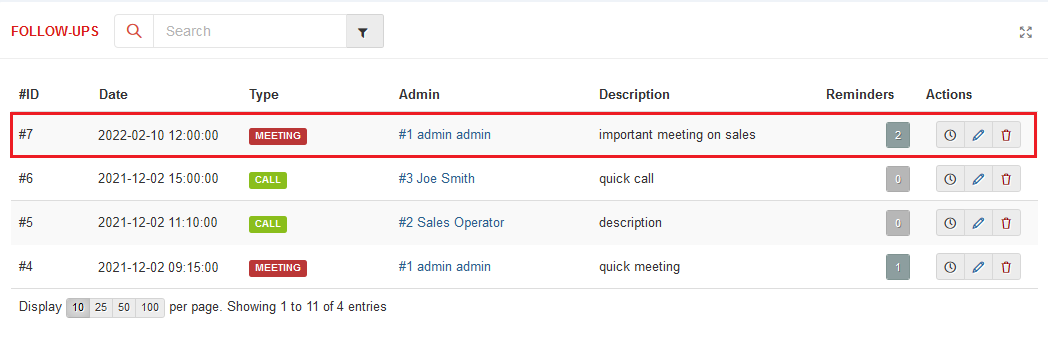
|
| In order to reschedule a follow-up you must always give the reason! |

|
Edit follow-up details:
|
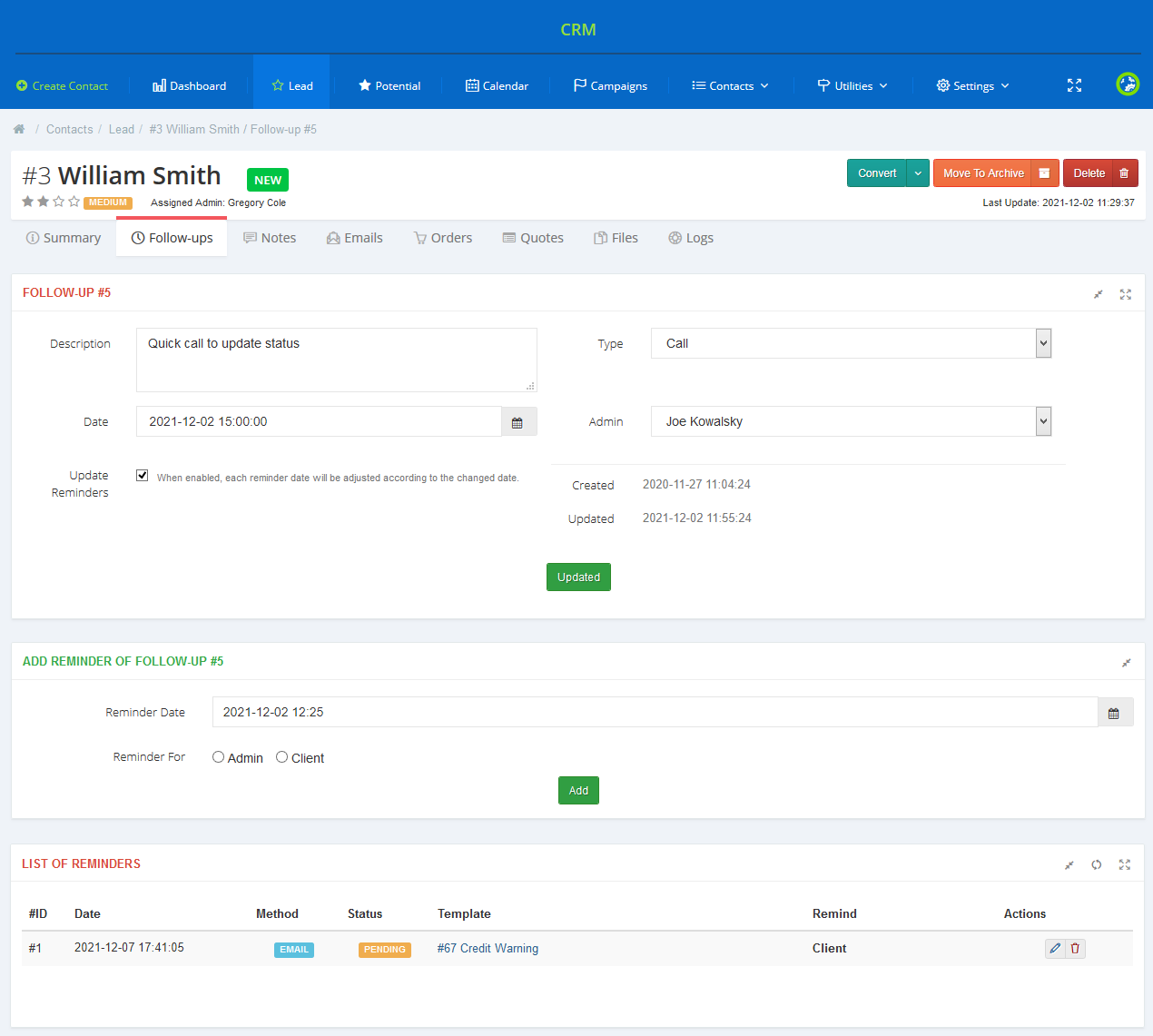
|
Notes
| 'Notes' enables you to make and manage notes about the contact. On the following screen you can see how to add an exemplary note. |
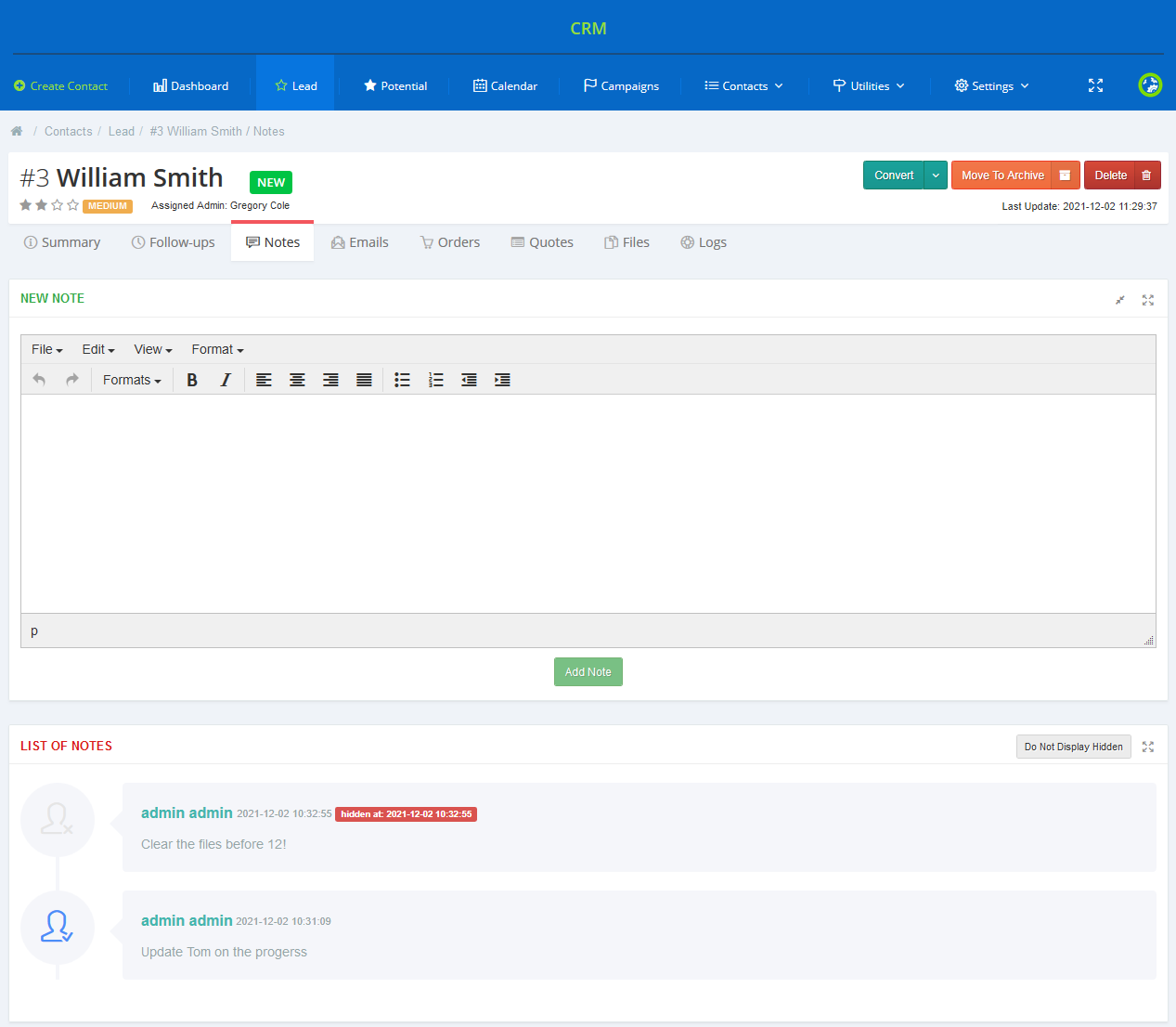
|
| Any existing note can be modified and hiden as presented below. |

|
| Please note that only hidden notes can be deleted. To show hidden notes press 'Display Hidden'. |

|
Emails
| Any staff member can send an email from the contact's profile. As you can see, you can manually fill out email subject and content. |
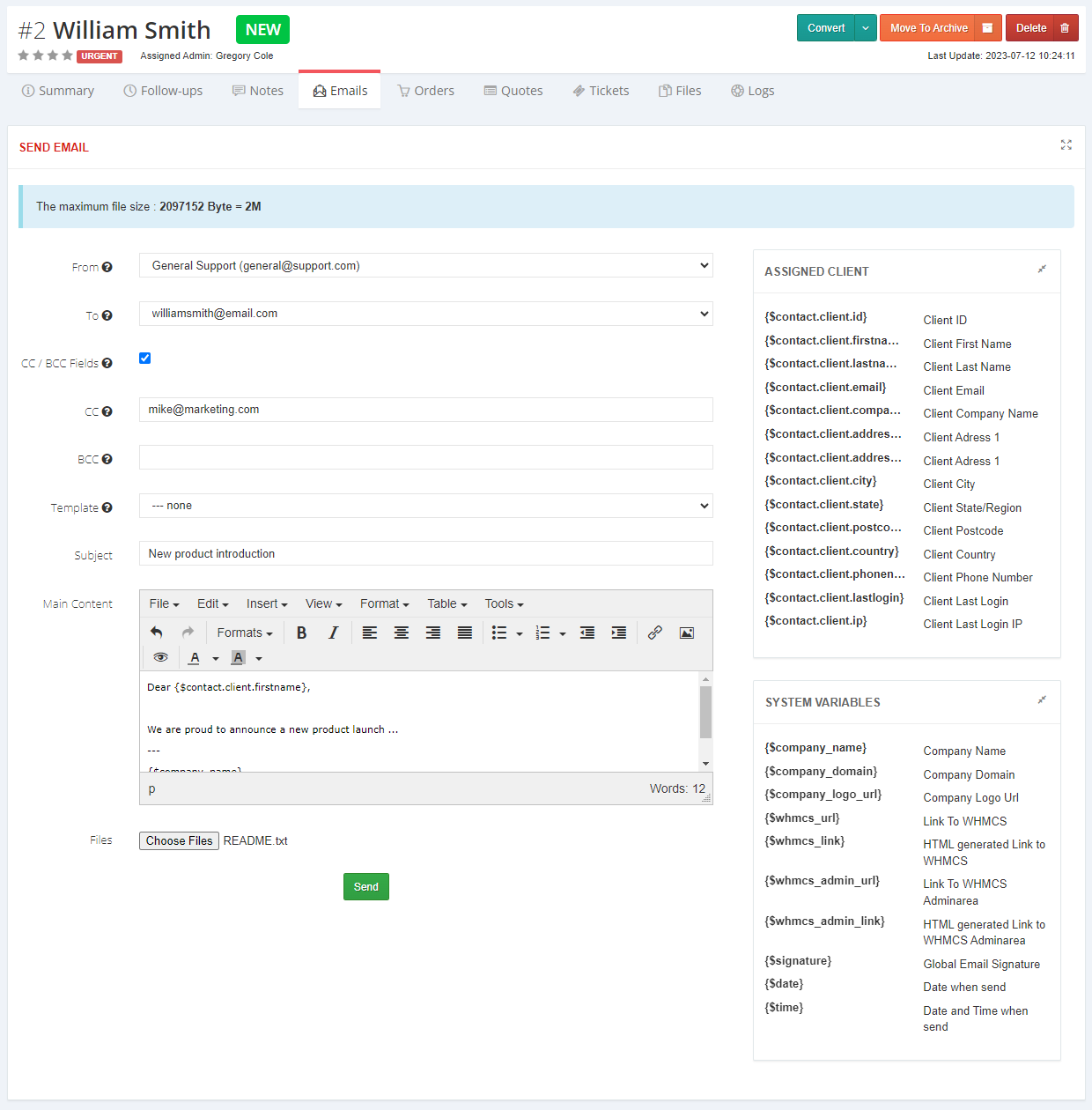
|
| Alternatively, you can choose one of email templates to send. Whatever way you choose, you can choose address to send from, as well as attach files and quotes. |
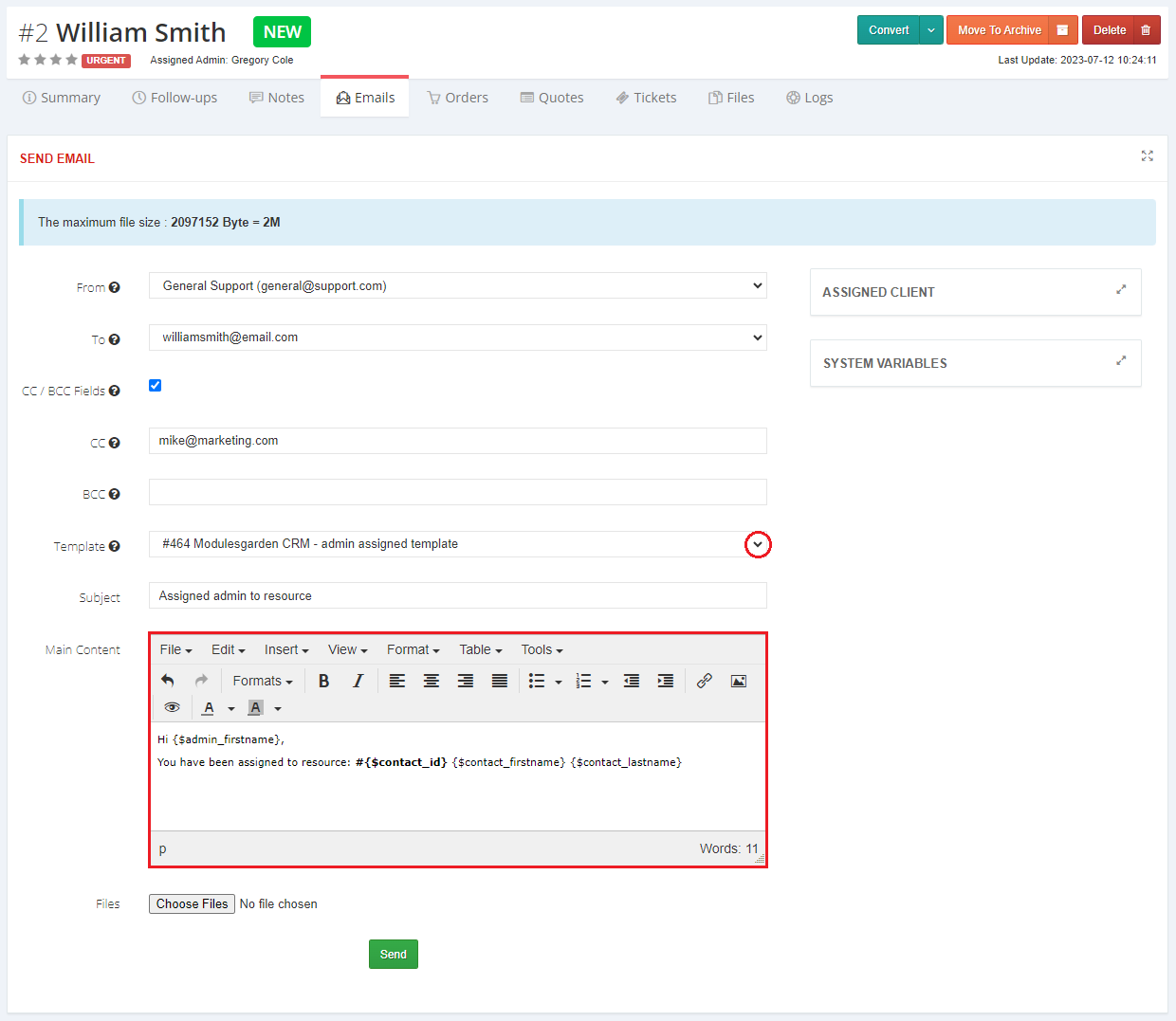
|
Orders
| Move to orders page where you can place orders for the contact. When you press 'Add New Order' and you will be redirected to your WHMCS page where order can be placed. Preview details of all orders and edit them if required. |
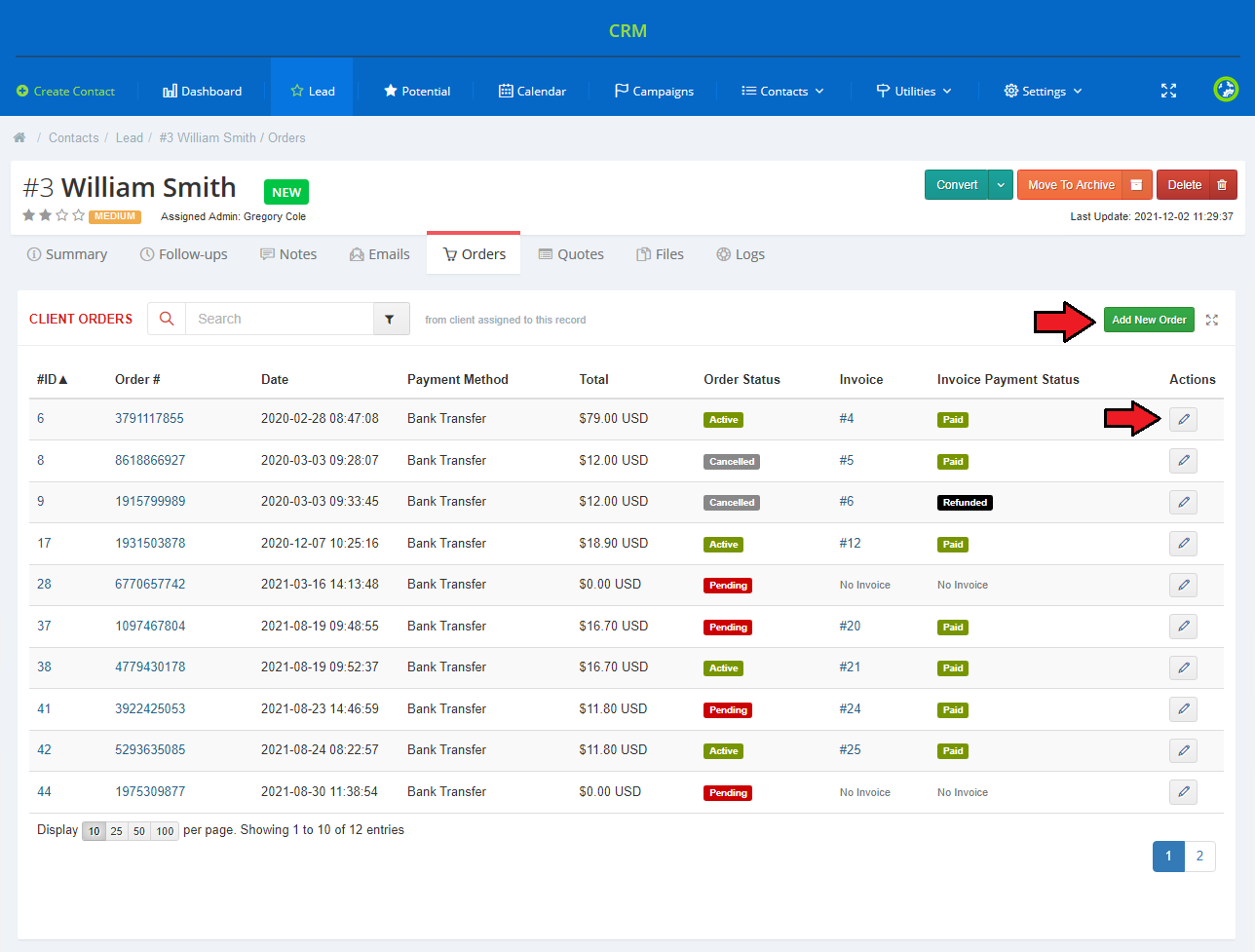
|
Quotes
| Quotes can be created for any CRM contact. As you can see on the screen below, in the 'Quotes' section of the contact page, brief information about quotes assigned to the contact is displayed. |
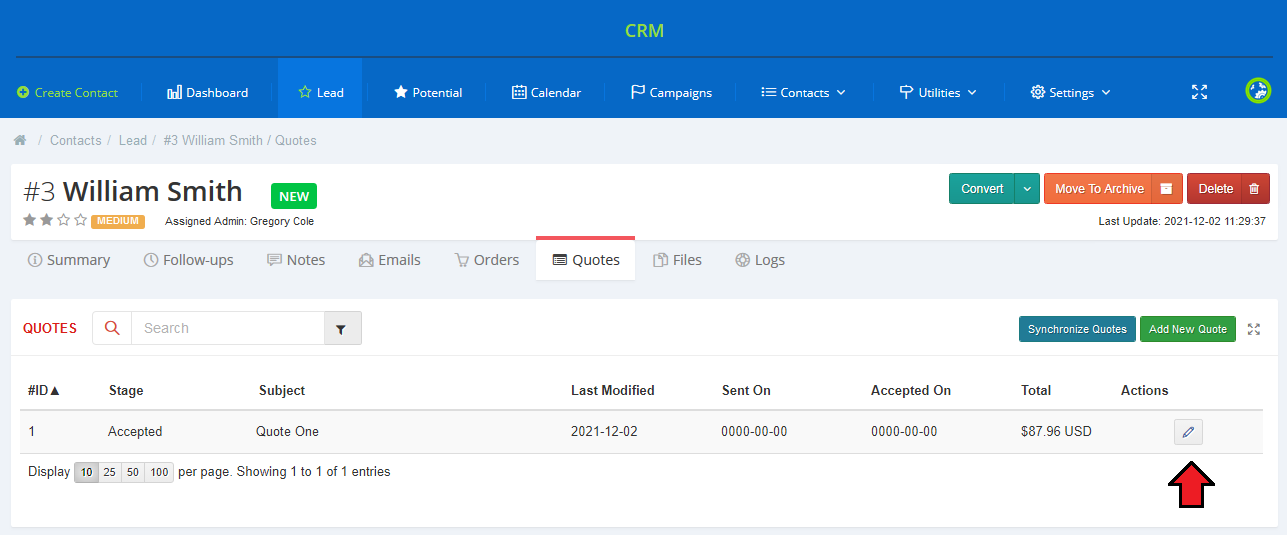
|
| You can also create a new quote for the contact, press 'Add New Quote' as shown on the following screen. |
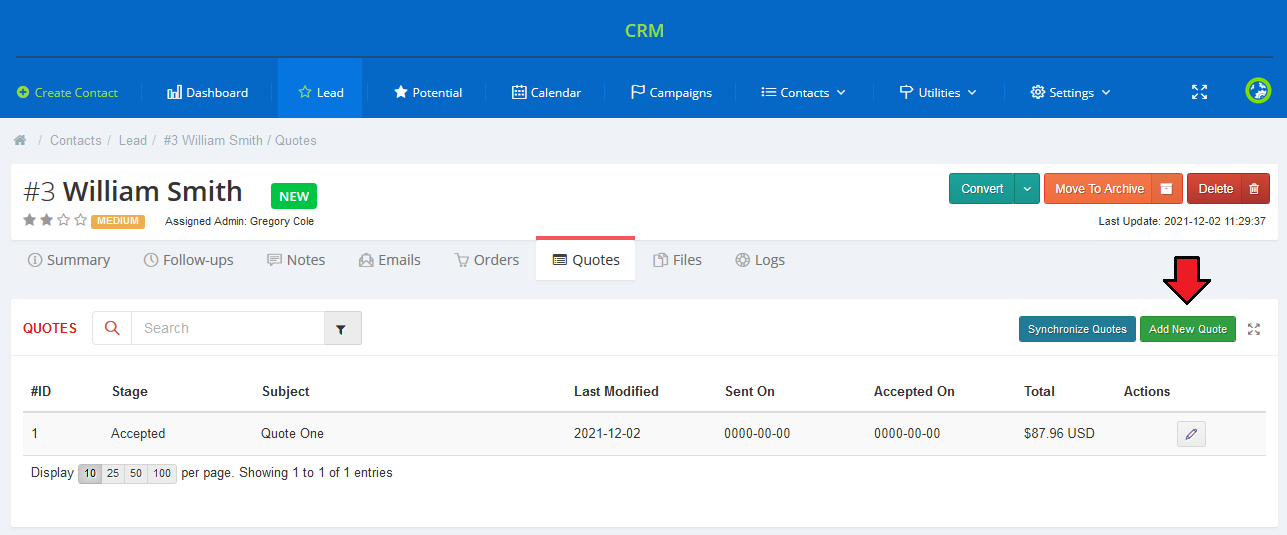
|
| Now, create a quote for your contact. You can do it in two ways, if a client is assigned to the contact, they will be automatically linked to the quote. |
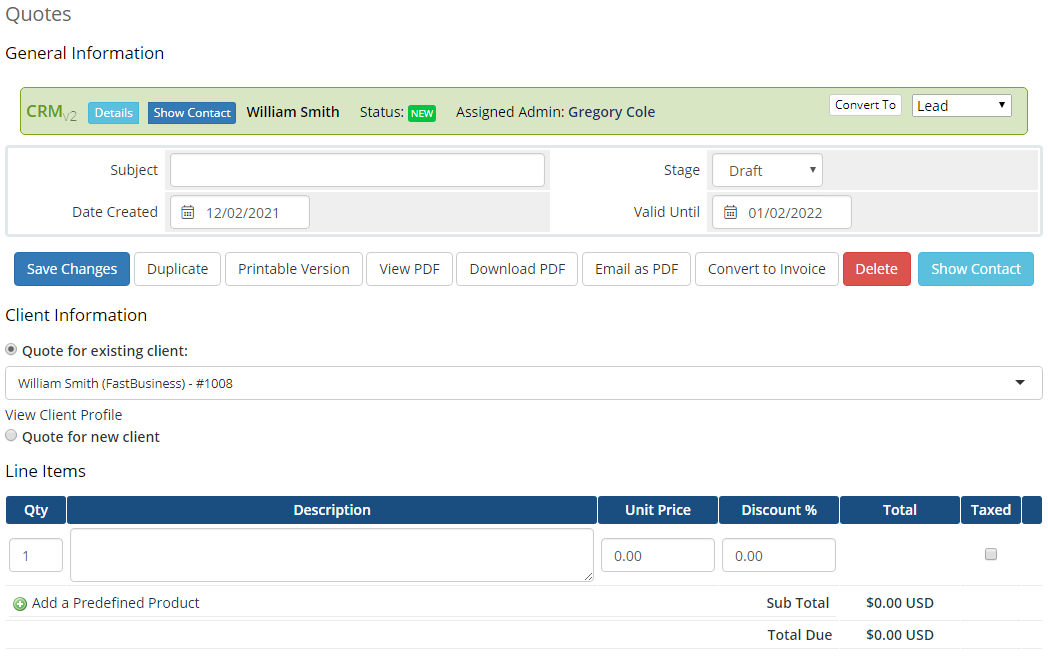
|
Tickets
| 'Tickets' tab shows all tickects created by client. If you want to create manually a new ticket for the client click 'Add New Ticket'. |
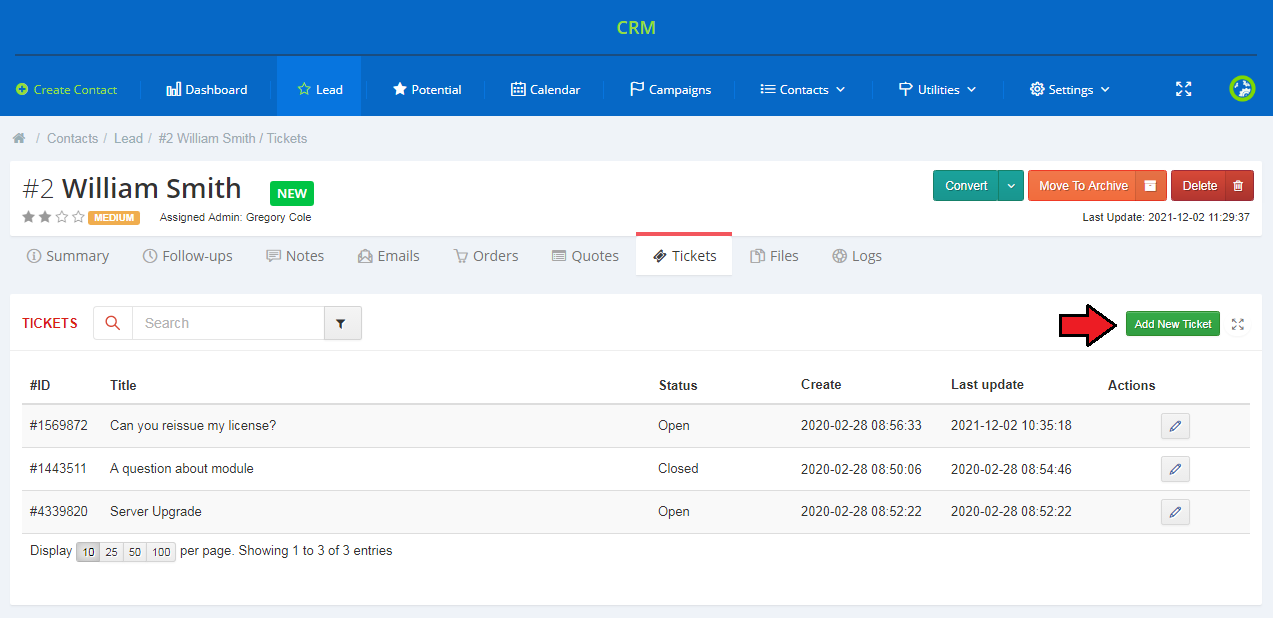
|
Files
| 'Files' tab allows you to upload and manage files related to your contact. To upload a new file, select file to upload and describe it shortly, press 'Upload'. |
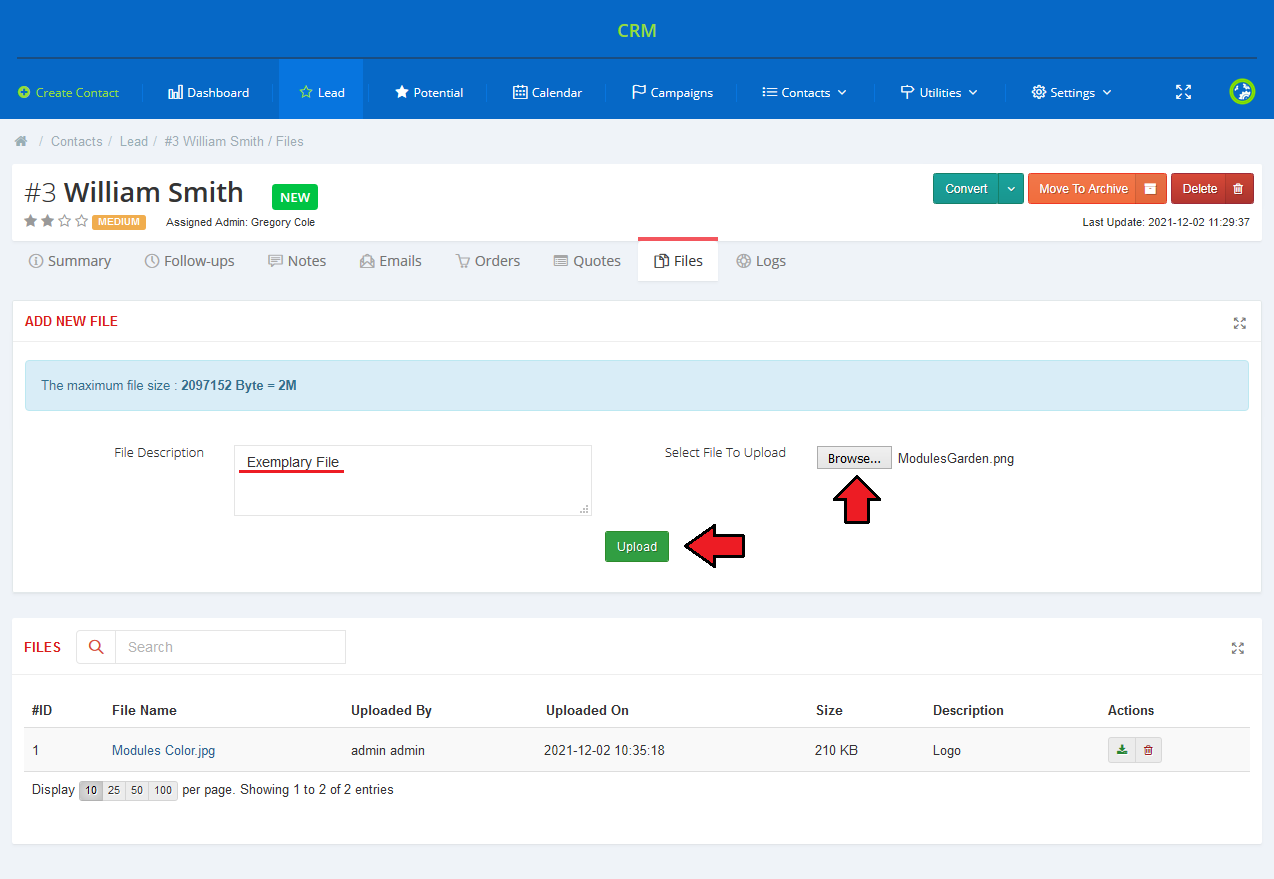
|
| Any uploaded file can be downloaded from the CRM by pressing its name or using actions icons. It can be also removed by clicking on dustbin icon. |
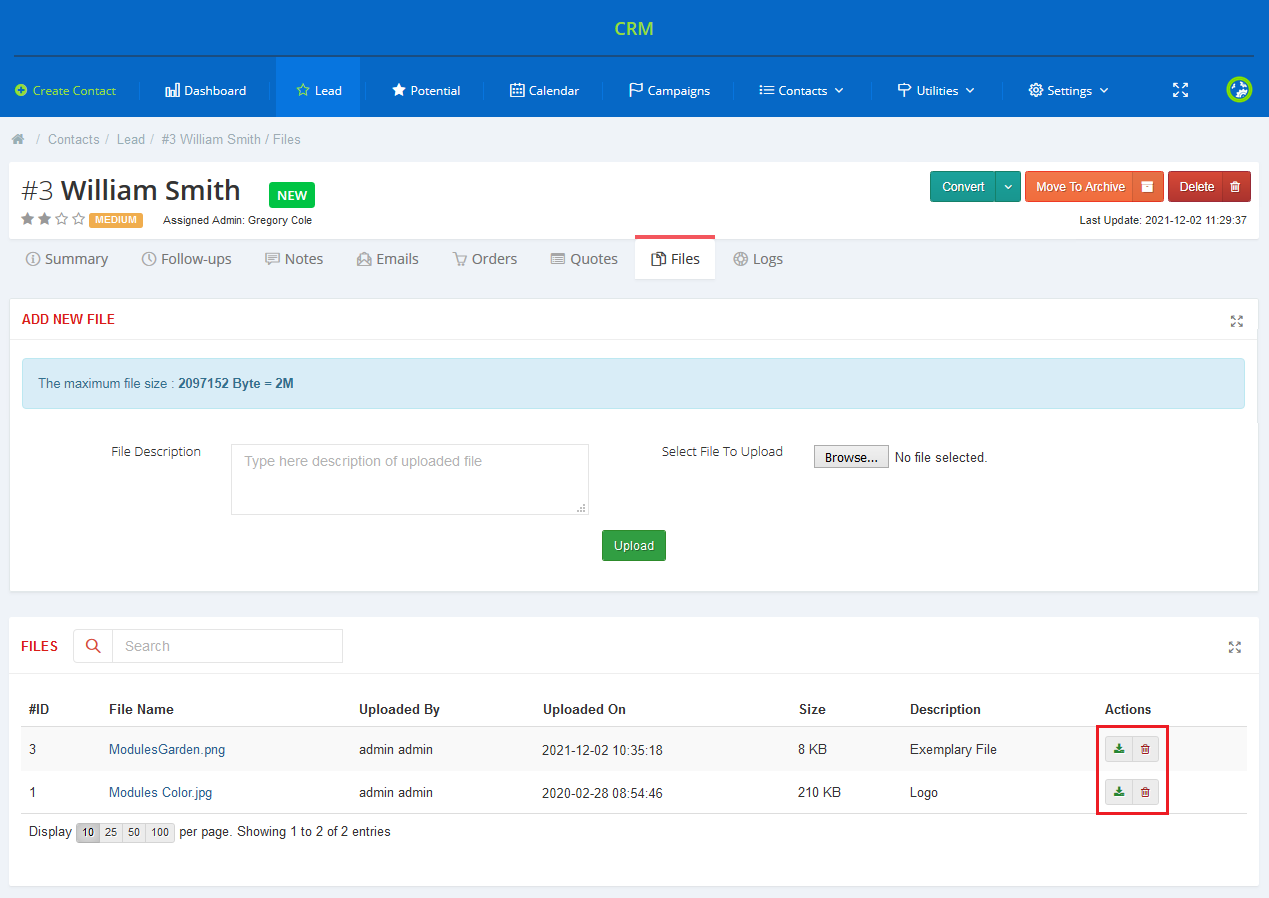
|
Logs
| To view the latest actions performed on the contact, go to 'Logs' tab. As you can see, it contains all details you might want to find in the logs. |
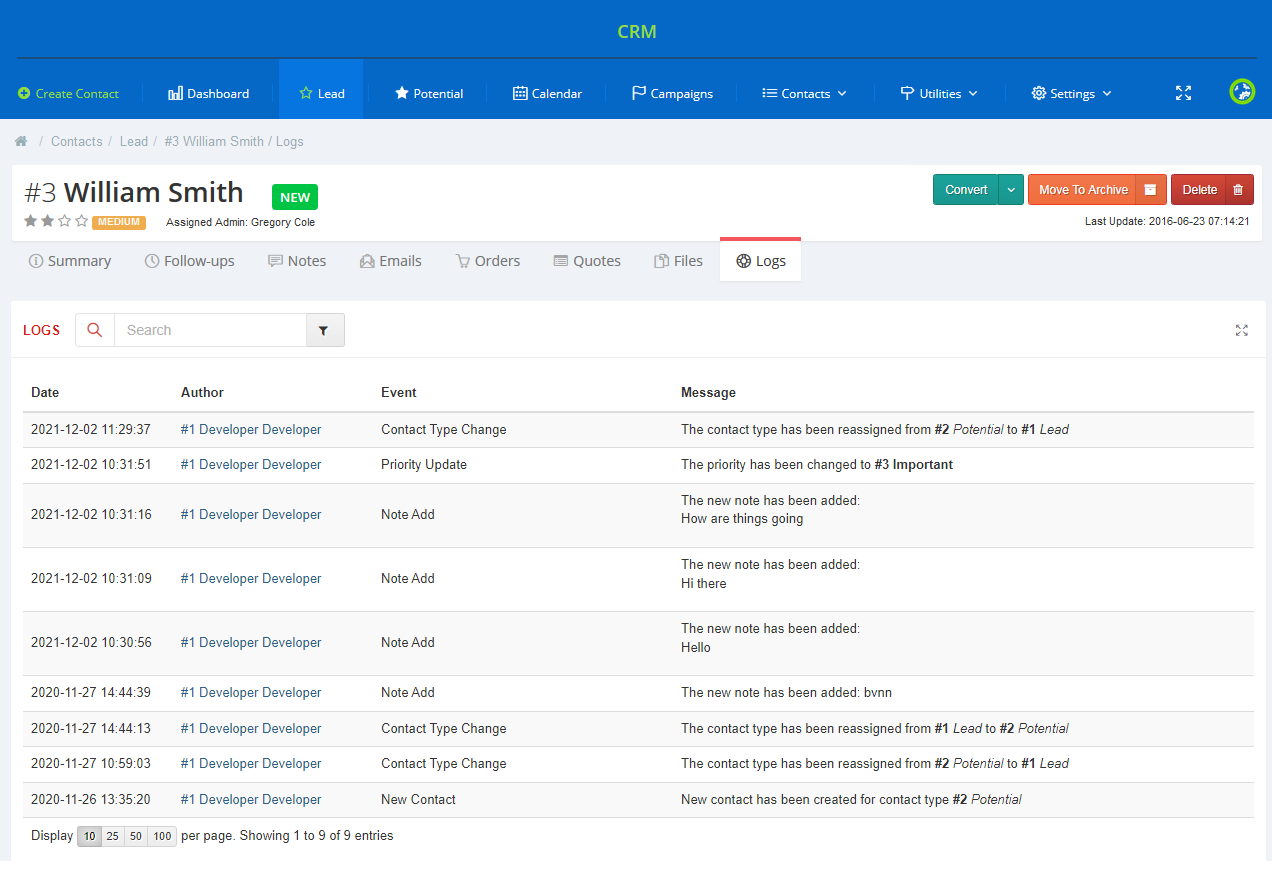
|
| 'Logs' page, apart form displaying all the logs concerning the contact, contains searchbox. Using the search option you can find logs of actions performed by specific administrators, at desired time and concerning desired actions. |

|
Calendar
| Access calendar tab and you will find a fully manageable and adjustable calendar. Switch between days, month and week views to have a clear and precise view on your scheduled events (click on a selected day to see details). |
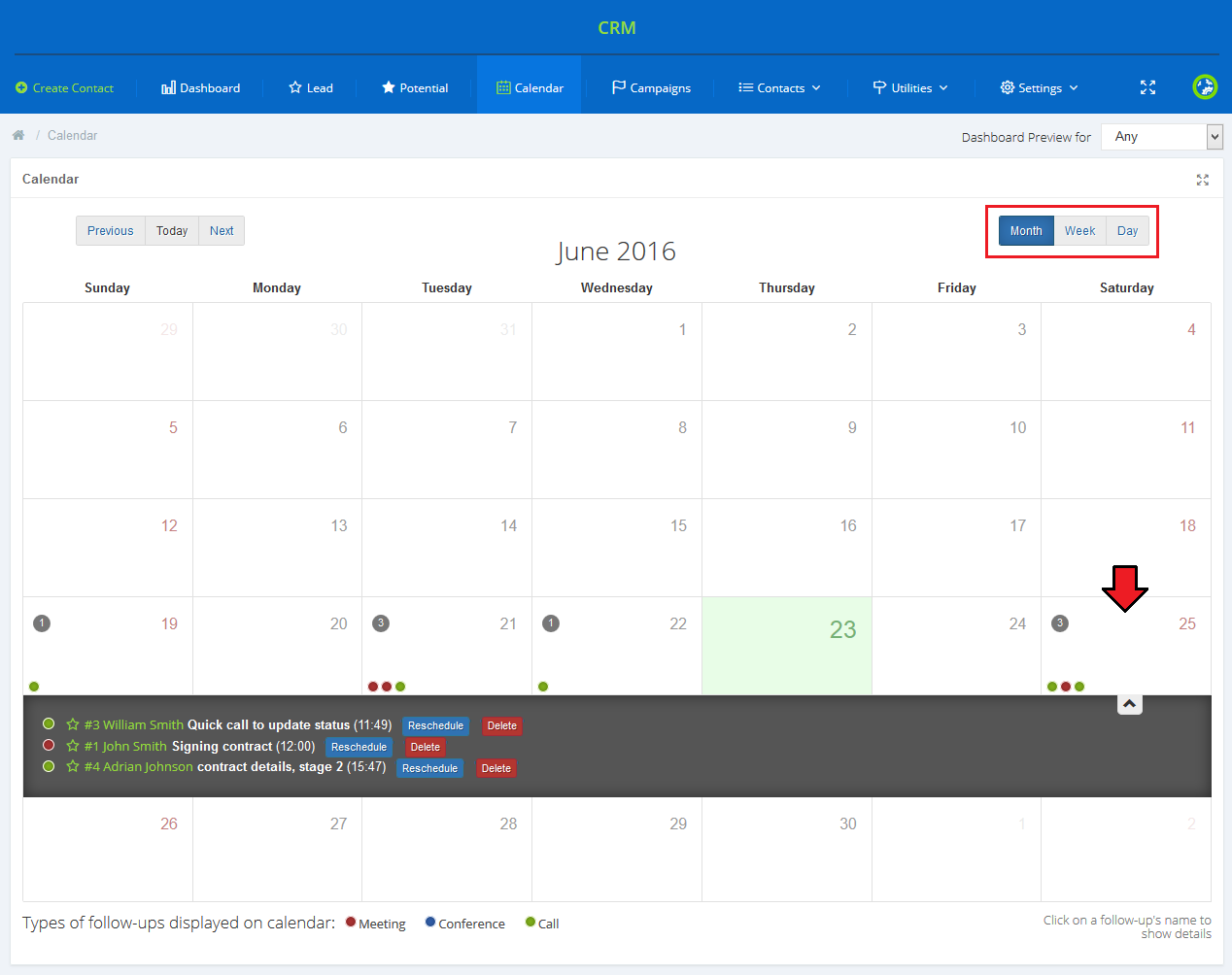
|
| Under the calendar, there is a detailed legend of visible items with enumerated types of follow-ups. Click on any follow-up to see its details. |
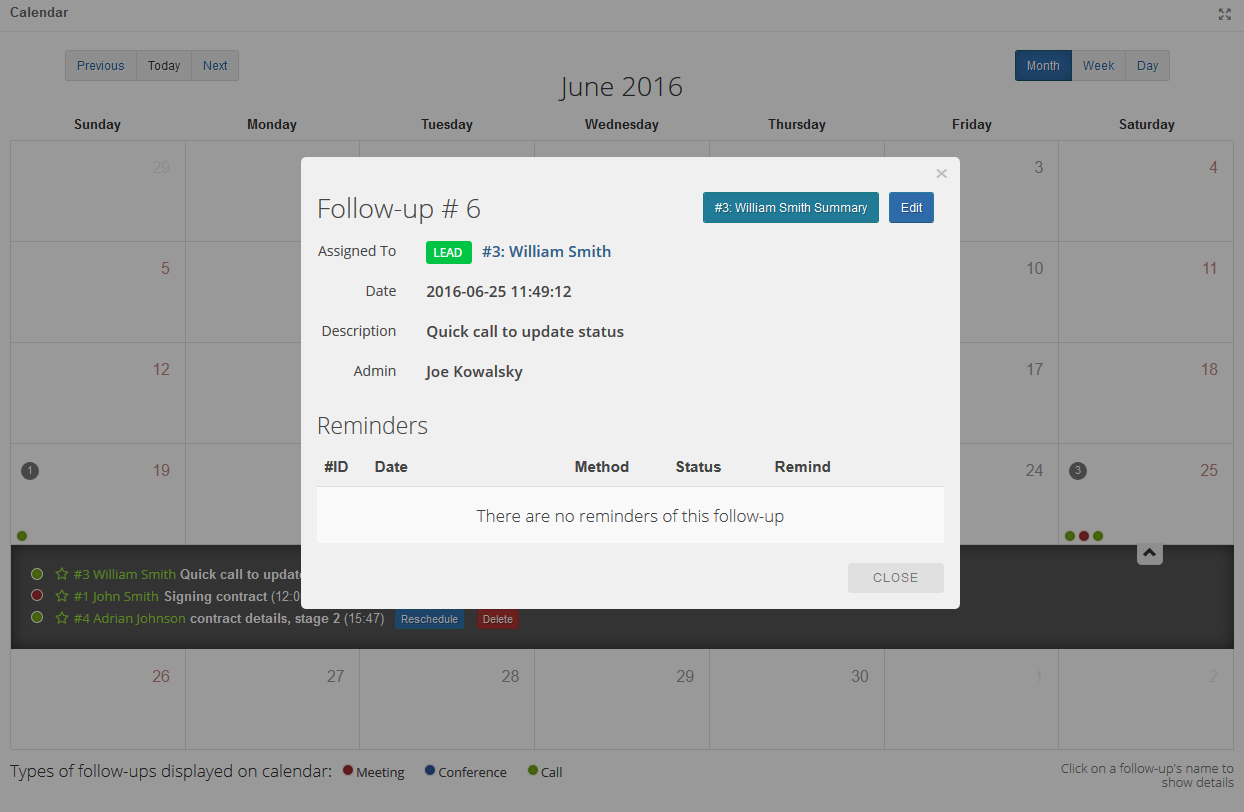
|
Campaigns
| Another functionality that CRM For WHMCS has to offer is the possibility to create customized campaigns. If you decide to apply this option, you will be able to create many various campaigns with selected contacts included and filtered according to your personal configurations. |
Add Campaign
| In order to add a new campaign use 'Create Campaigns' button. |
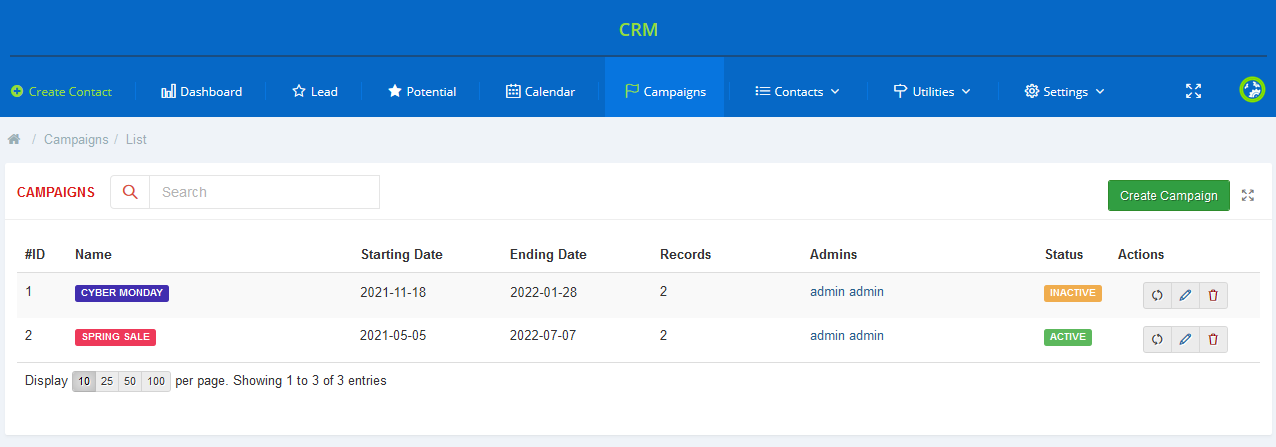
|
| Start with filling out some basic data about the campaign such as its name and descriptions. Select color that will be used to distinguish items. Assign admins who will have access to the campaign entries and declare beginning and ending dates. |
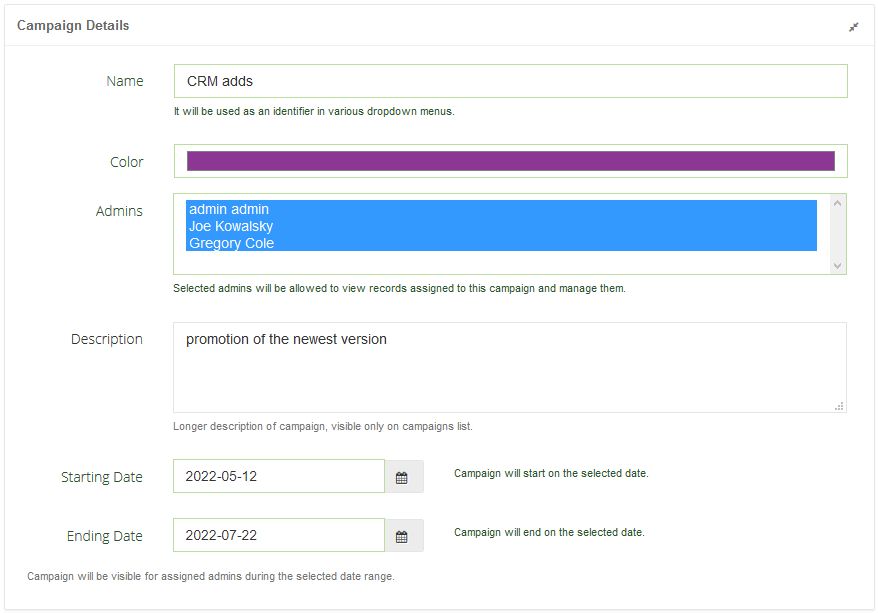
|
| In the second part you need to select filters to assign wanted record to this campaign. You may use both predefined system fields and your custom fields. Finally 'Add Campaign'. |
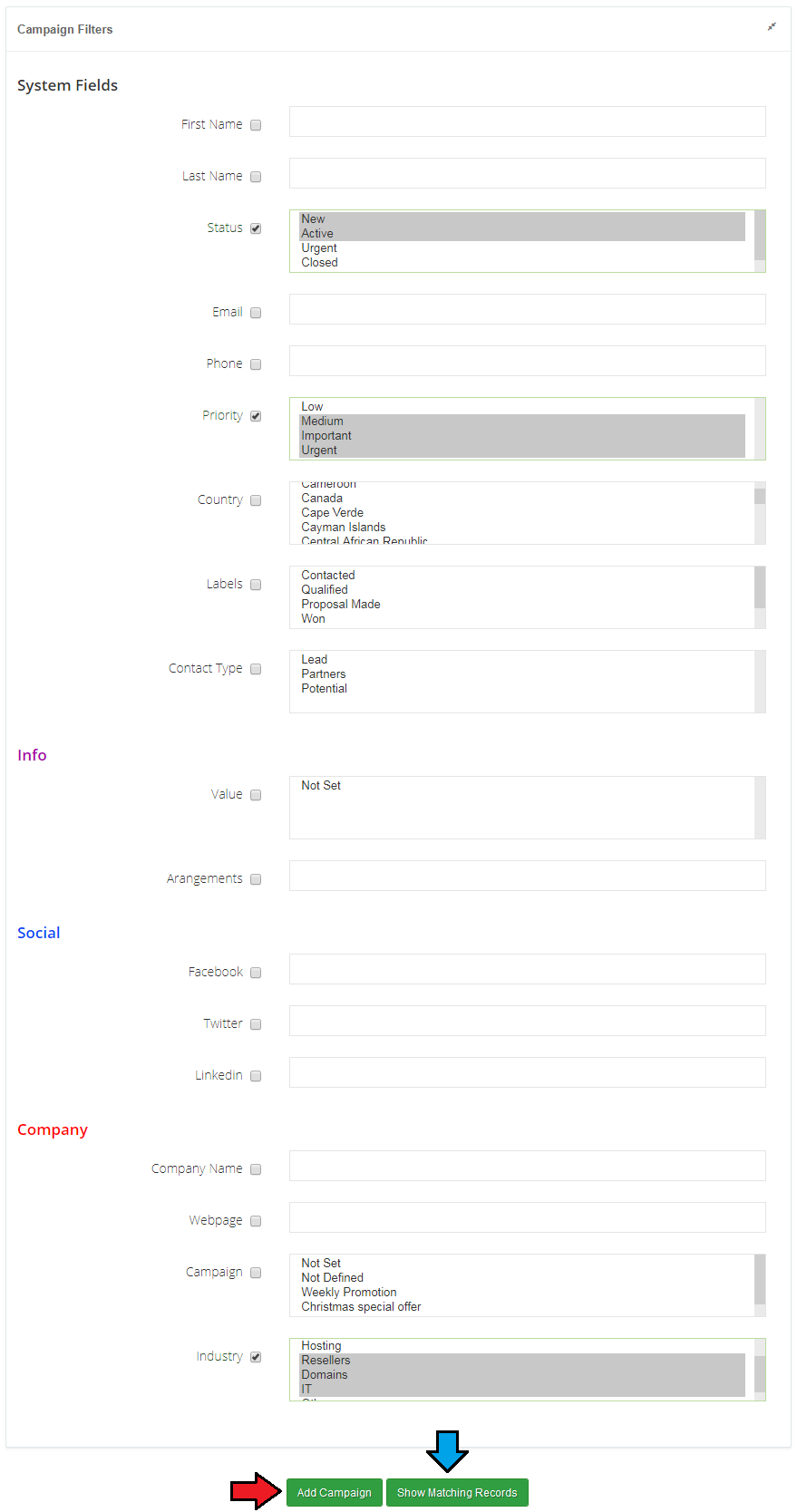
|
Campaigns List
| Find all the created campaigns stored together on a convenient list with the most crucial data close at hand. Use Action buttons to: |
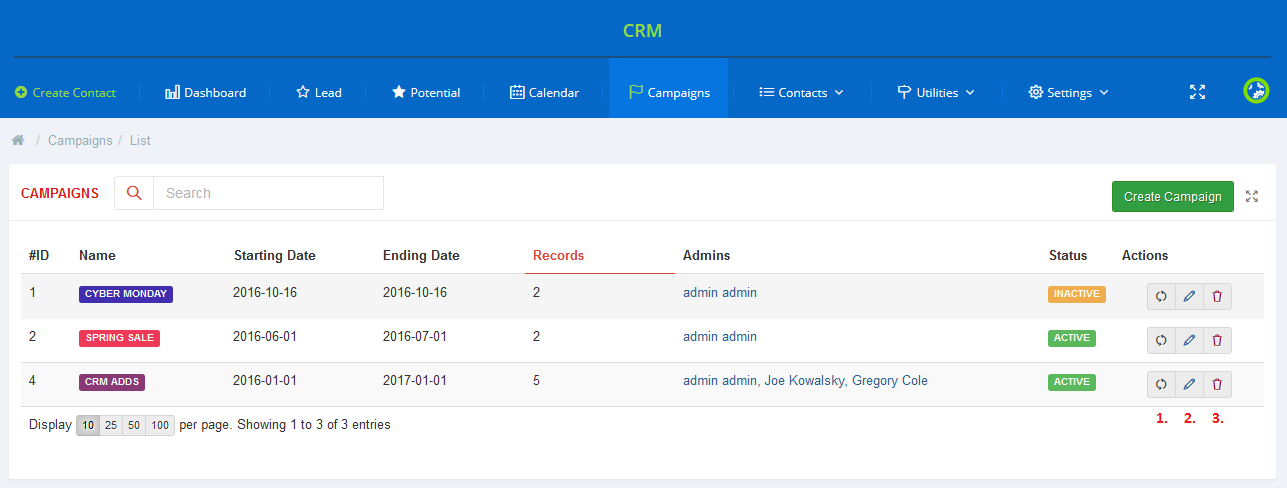
|
Settings
| Due to the wide variety of possible configurations, 'Settings' section has been moved to underneath to make the presentation more precise. In 'Settings' → 'General' page of the module you can check current module status, enable major features and define follow-ups' settings. |
General
System Overview
Under System Overview you can find information about:
|
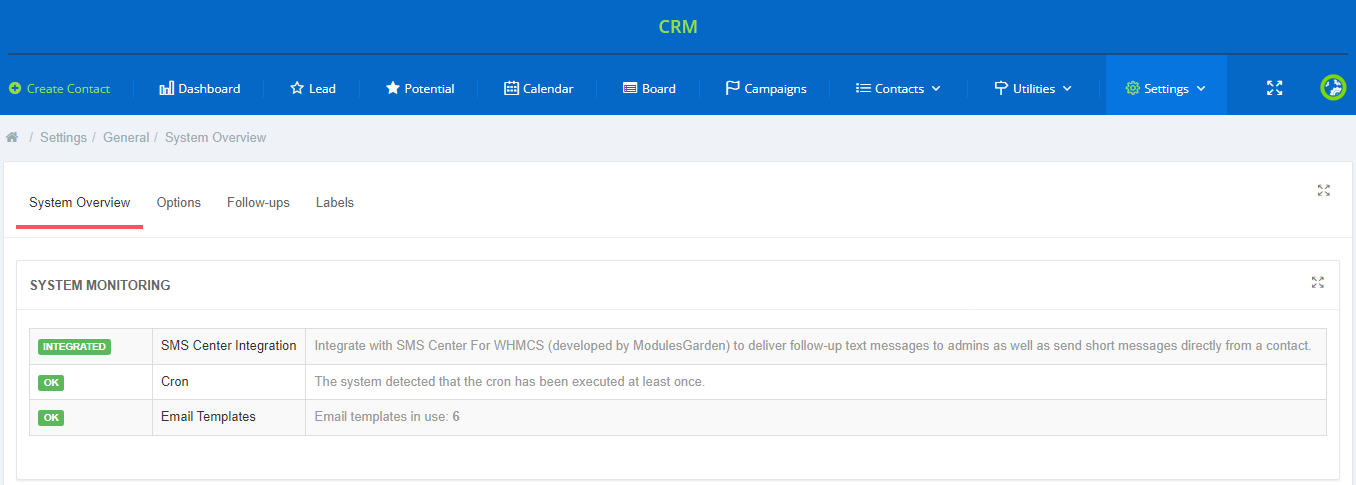
|
| In 'Cron Details', you can find all the information about the cron such as its path, last execution date and interval between cron runs. |

|
Options
| In 'Additional Options' quotations may be enabled for leads and potentials as well as possibility to assign leads to administrators. |
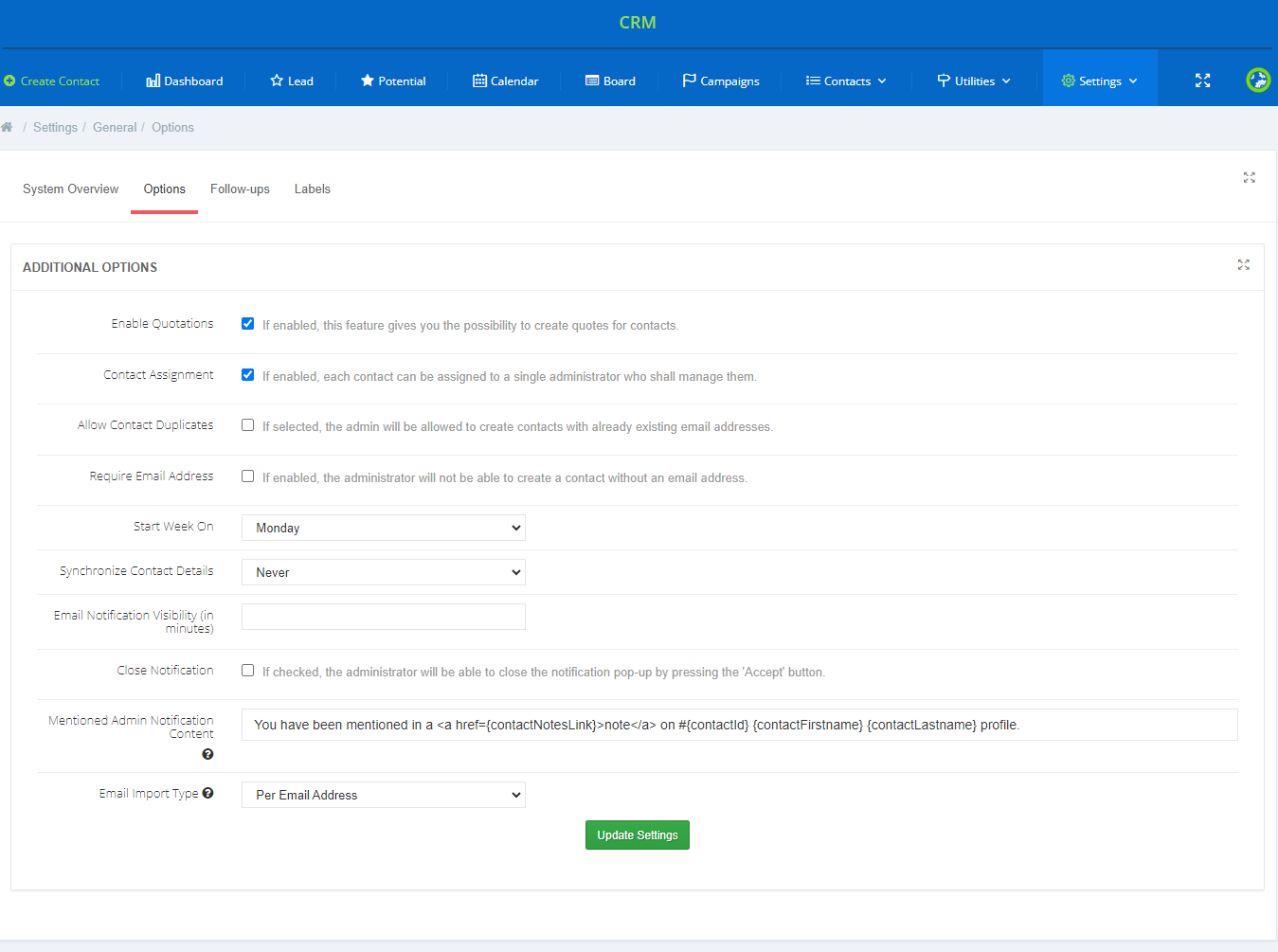
|
Follow-ups
| In the next section of General Settings there are few options to configure follow-ups. In settings part, you may activate alarms which will show pop-up notifications on coming follow ups. Click here for example. |
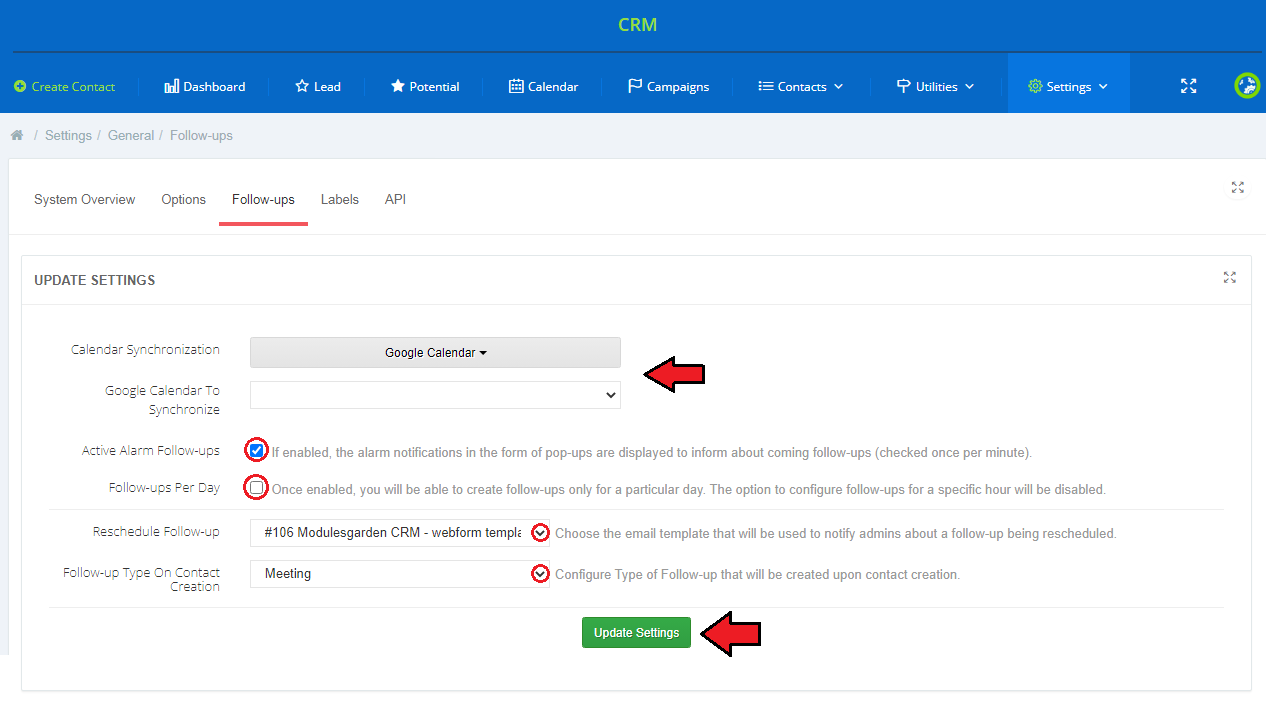
|
| Add new follow-up type by entering its name, assigning a color and finally enabling it to use. Once added you will see in the list of available underneath. |
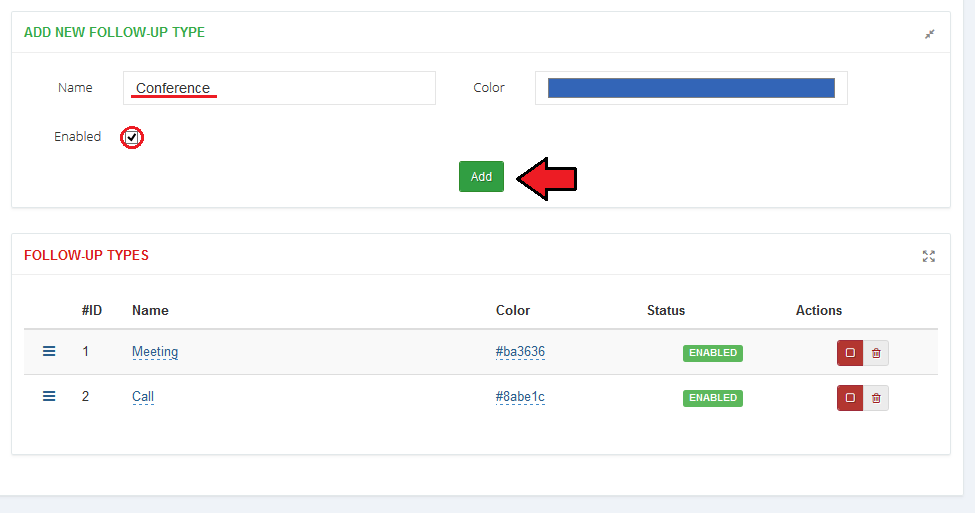
|
API Connection
| You may easily connect with our module through its own API. To learn more details please visit this page. |
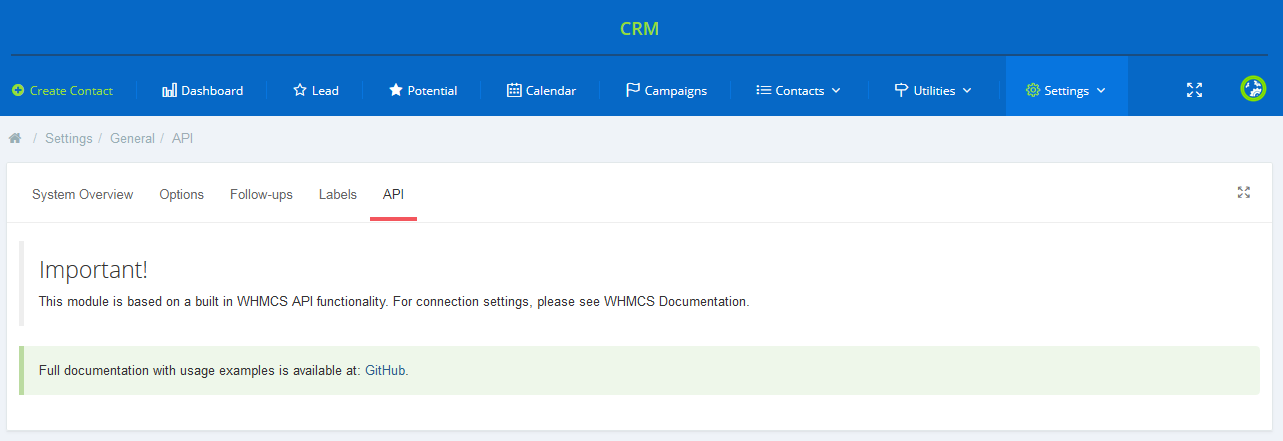
|
Personal
Personal Settings
| Provide a URL to your avatar to personalize your CRM as you only wish! |
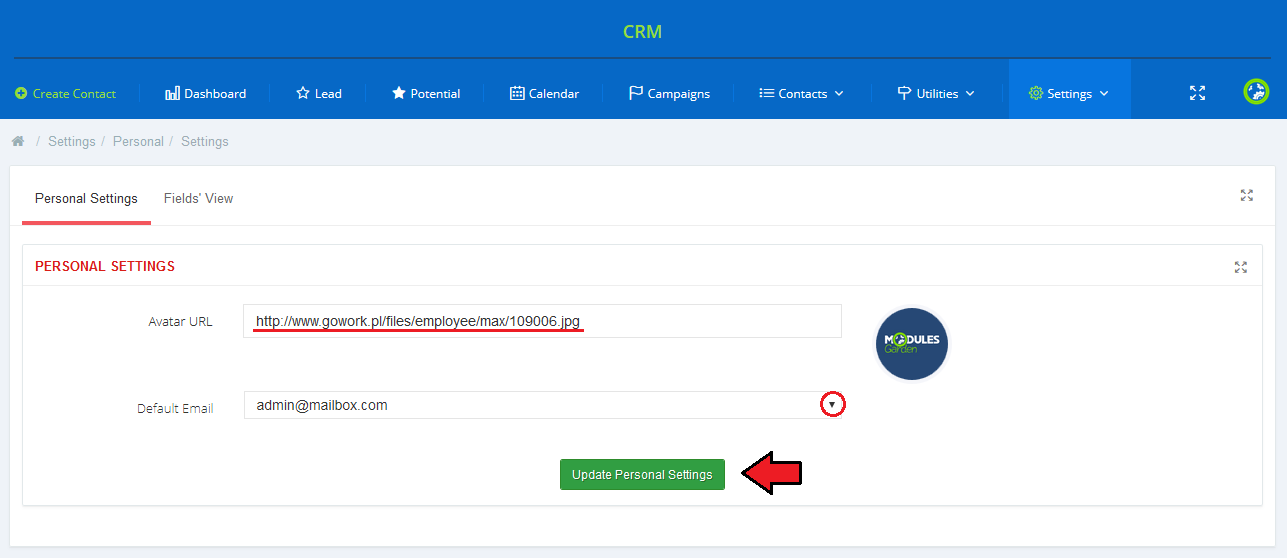
|
Fields' View
| In this place you may decide which columns exactly and even in what order they will appear in each of the possible sections (Contact's page and Dashboard). Click on each section one by one to set its view. Drag and drop available fields to create a perfect configuration. |
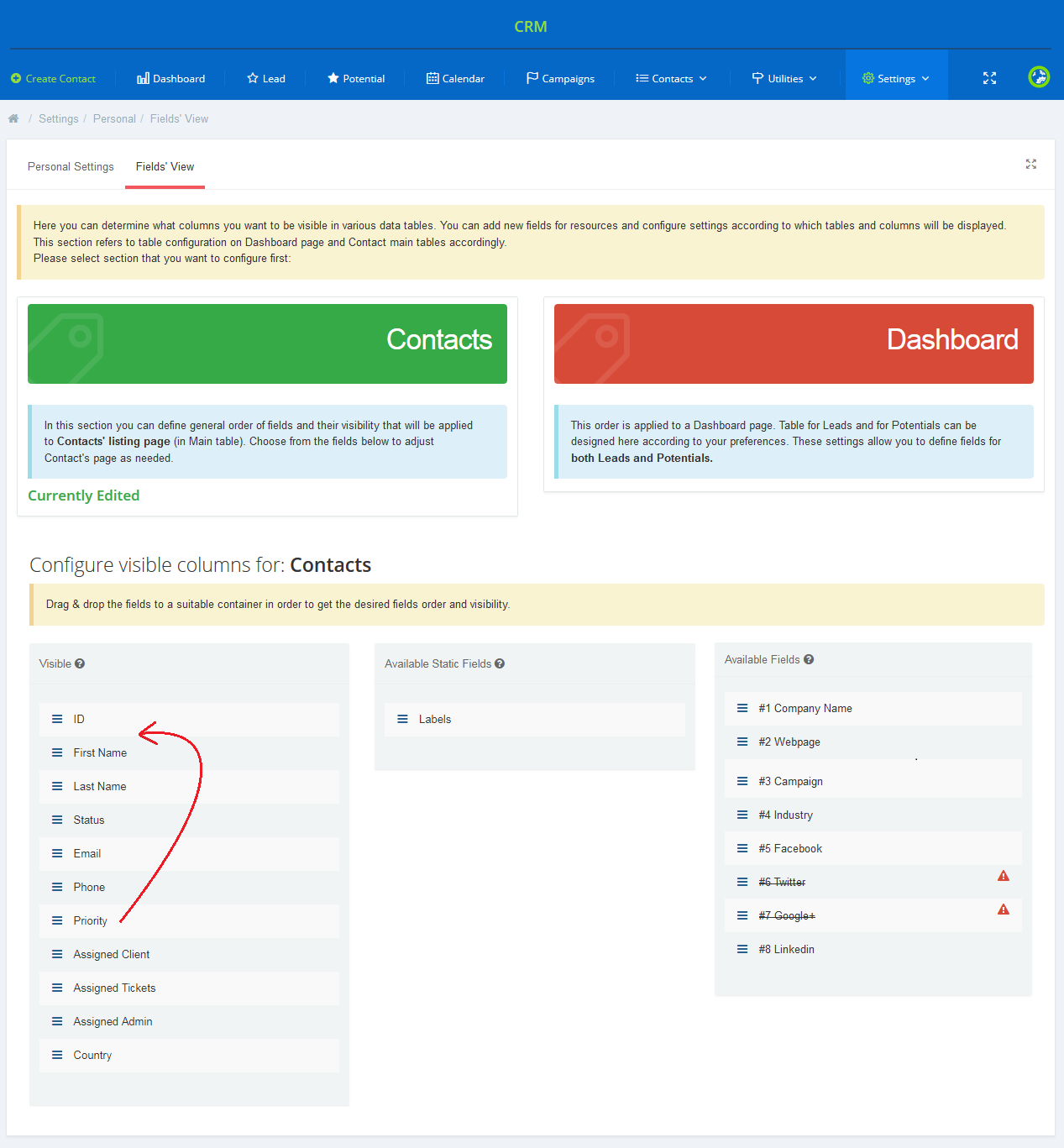
|
Fields
| Manage 'Fields' fully, add new fields, group them, define statuses and map existing fields. |
List Of Fields
| Each field, regardless of its type, has its name, description, assigned group and obviously its type. Available types and validators for each of the types (seen when editing existing field)
On the following screen you can see an example of a dropdown type custom field. |
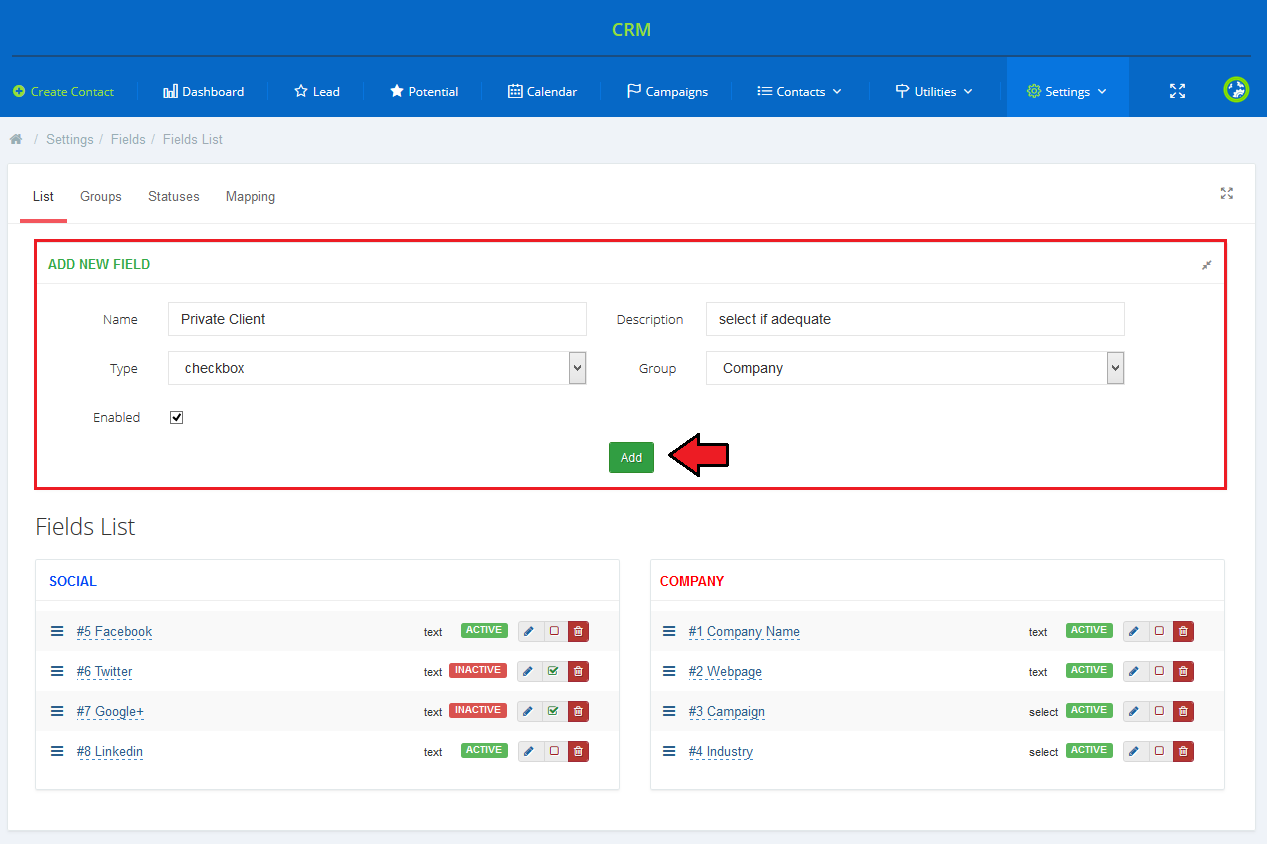
|
Groups
| Place where groups to segregate fields are created. Once you already know how you want to group your fields, create an adequate groups. Name them, assign a color and enable to start using it. |
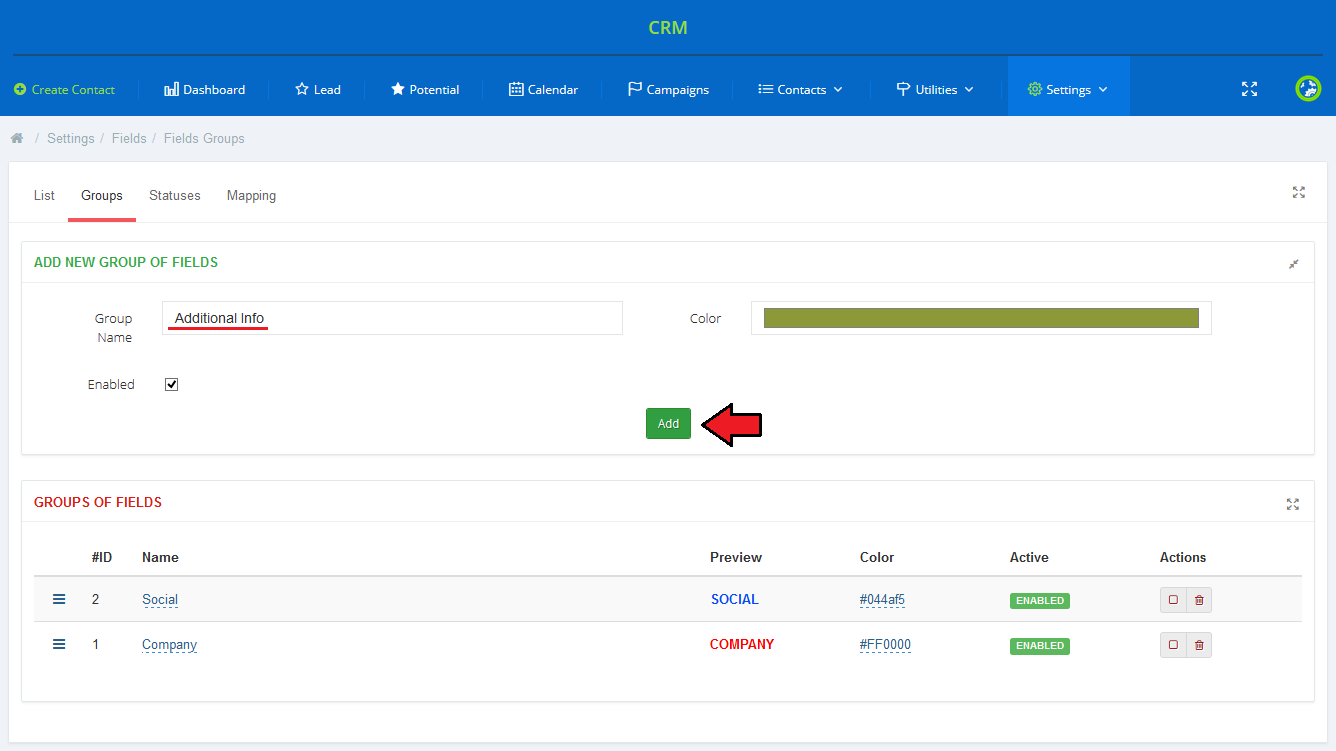
|
Status
| Exactly, just like in case of groups, you may add hare statuses that later on will be used to segregate fields. Name the new status, assign a color and enable to start using it. |
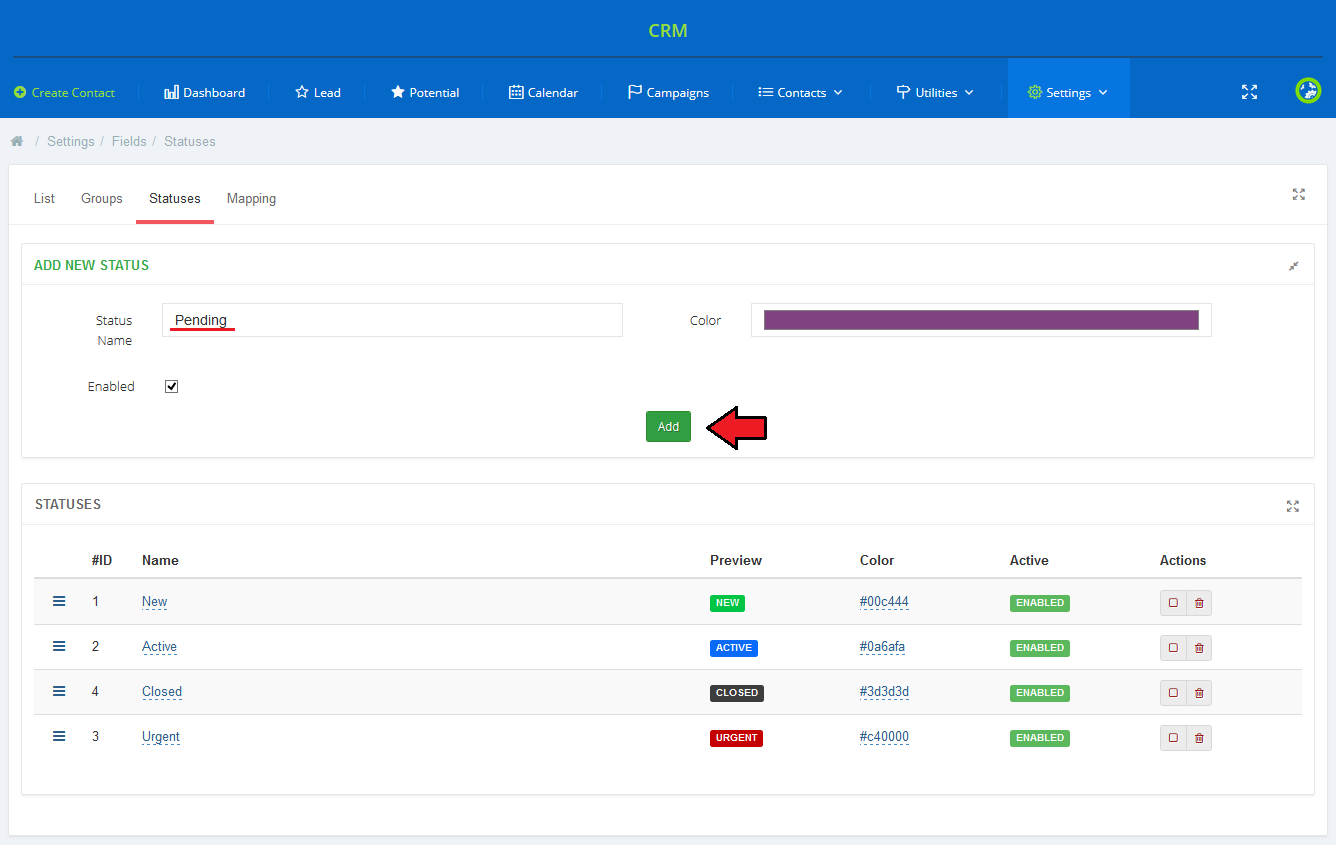
|
Fields Mapping
| 'Fields Mapping' option allows you to bond CRM fields with WHMCS standard or client custom fields. This way during creation a lead from client's ticket or a client from lead, mapped fields will be automatically filled out. |
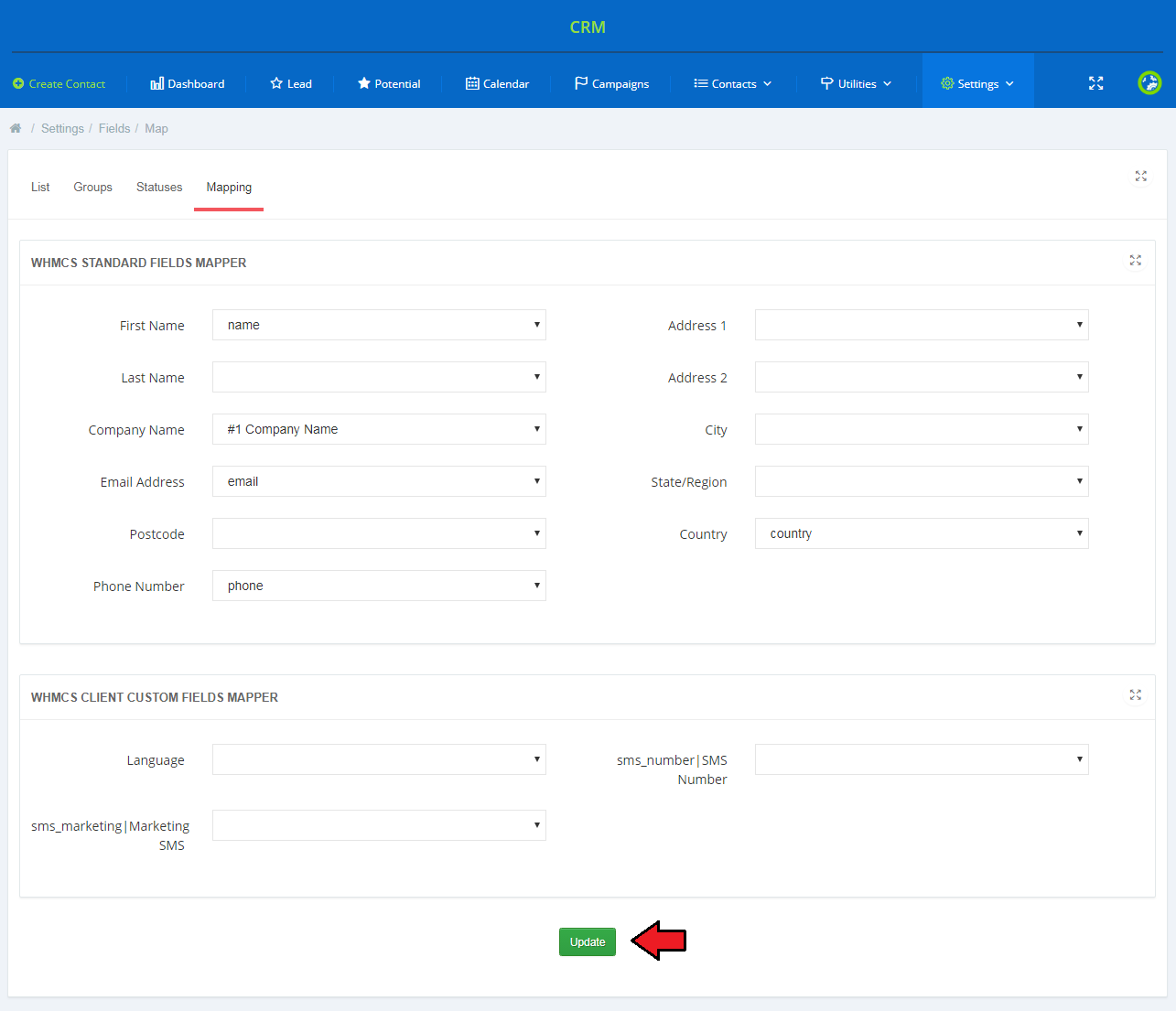
|
Contact Types
| 'Leads' and 'Potentials' are the only predefined contact types that are available from the beginning you start using your CRM. However, to make our CRM for WHMCS even more customizable and user friendly we have implemented a function which allows creating new contact types and their full management. |
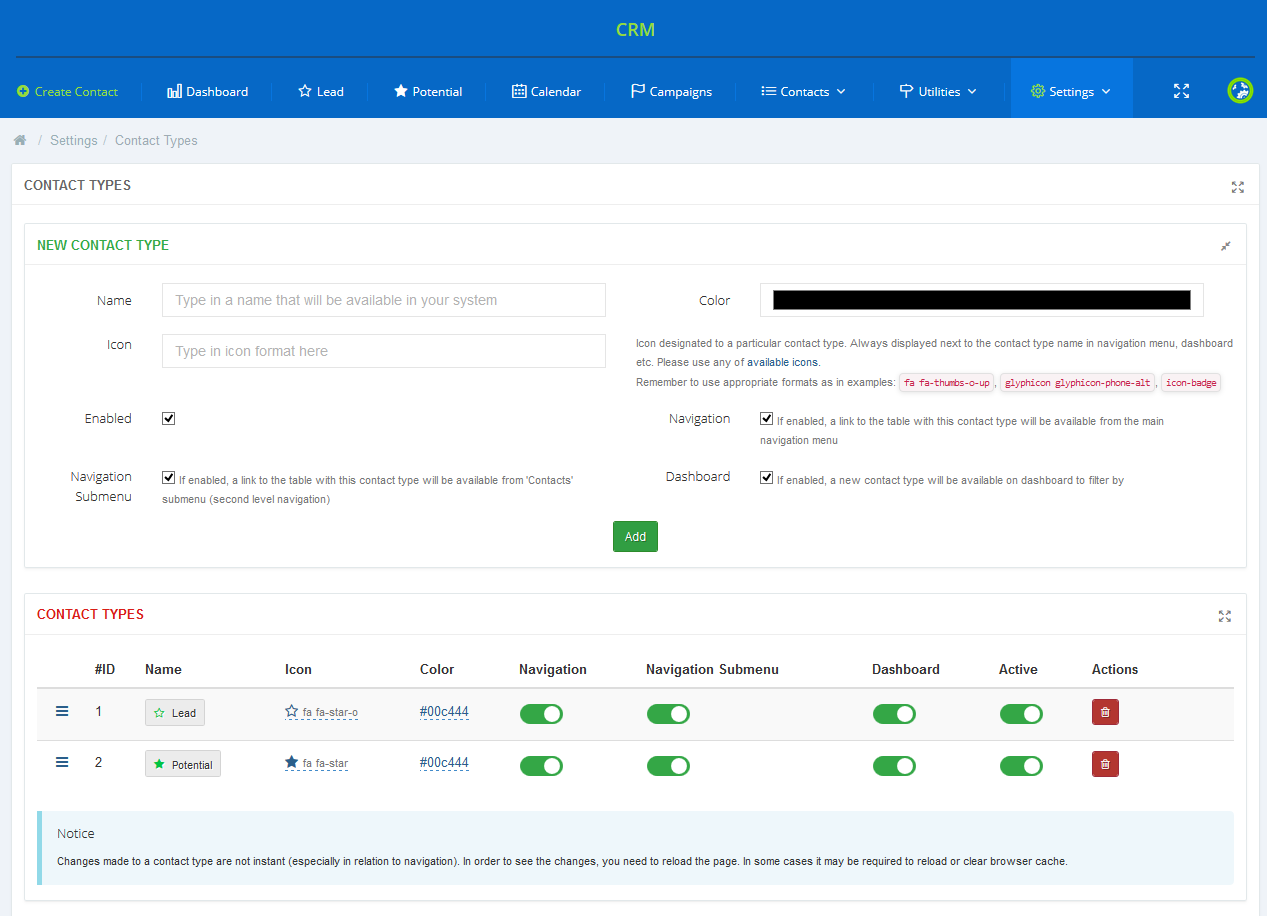
|
Add New
To add a new type simply fill out the visible on the screen below form.
Press 'Add' button to finish the process. |

|
Contacts Management
| Under the creation form, there is a list of all available in your CRM contact types, together with the predefined 'Leads' and 'Potentials'. Here you can fully customize your contact by:
Important! |
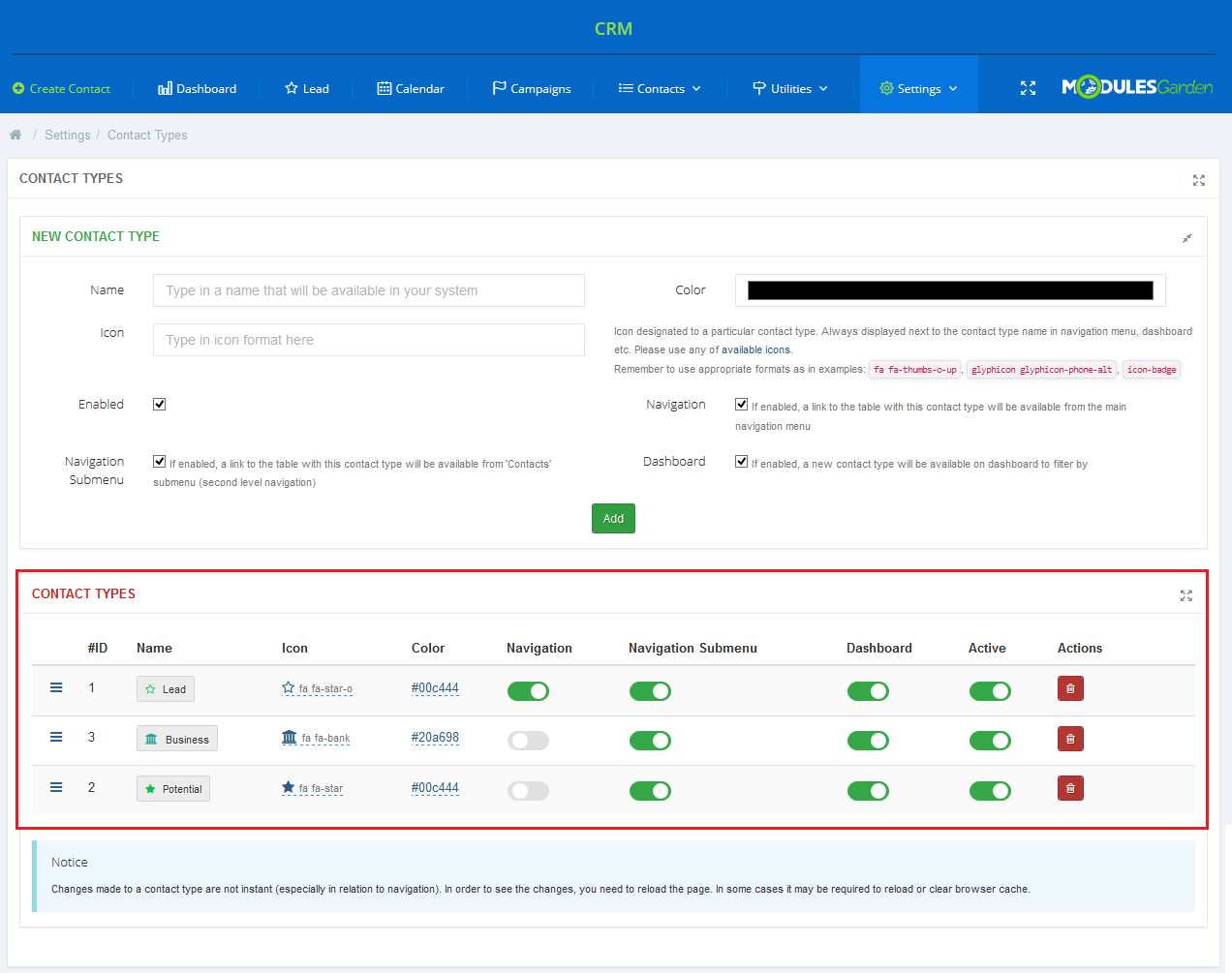
|
| If you want to delete a contact type, you will be asked to choose another type to which any contacts of the deleted type will be reassigned to. If you do not want to reassign the contacts to another type, you can move them to the archive, to do so, simply select 'Move to Archive' option. |

|
Permissions
| The last but one section in 'Settings' is responsible for assigning permissions to certain roles of group of administrators.
Select permissions for each existing role. |
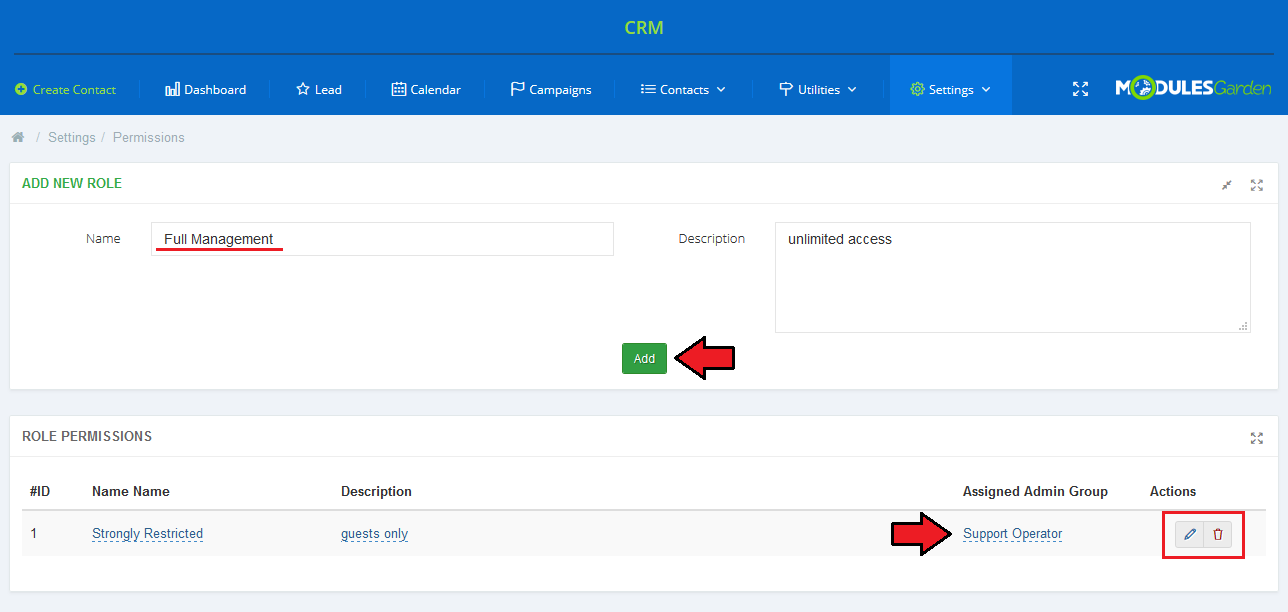
|
| Once you have added a new role, use actions buttons to move the page where you can choose single permission rights for the group. Select the one you need and 'Update' the settings. |
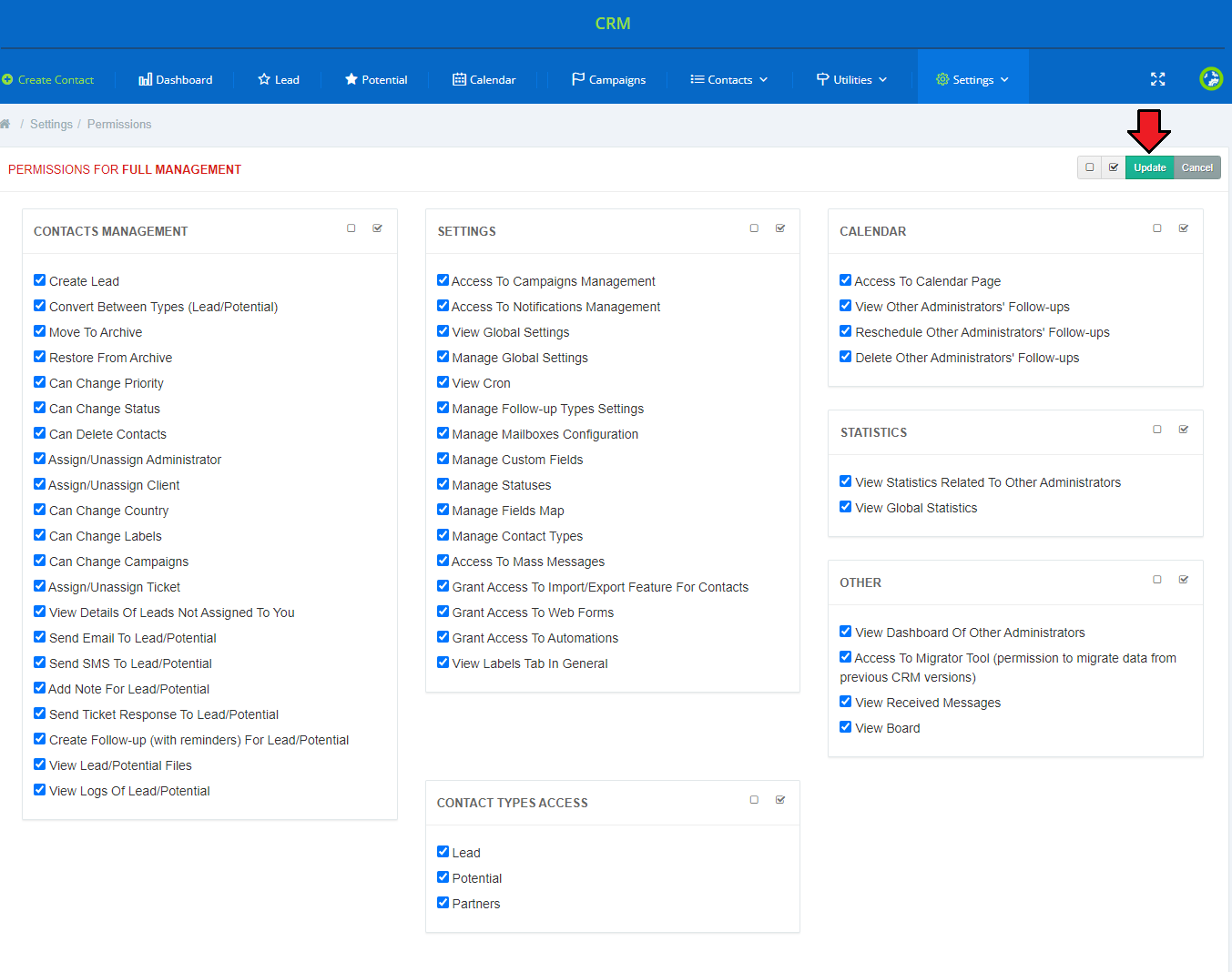
|
Import/Export
Export File
| In order to export a file from your CRM system, simply choose a target file format (CSV, xls, xlsx, ods or pdf) and press 'Export' button. A file with a list of contacts available in your system with their details such as name, type, priority, phone etc will download shortly. A list of available fields that can be included in the file to either import or export are available underneath. |
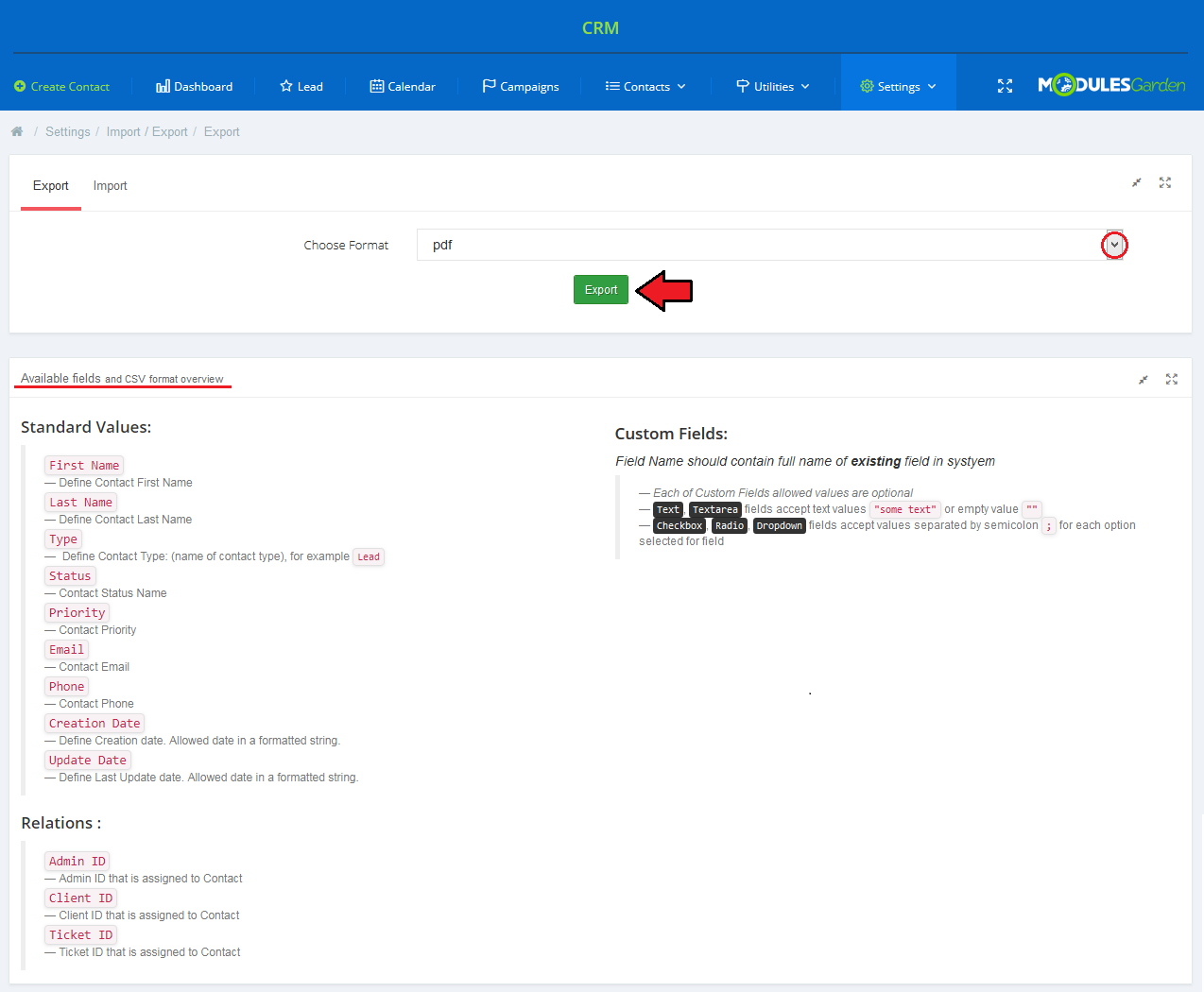
|
Import File
| In order to import a file to your CRM system, simply select a file from your disc and press 'Upload' button. A file with uploaded list of contacts will be available shortly. |
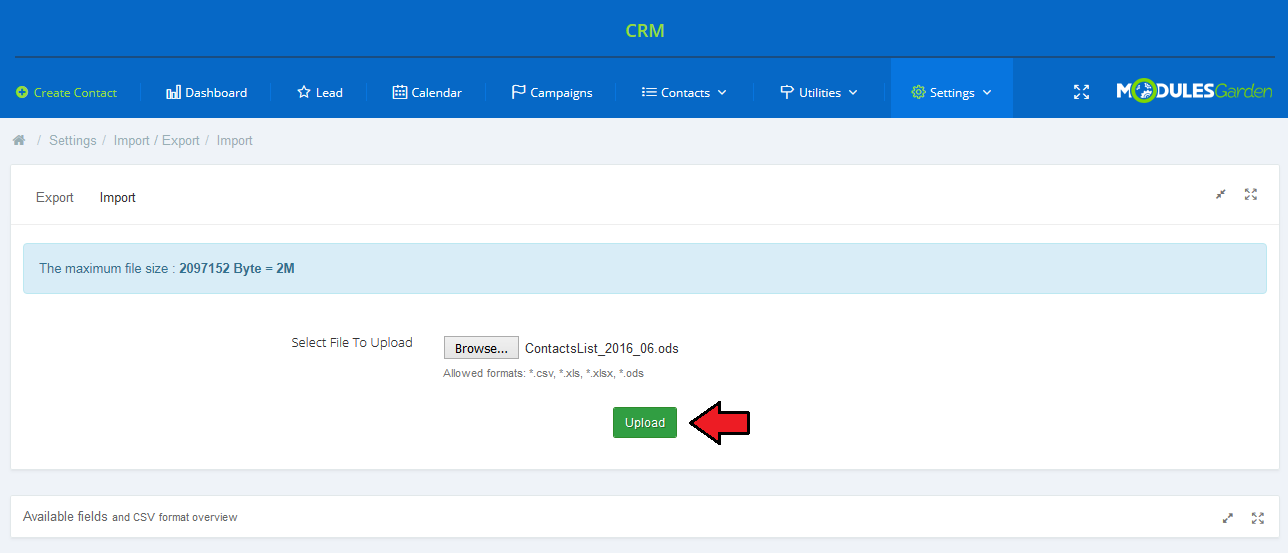
|
Web Forms
| Web Forms give the possibility to collect contacts' details from different sources. In your CRM for WHMCS you may now generate sample web forms which you can then locate in your external sites. Your customers then will fill out their data Proceed to 'Settings' → 'Web Forms'. There is a list of all already created web forms. You may edit them or delete at any time. Press button marked on the screen to create a new web form. |
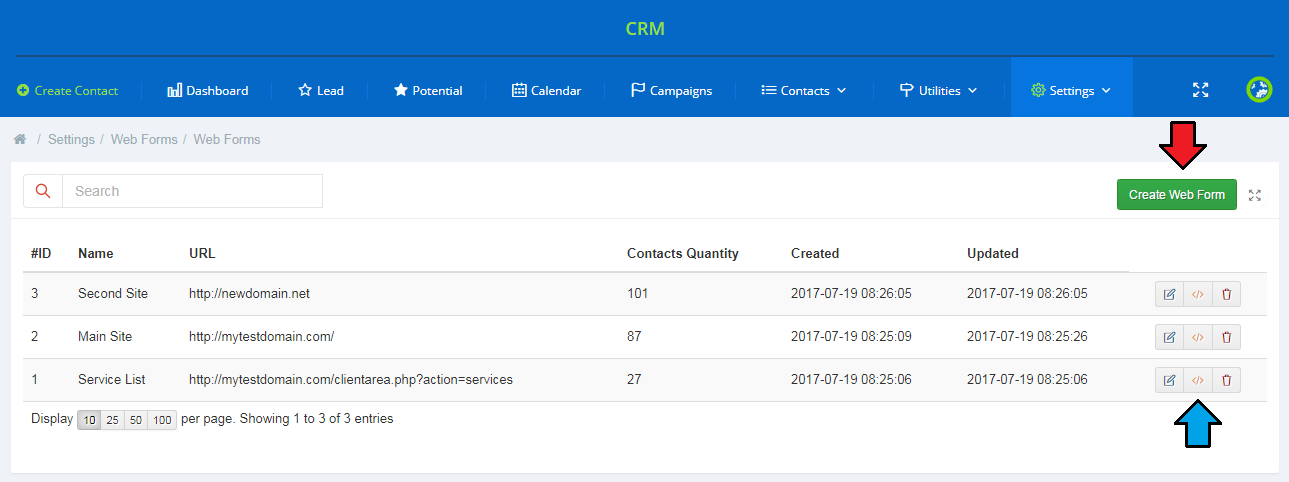
|
To generate a web form, you must provide some basic details:
Additionally, you may select fields that will be visible to fill out. Drag a field and drop in the currently created web form box. |
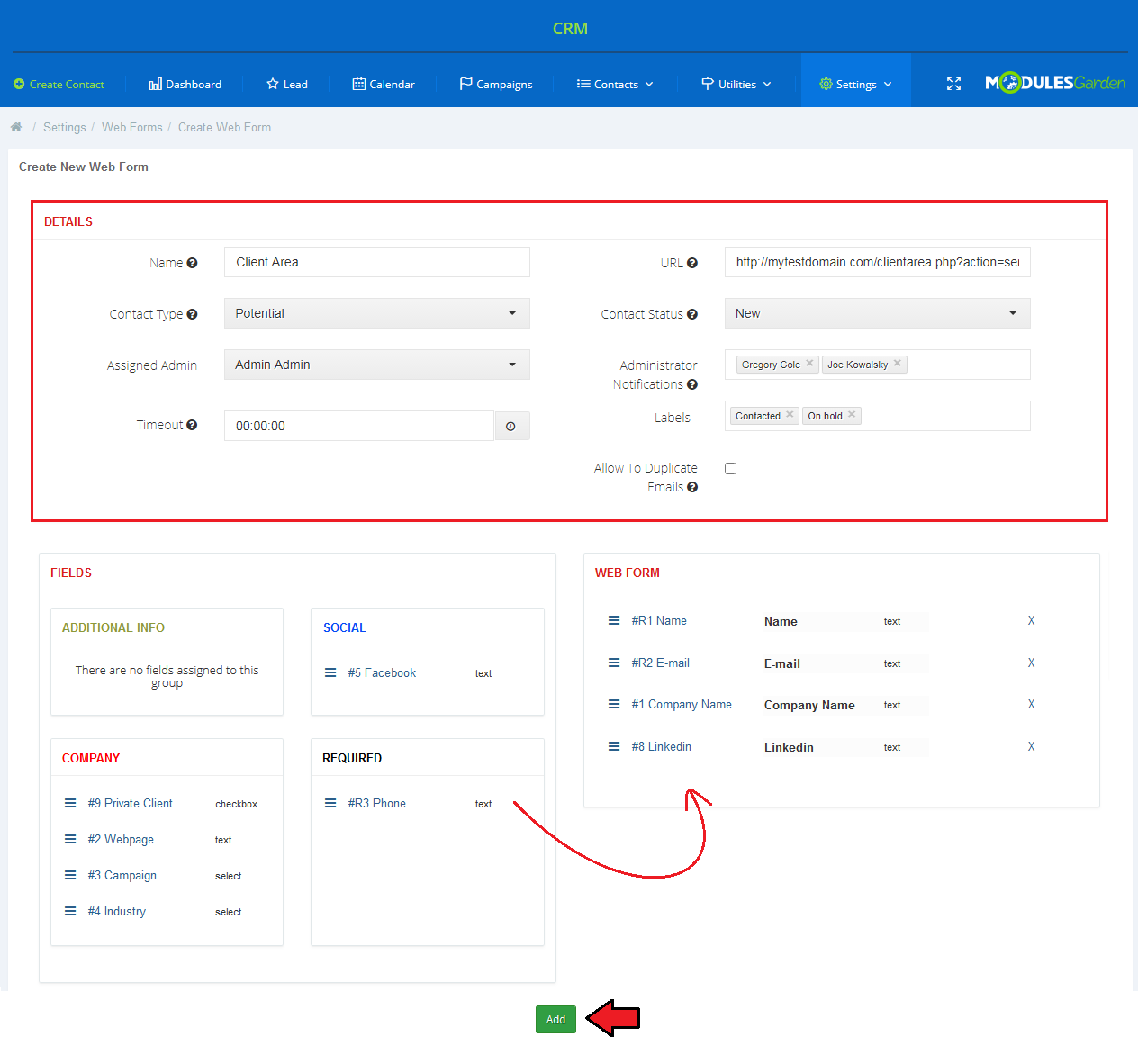
|
| Once your web form draft is ready, you have to now manually add it to the desired location. Underneath, you will find a sample instruction on how to add a web form as a widget to word press application. 1. Log in to your admin area on your Word Press. |
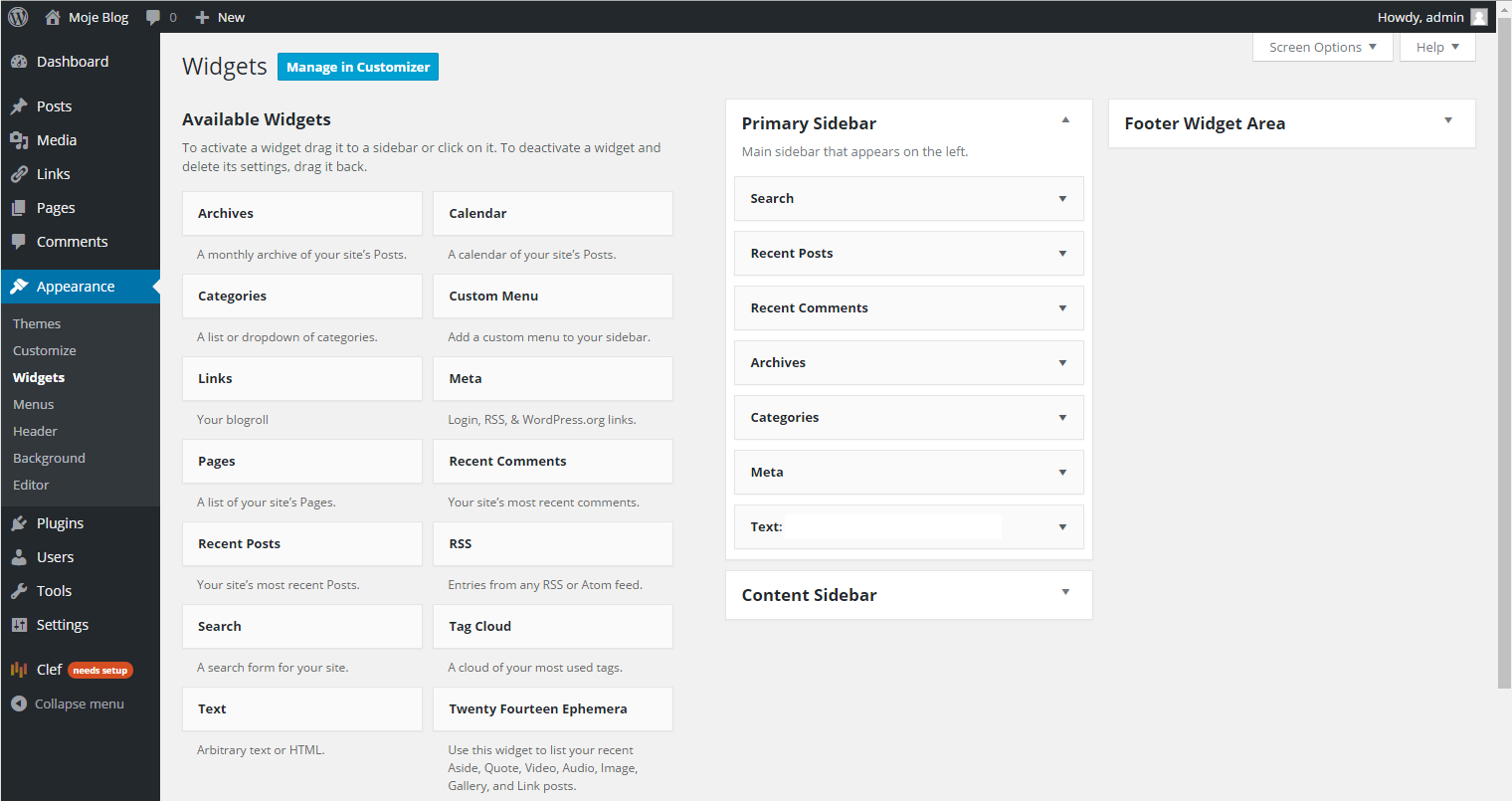
|
|
3. Select 'Widgets' → 'Content Sidebar'. |
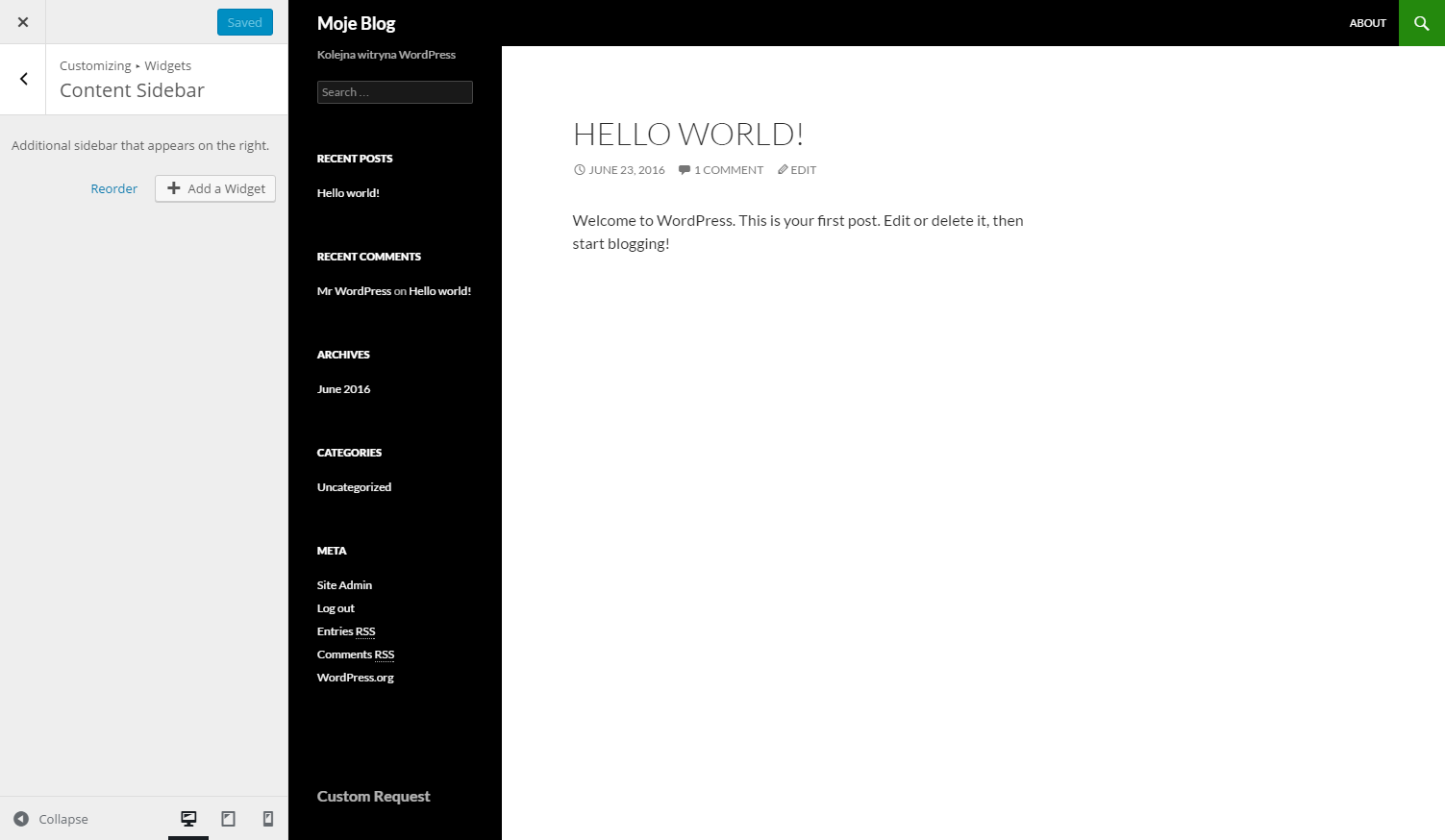
|
|
5. Title your widget. |
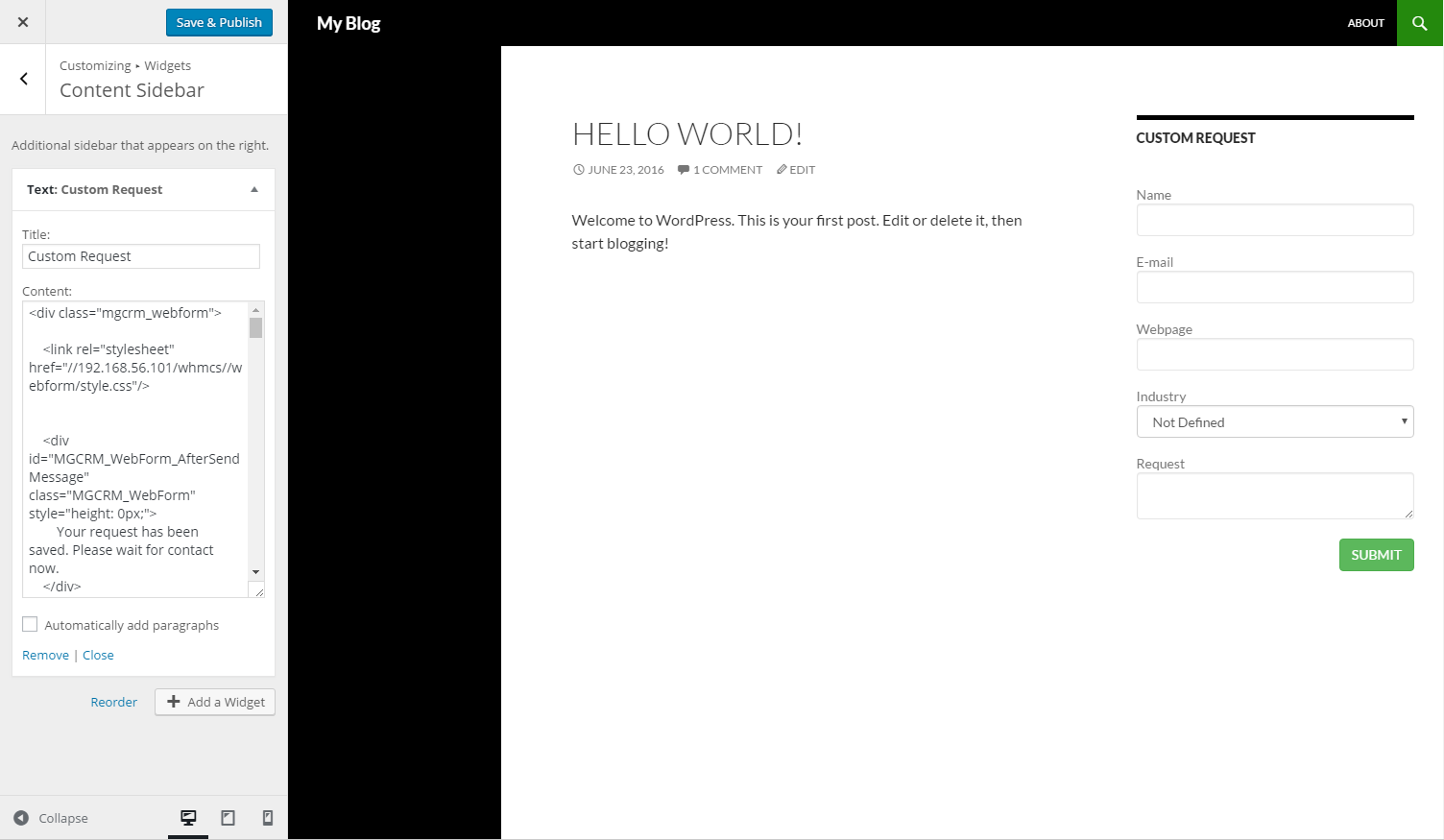
|
| Ready! Your web form with empty fields that can be filled out by your clients is ready. If your clients provide required data, new contacts will be automatically added to your CRM. |
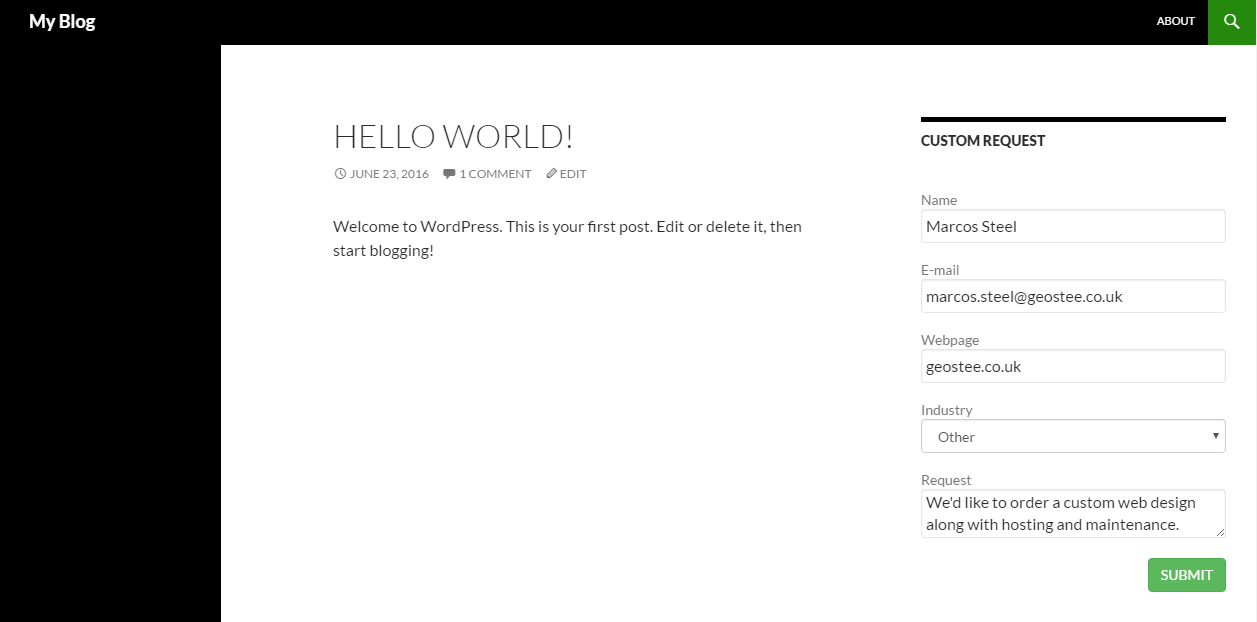
|
Utilities
Statistics
| 'Statistics' contains graph concerning your leads and potentials.
Among the graphs, there can be distinguished graphs showing for example: the number of Leads and Potentials per status, new contacts per admin, per month and per day. In 'Statistics' you can find the overall information such as graphs on Leads and Potentials of chosen status. |
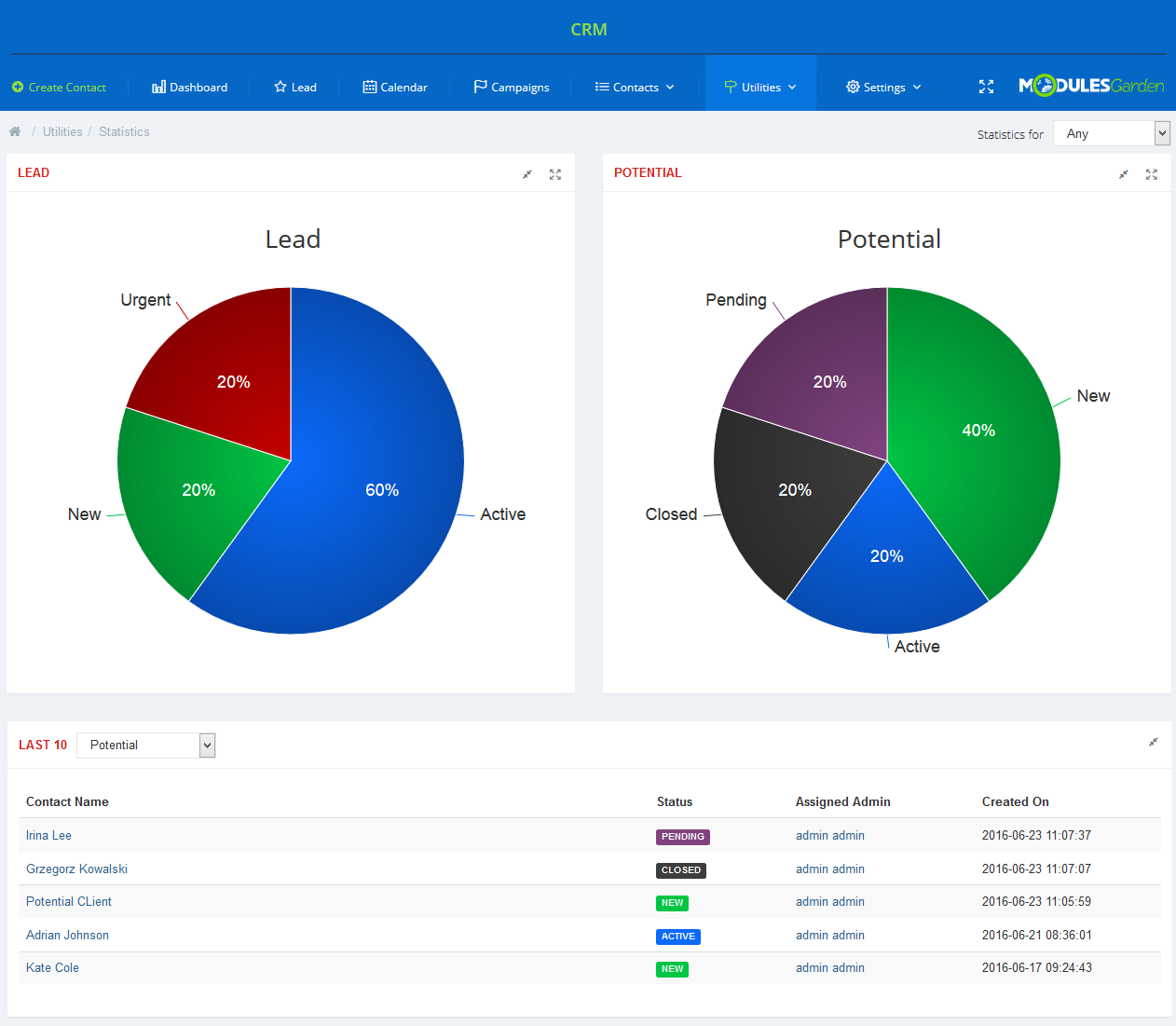
|
| There are graphs and statistics tables presenting number of leads/potentials added within certain periods of time (year/month) |
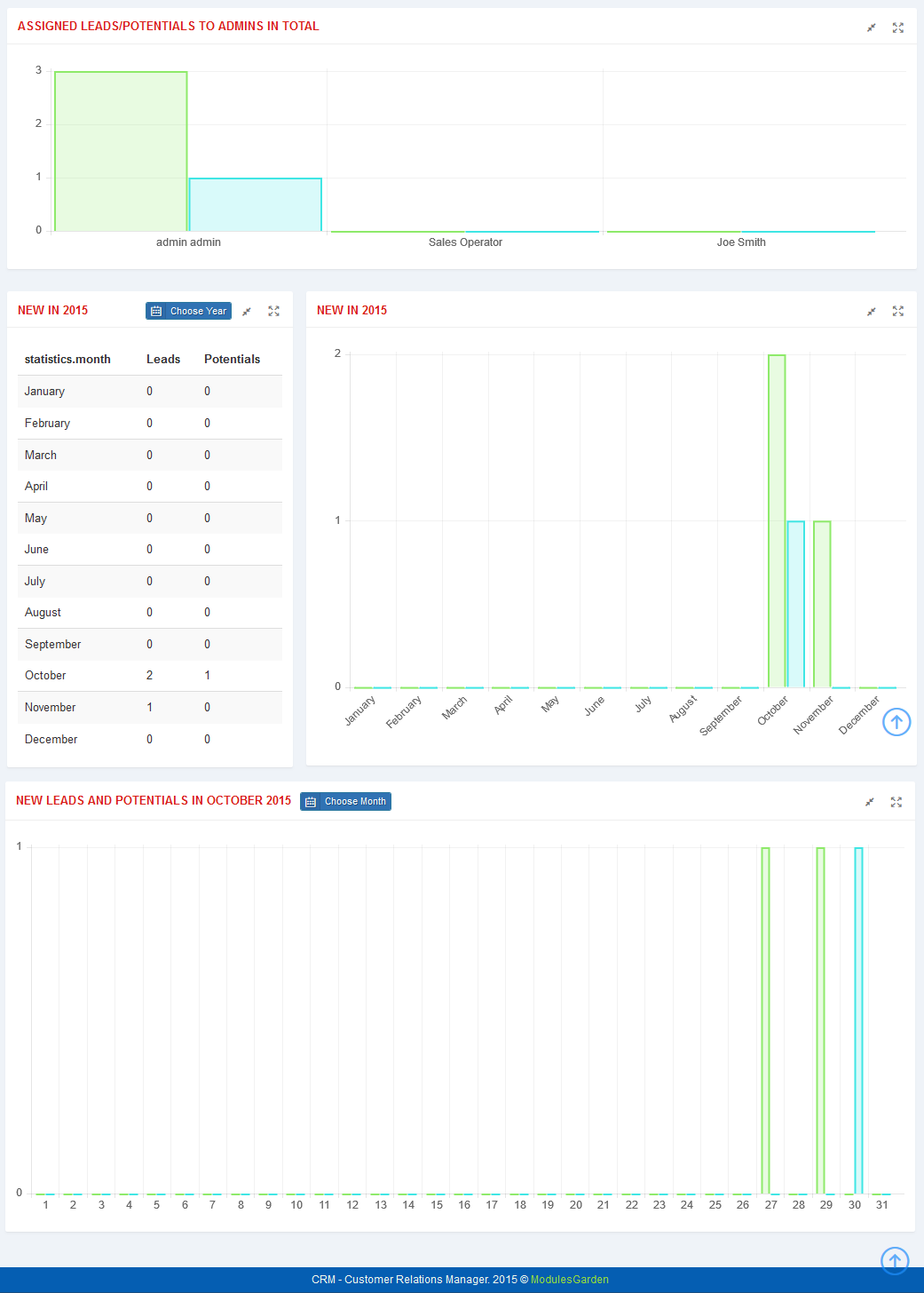
|
Notifications
| In this part you can manage any notifications that shall be delivered to any administrator depending on the configuration. Let's check how it works. Press 'Create Notification' to begin. |

|
You are moved to 'New Notification' creation form. Fill out the data to tailor the notification base perfectly in accordance with your needs.
Press 'Create Notification' button when ready. |
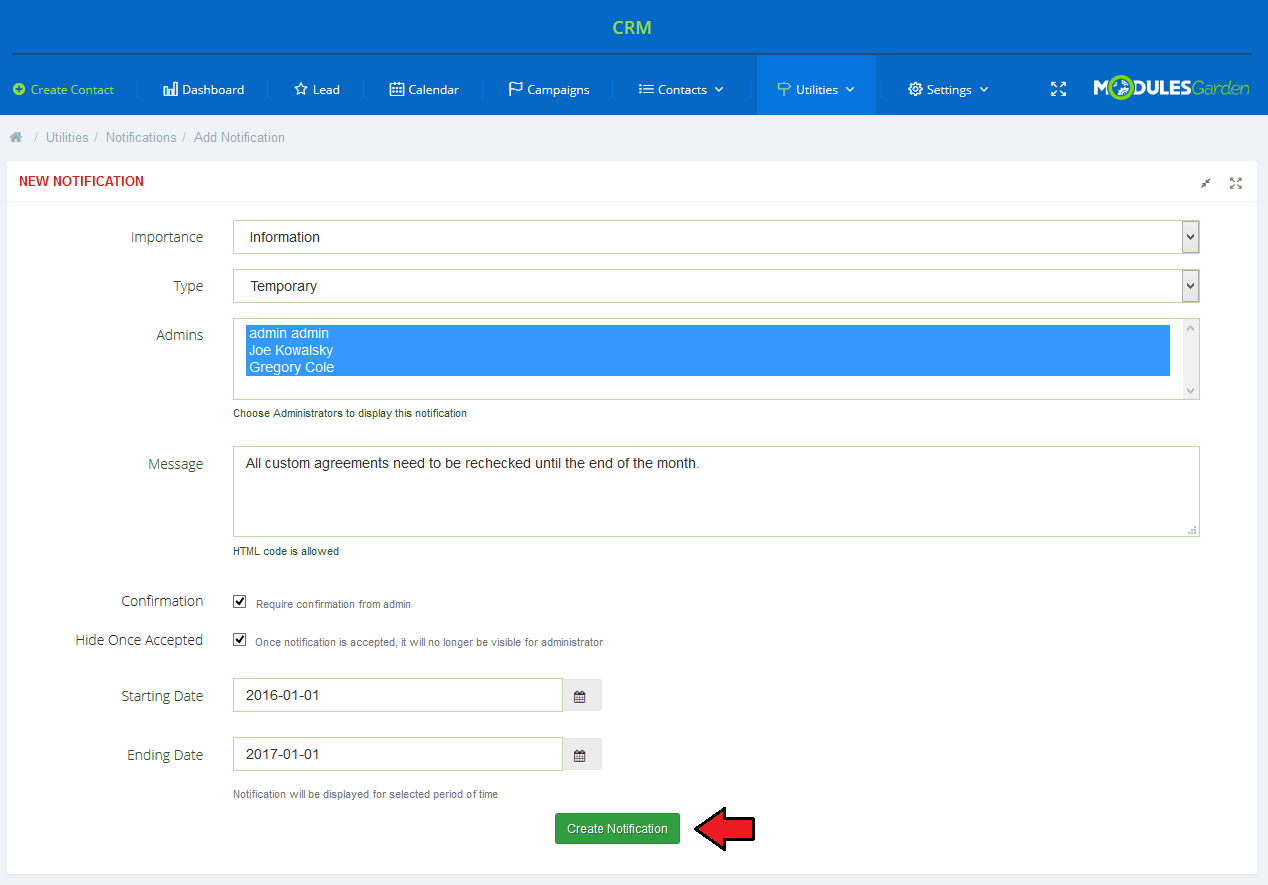
|
| A newly created notification form is now visible on the list of all notifications in the system. You may easily edit the notification (you will be moved to creation form where you can make any changes) or delete useless notification. |
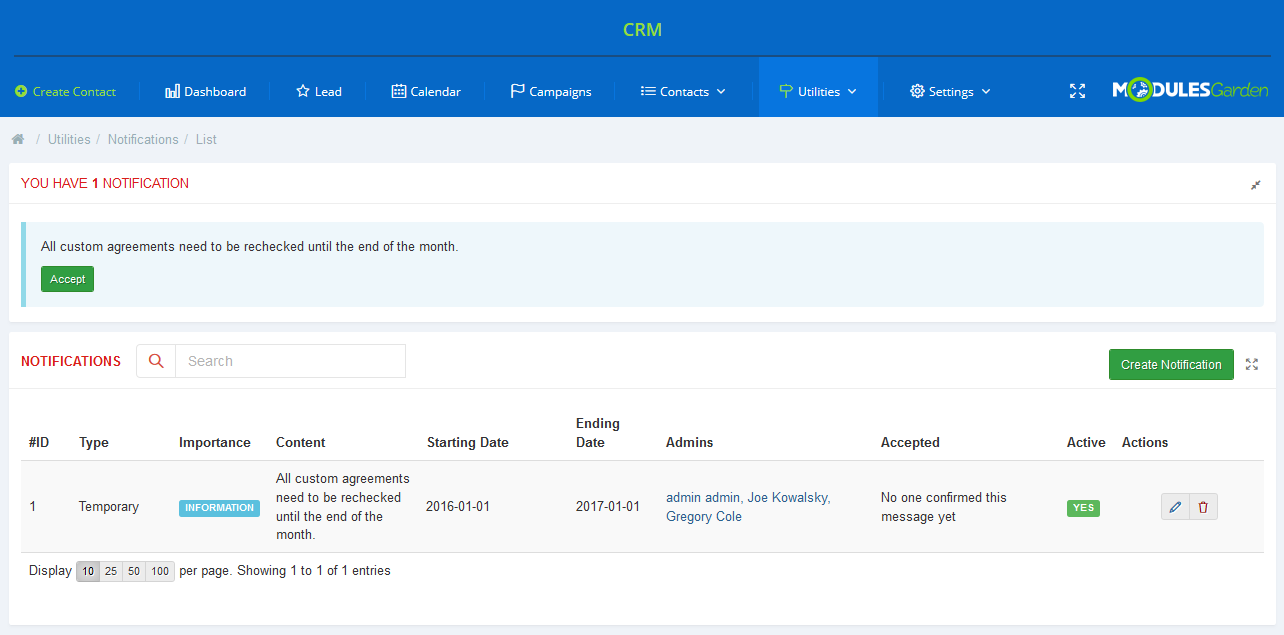
|
| Created notifications are visible for selected in the configuration admins on any page of their CRM system. 'Accept' your notifications if it is required. Such info boxes like on the screen below will be visible until the specified in the configuration 'Ending Date', |
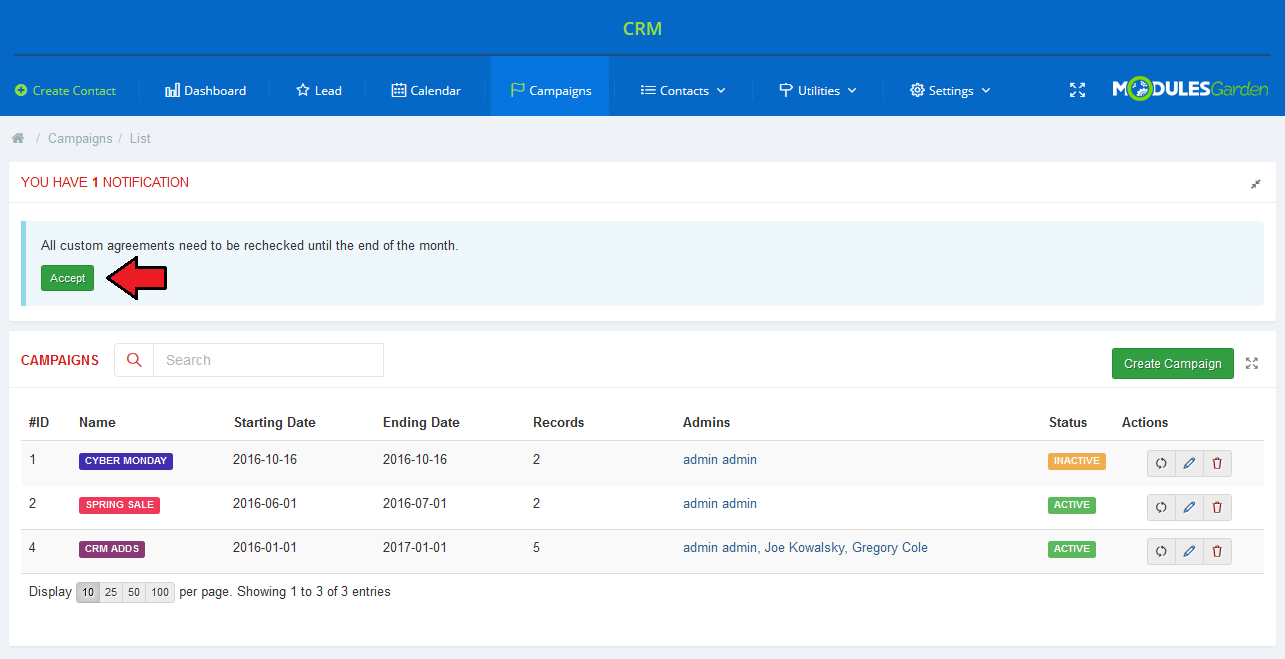
|
Mass Messages
| Configure mass messages templates that can be used in your campaigns! Press 'Create Mass Message' and fill out the template form. |

|
|
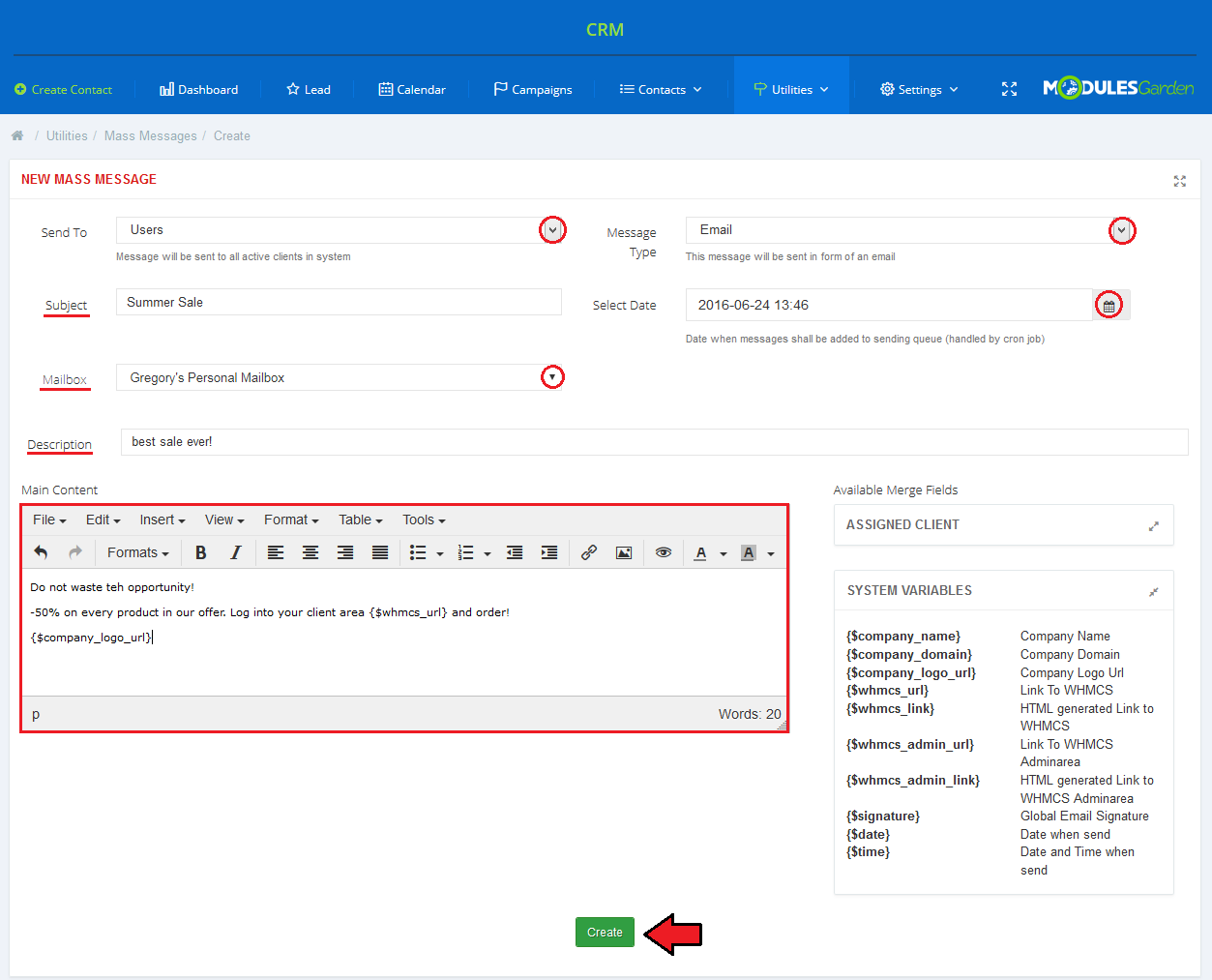
|
| Once added, mass message template will be visible on the list. You will find there short info on each template. Use action buttons to edit or remove a template. |
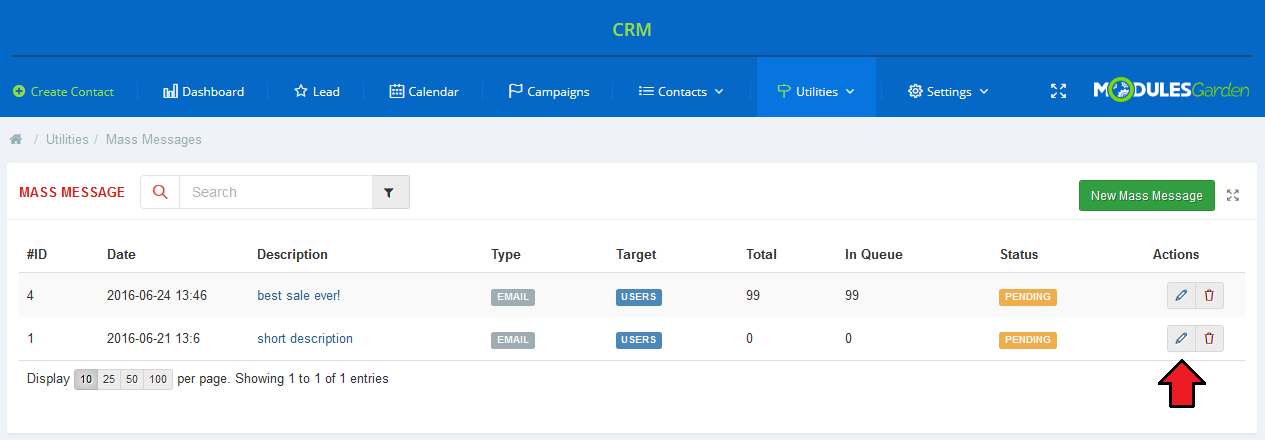
|
Archive
| List of unused leads/potentials. Use action buttons to edit entries and convert them back to lead or potential from the archive. |
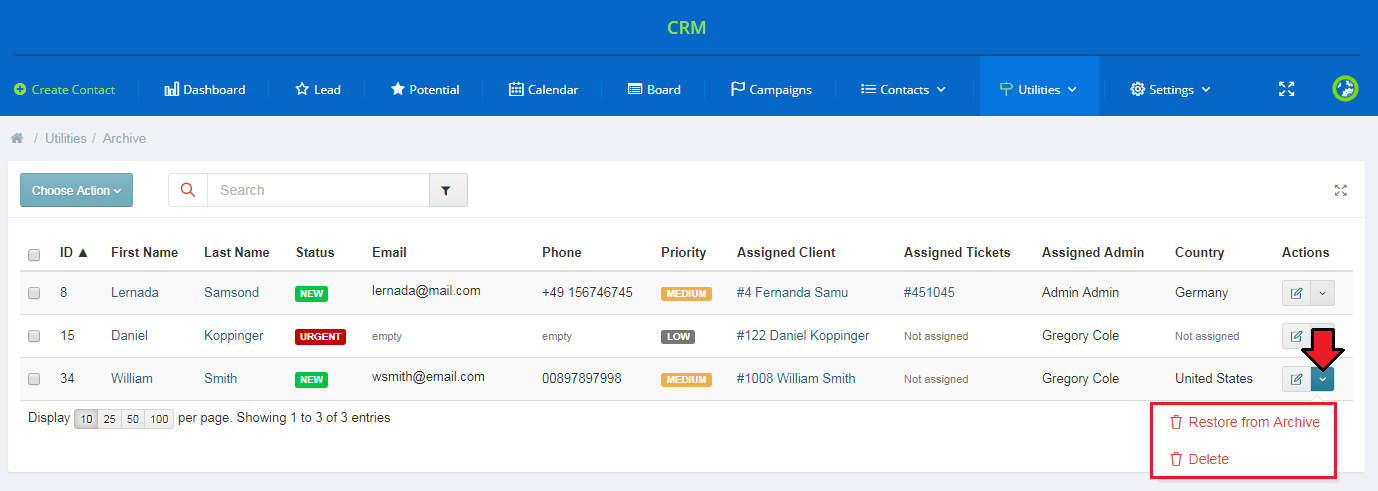
|
Migration
| If you have already used any of the previous versions of CRM, the very first thing that you need to do with your module before moving to any further steps is migrating data from old CRM to CRM V2.0.0. To do so, move to 'Addons' → 'CRM' → 'Settings' → 'Migrator'. You need to note that not all data can be migrated due to some incompatibility between systems.
|
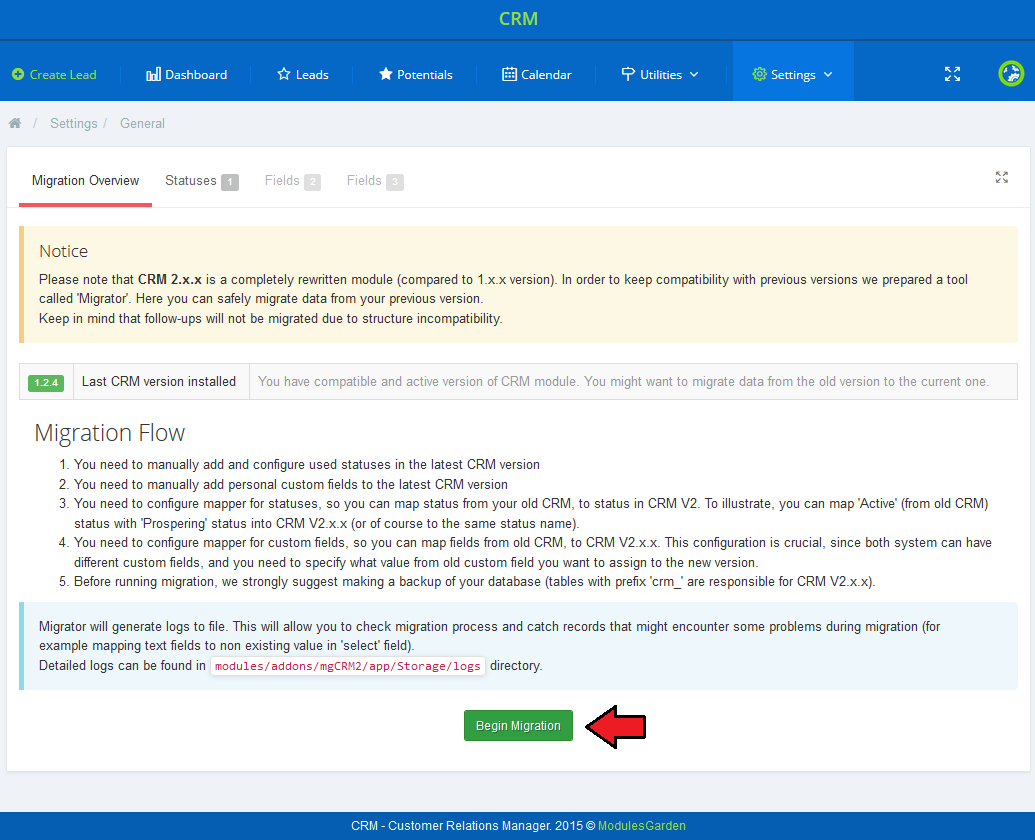
|
| Prepare mapping of statuses used in CRM V 1.2.4 that you wish to map to CRM V2.0.0. Confirm that you have done the mapping correctly and then move to custom fields mapping configuration. |
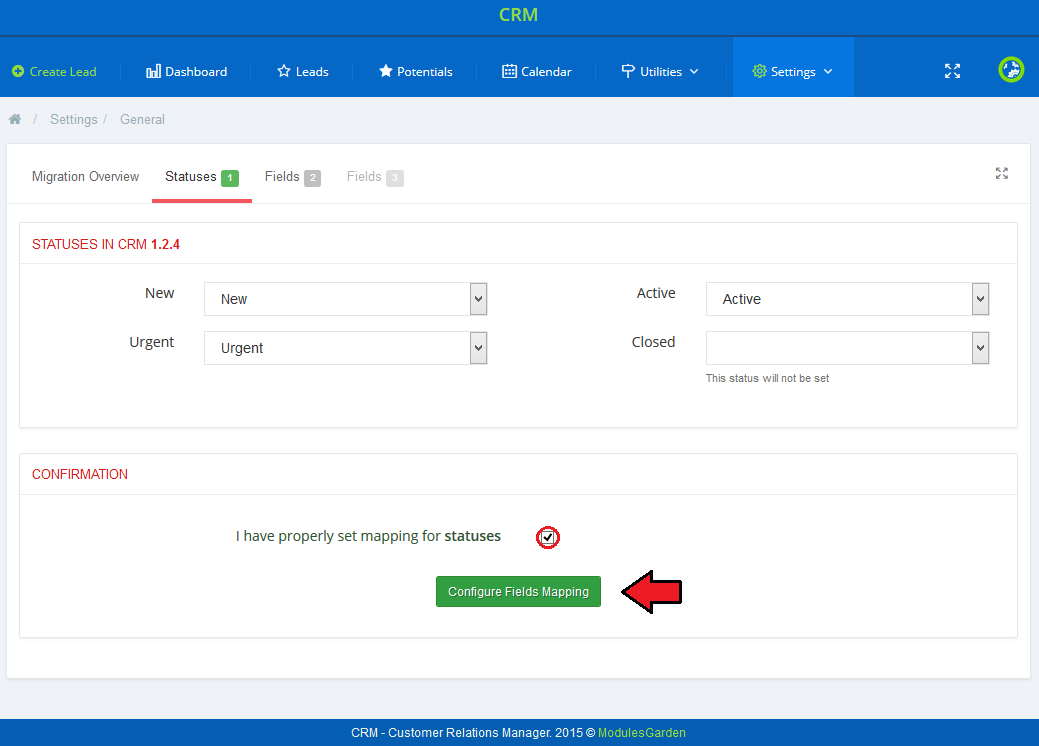
|
| Map fields used in CRM V 1.2.4, confirm proper configuration and move to the last step. |
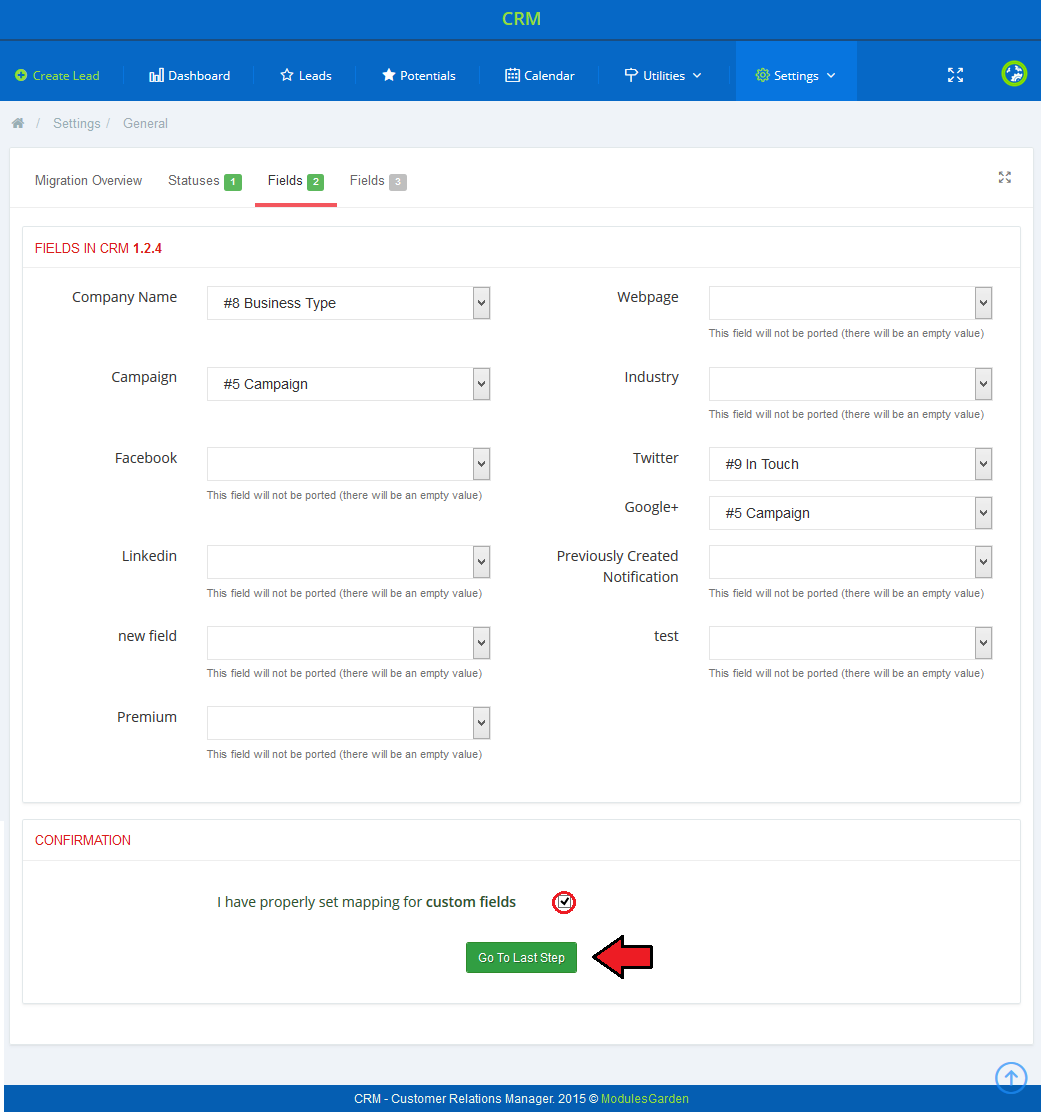
|
| Read carefully all the information about migration consequences, if you agree with them, start the migration. |
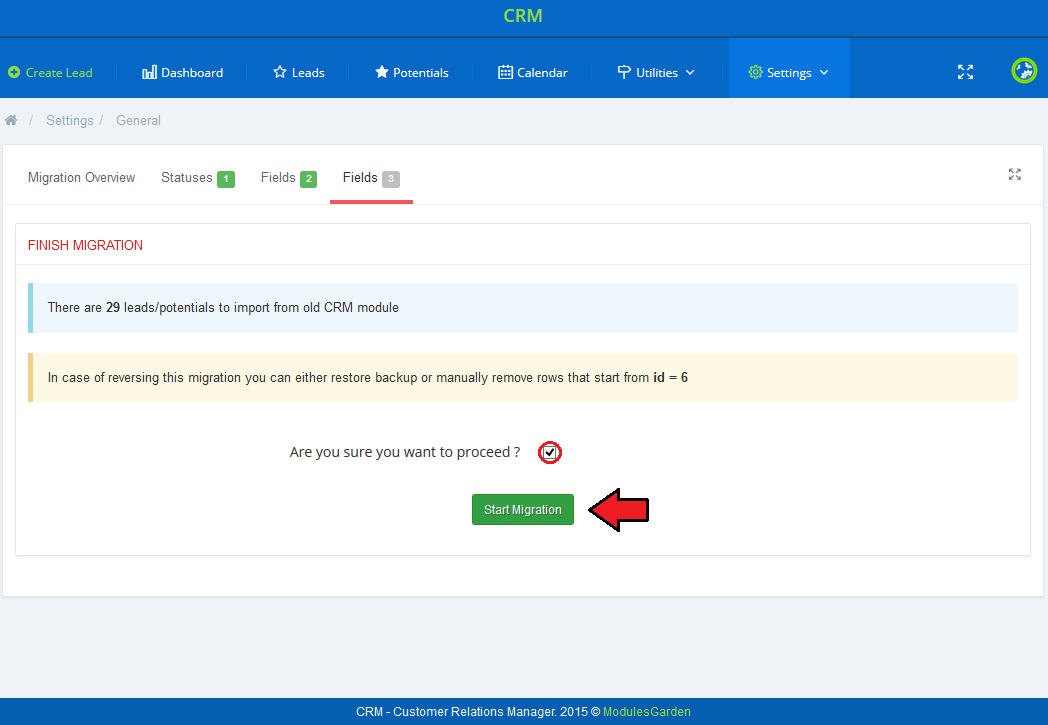
|
| Congratulations! You have successfully migrated your database from old CRM to the latest version! Now, you can enjoy a much improved management of your contacts with potential clients. |
Tickets
| Our module offers additional integration in your WHMCS support tickets system. As you can see on the screen below, your support operators can convert tickets directly into Contact Lead. |
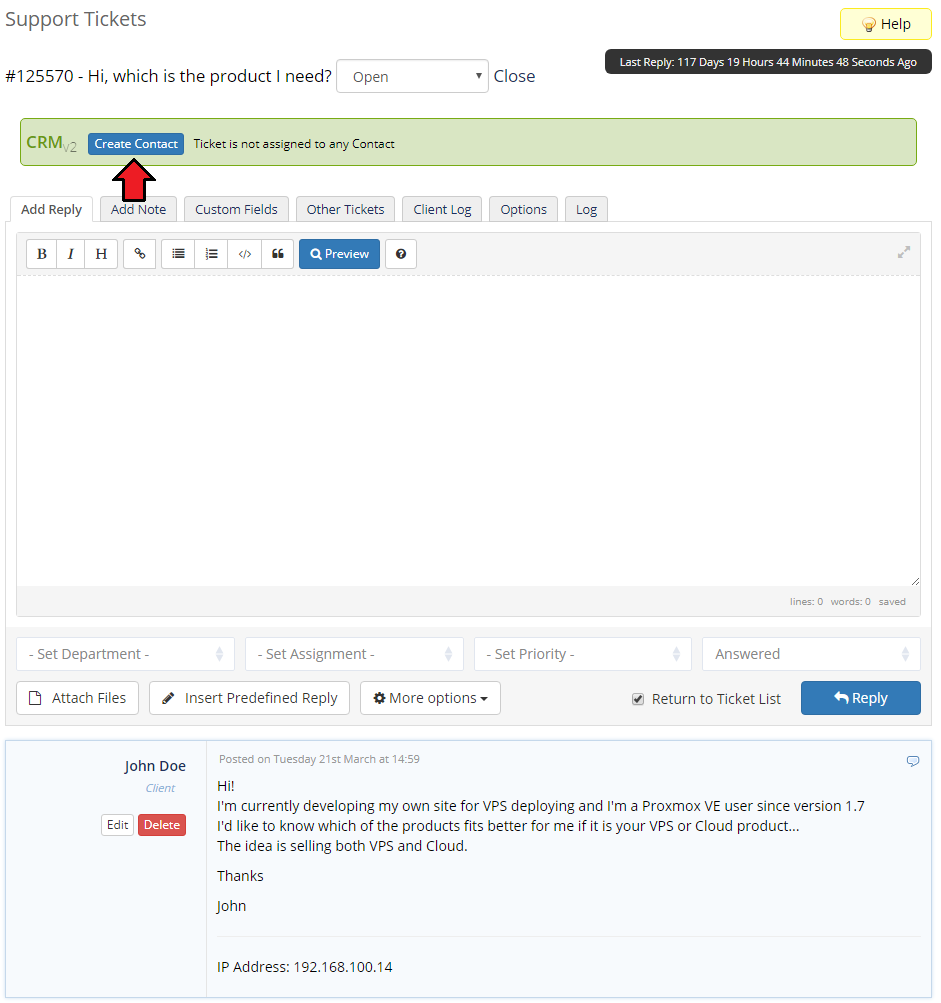
|
| Any ticket of such client will be displayed with contact name, status and assigned staff member. Additionally, after pressing 'Details' extended information about the contact will be displayed in a popup. |
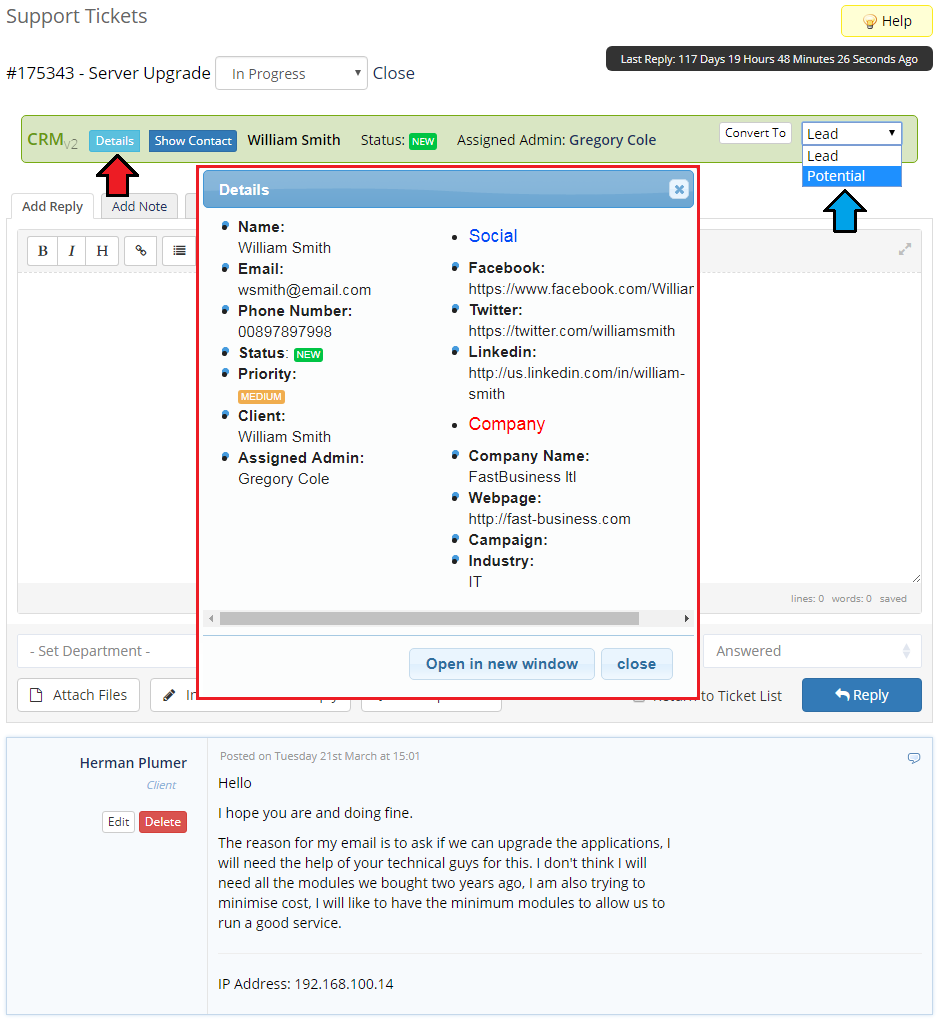
|
| Your staff will be also able to quickly move to the contact profile in CRM For WHMCS by pressing 'Show Contact' . |
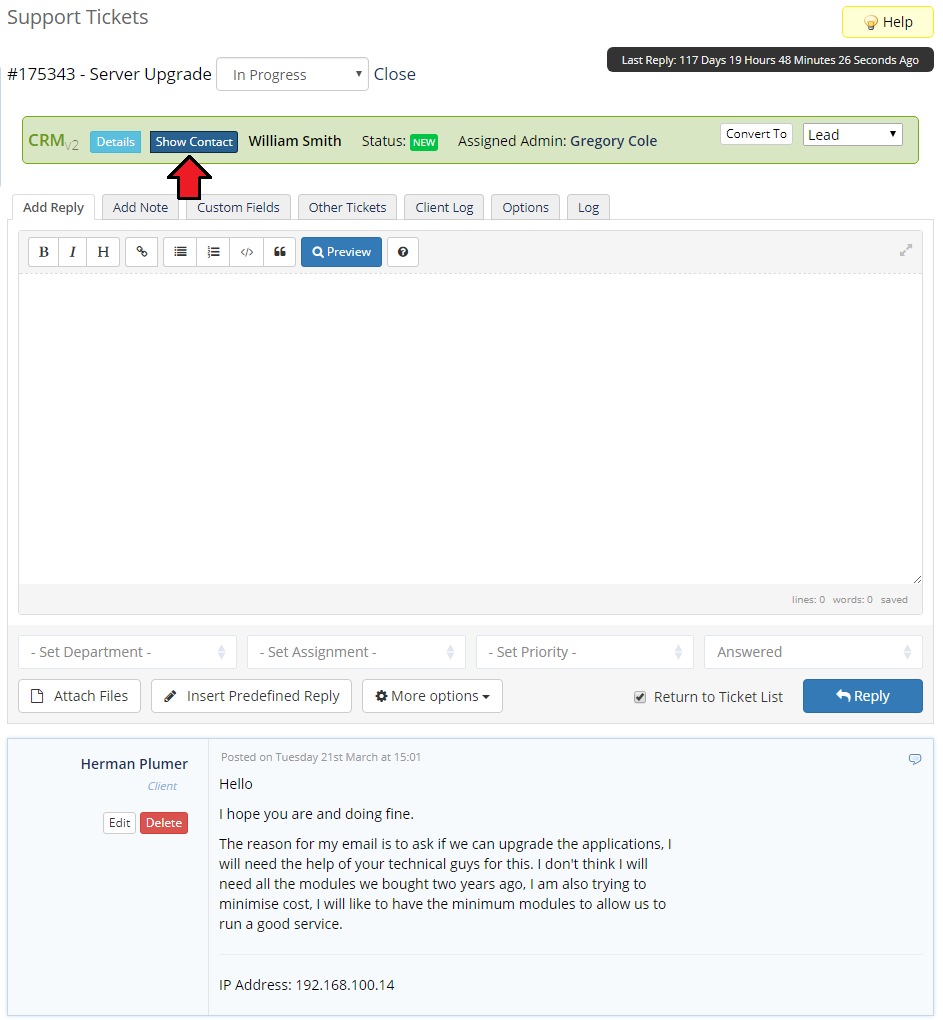
|
Asterisk VoIP Center For WHMCS Integration
| Integration with Asterisk VoIP Center For WHMCS extends your possibilities with ability to originate calls to your CRM contacts. As soon as you install the module, you can originate a call by pressing 'Call Out' button. |
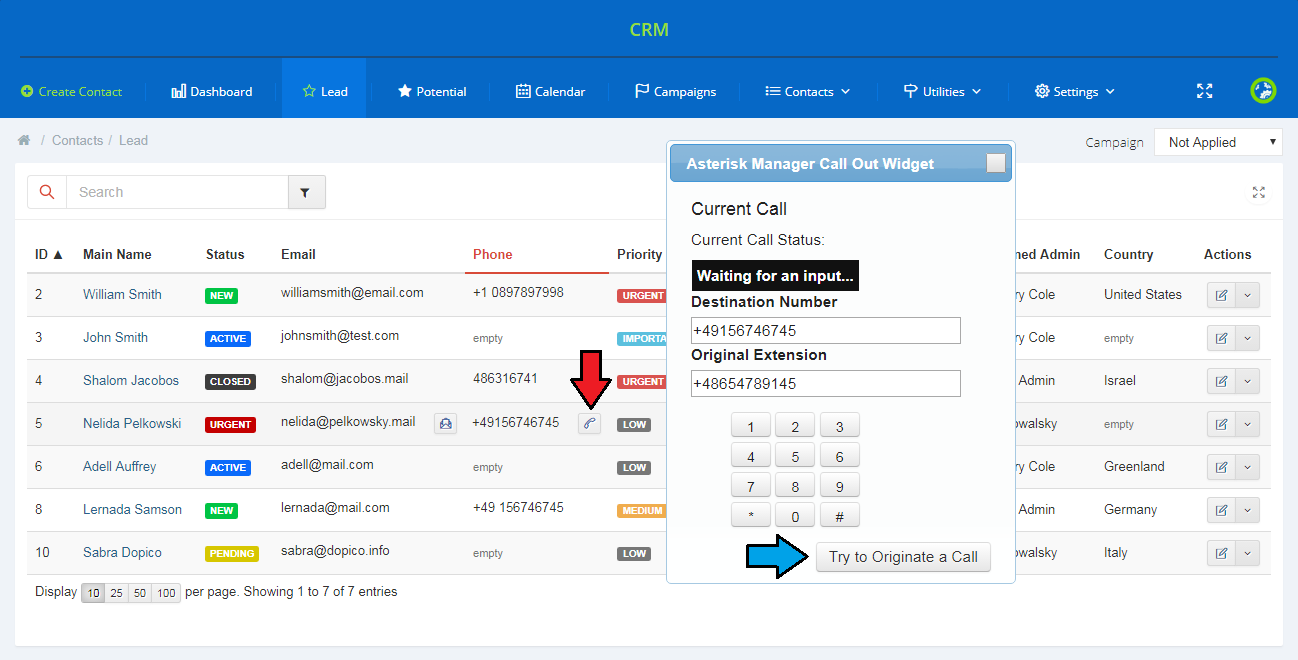
|
Workflow
| In order to familiarize you with the module even more, we are presenting here an example workflow. In the beginning, let's point the differences between privileges groups:
On the following screen you can see the settings for each of the groups.
|

|
| Storytelling Let's say we have admin X with full privileges and admin Y who has sales person privileges. |
Additional Information
| A full list of supported variables for reminders and email templates: |
|
Reminders:
|
|
Email Templates:
|
Tips
| 1. If you want to see a specific part of your CRM, a single widget only, use full screen mode for widgets. You will find it in the top right corner of each widget. |
Common Problems
| 1. When you have problems with connection, check whether your SELinux or firewall does not block ports. |
| 2. In case you have problems with your CRM, for example empty tables, no follow-ups in calender or you cannot add new status, group, follow-up, then please make sure that your .htaccess or vhost do not block the module in any way. Underneath there is an exemplary input of a .htaccess file, which will unblock the connections and methods: RewriteCond %{REQUEST_FILENAME} !-f
RewriteCond %{REQUEST_FILENAME} !-d
RewriteRule ^(.*)crm.php(.*)$ /admin/crm.php [QSA, L]
<Limit PUT DELETE OPTIONS>
Order allow,deny
Allow from all
</Limit>
Please note that admin file may have a custom name, remember to adjust the file input to your naming. |
|
3. If you get an error that 'Directory <your_whmcs>/modules/addons/mgCRM2/app/Storage is NOT Writable. Unbable to continue.' please make sure that this folder has writeable permissions set. |